




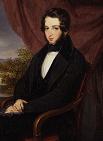












TLW's Banking Historyscope |
By T.L. Winslow (TLW), the Historyscoper™ |
© Copyright by T.L. Winslow. All Rights Reserved. |
Original Pub. Date: May 11, 2013. Last Update: July 4, 2019. |









Westerners are not only known as history ignoramuses, but double dumbass history ignoramuses when it comes to banks and banking history. Since I'm the one-and-only Historyscoper (tm), let me quickly bring you up to speed before you dive into my Master Historyscope.
In modern times, most people associate banking with internat. Jews. The reason there are internat. Jews is the Jewish Diaspora almost 2K years ago that forced them to become the Wandering Jews without a state of their own until the 1948 proclamation of the Jewish State of Israel, which happened after two horrific world wars, which in retrospect seem to many to have been all about them, along with the prospect of a third world war, with big brain prognosticators spread along a spectrum going from total world control by the Jewish-led One World Govt. (OWG) Illuminati/New Age Conspiracy, to total annihilation of the Jews in a last ditch power dive that takes the world with it and returns it to a New Dark Ages, to the Second Coming of Christ where the Jews finally see the light and convert just as they are hopelessly outnumbered and surrounded by madass Muslims, inaugurating the Millennial Kingdom of Heaven where your money is no good anymore.
If you're as bored as the students in the film "Ferris Bueller's Day Off" hearing about the Harley-Smoot Tariff, bug off now. To the rest, let's get started, starting with the Land of the Dinosaurs. Just kidding. We only have to go back about 2.5K years.
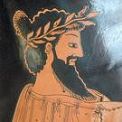
In 560 B.C.E. Alyatttes dies, and the enormous tumulus Tomb of Alyattes is erected for him in Sardis; his son Croesus (d. -546) becomes king of Lydia, becoming known for his great wealth, going on to subjugate the Greek Ionian colonies and Bithynia, controlling all of Asia Minor W of the Halys River except Cilicia and Lycia, bringing Lydia to its apex; pure gold coins are minted by him for the first time; his gold refining workshop at his capital of Sardis is uncovered in 1964-8 by a team of Harvard and Cornell U. archaeologists led by Russian-born George Maxim Anossov Hanfmann (1911-86) and Albert Henry Detweiler (1906-70).

Also in 560 B.C.E. after starting out as a slave in Samos, then living at the court of Croesus, meeting Solon, dining with the Seven Sages of Greece and Periander in Corinth, and visiting Athens and pissing off Peisistratus, Greek fable king (hunchbacked dwarf) Aesop (-620 to -560) dies in Delphi (executed for embezzlement?) after leaving the soundbyte "God helps those who help themselves", leaving Aesop's Fables (Aesopica), which are first pub. in Greek about -300 by Demetrius Phalerus, and in Latin about -25 by Phaedrus; incl. The Fox and the Grapes, The Tortoise and the Hare, The North Wind and the Sun, and The Boy Who Cried Wolf.

Also about 560 B.C.E. the earliest Hebrew scrolls of the Bible (Gr. "little library") are written, backdated as far as 1,500 B.C.E.?; "40 independent authors, representing 20 occupations, living in 10 countries during a 1,500-year span, working in three languages, with a cast of 2,930 characters in 1,551 places... This massive volume covers every conceivable subject, expressed in all literary forms - prose, poetry, romance, mystery, biography, science and history" (Terry Hall); the Jewish identity is formed around this little library of books - the hardest years, the darkest years, the wildest years, the hottest years?



Sorry, historyscopers, but it all began in the murky years 30-40 C.E., where --it happens in the Roman province of Judea; nobody knows for sure, and it depends on whom you want to believe; a riddle wrapped in a mystery inside an enigma, the greatest coverup in history; the Great Track of Time enters not only a Dark Alley but a Black Hole, becoming an endless source of powerful fiction claiming to be fact, with the dividing line very hazy until centuries later, oh my gosh, I smell an Emmy. While visiting the Jewish Temple in Jerusalem, Jesus made a point of attacking the moneychangers (Mt. 21:12, Mk. 11:15, John 2:14-15), I wonder why?



In 132 C.E. after a thousand years living in their homeland of Israel, many of them under oppression, and now reduced to the Roman province of Judea, the Bar Kokhba (Kochba) (Cocheba) Uprising under Simon (Shimon) Bar Kokhba (Kochba) (Cocheba) (-135) (Heb. "Son of a Star") (real name Bar/Ben Kosiba or Kozebah) is launched against Roman emperor (117-38) Hadrian (Publius Aelius Traianus Hadrianus) (75-138). In 135 the Romans under troubleshooter gen. Sextus Julius Severus (gov. of Britain in 131-3) put down the pesky Bar Kokhba Revolt (begun 132); the Jews' butts are kicked bigtime, and 580K are killed (half the pop.), 985 towns and villages are destroyed, and Jerusalem is plowed with oxen; Hadrian issues an edict ordering the Jews expelled from Israel (only permitted to enter Jerusalem once a year), completing the Jewish Diaspora (Heb. "Tefutzah" = scattered), the dispersion of the pesky oddball square-peg-in-a-round-hole Jews throughout the Roman Empire; Judea is renamed Syria-Palestina (coined by Herodotus), and the way is now clear for the spreading of the name Jah-Zeus (Jehovah-Zeus) (Jesus) by the empire-wide Catholic (universal, as in get all the pagans to join the Church no matter how much the original faith has to be diluted) conspiracy, when his real name was Yeshua, and being too Jewish it's now un-PC; the whole Jesus fable was invented at this point to get even with the Romans, with the destruction of the Jewish Temple in 70 C.E. used as a blind screen so that later historyscopers would scope in vain 60 years too early?; Rabbi Akiva ben Joseph (50-135) is executed by the Romans after teaching the Torah in public after the revolt; the Ebionites (Heb. "ebyon" = poor) sect of Jewish Christians who deny the divinity of Christ and consider St. Paul an apostate for declaring the supremacy of Christian teaching over the Mosaic Law heads W across the Jordan River into Peraea (modern-day Jordan), isolating themselves from the main body of Christians and adopting a conservative Pharisaic creed that evolves into a combo of Christianity, Gnosticism, and Essenism, and split into groups who believe or reject the Virgin Birth; they die out by the 5th cent.; in 1960-1 Yigael Yadin (1917-84) excavates the Cave of Letters in the desert W of the Dead Sea, discovering a basket at the bottom of a privy containing 19 bronze items, which are housed in the Shrine of the Book near Givat Ram in W Jerusalem, incl. a patera (libation dish) with an engraving of the Greek-Roman goddess Thetis, mother of Achilles, causing speculation as to whether these are sacred objects from the Temple of Jehovah (destroyed 70); a purse containing the 35 Papers of Babatha, a woman who owned a date orchard in En-Geddi on the W shore of the Dead Sea is found, incl. dated orders by Bar Kokhba, showing him as a meany who threatened and ordered the arrest of fellow Jews; comparison of C-14 dates causes Magen Broshi to propose Broshi's Law that the oldest extreme of the C-14 date range is the most accurate; bones of starved women and children are later found, along with remnants of a Roman army outpost on top of the mountain; Cochin (Malabar) in SW India becomes a haven for Jews until modern times; the Diaspora didn't really happen, and modern Muslim Palestinians are their descendants?



Tribus Unum (From Three, One) starts off with a shoe-banging Khrushchev type at the Catholic U.N. General Assembly? In 325 C.E. after trying in vain to get the warring parties to rise above their bitter Athanasius-Arius Controversy over the pre-existence of Christ and the Trinity (ultimately a theological dispute over homoousion vs. heterousion) (a purely Greek thang, which the Latins yawn off?) (an attempt to define levels in the godhead, a partial return to paganism?) (a mainly Egyptian thang, which softens Egypt up for Islam?) by citing the example of the wise Greek philosophers in a Letter to the Catholic Hotheads, Roman Emperor Constantine I, with the official title of pontifex maximus (maximum bridge-builder for the people to God and therefore equal to the apostles, giving him the right) convokes the first ecumenical (universal) (authority second only to Scripture) Nicene Council (Council of Nicaea) in Nicaea (modern-day Iznik) in Bithynia (NW Asia across the Bosporus Straits from his under-construction city of New Rome AKA Constantinople), with the #1 goal of establishing the authority of bishops (as long as they are on the govt. dole and call the emperor boss?), presided over by his favorite (pro-Trinity) bishop Osius of Cordova in Spain, with the Trinity side championed by archdeacon Athanasius (296-373) of Alexandria, and the anti-Trinity side by way older and higher-ranking presbyter Arius (250-336) of Alexandria, and Eusebius of Nicomedia (-341); James of Nisibis and a bishop from Persia attend; only about one-third (318) of the episcopoi (bishops) in the Roman Empire show up, with the attendants and servants beefing up the assembly to 1.5K-2K, which is conducted in Greek and presided over by the emperor, complete with his Roman bodyguard (although he is not a baptized Christian yet); the Church only sends seven official delegates, incl. two presbyters representing the bishop of Rome (pope); the debate goes on for two mo., with Arius uttering the immortal soundbyte "The Son of God was a creature, made from nothing; there was a time when he had no existence; he was capable of his own free will of right and wrong; were he in the truest sense a son, he must have come after the Father, therefore the time obviously was when he was not, and hence he was a finite being", causing many to stick their fingers in their ears and run out, while St. Nicholas of Myra (270-346) hits him in the kisser; Eustathius the Great of Antioch (270-360) gives a great anti-Arian speech; finally Osius gets big-fish-in-a-small-pond layman (still really pagan and faking it?) Constantine in a back room and talks him into backing the T-side, and Der Fuhrer publicly announces that the bishops are free to vote any way their conscience dictates, only face deposition and exile to the butthole of the empire if they vote Arian; no surprise, Arius and his "Ariomanites" (Arians) are condemned by a 316-2 vote, which incl. 15 flip-flopping Arians, and 100+ Semi-Arians (who believe in a "similar" substance, homoiousion, and slide by for the time being under the don't-ask-don't tell policy?); there is actually no official vote, only a document called the Nicene Creed, the first official test of Christian orthodoxy, which makes the Trinity (Consubstantialism) (Homoousion) an official article of faith for good Roman Catholics, and which all bishops must sign or else pack their toothbrush and lose their official govt. position and income and face exile; as there is no Holy Inquisition, Arians aren't burned at the stake but allowed to run loose making converts, incl. Constantine's son and future emperor Constantius II, further fragmenting into 18 different flavors; for not signing the Nicene Creed, Arius and Eusebius of Nicomedia are exiled to a remote province of Illyricum (Illyria), and labeled as Porphyrians, their writings burned, and a death penalty proclaimed for possessing them; meanwhile Constantine's favorite sister secretly supports the Arians and works on his mind, eventually turning him into an Arian; after the council ends, Constantine issues a Letter to the Churches, declaring that all churches are to observe Easter as well as the sabbath on his pet pagan Sunday; the Quartodecimans (14th Day Christians) (observing Easter on the Jewish Passover of Nisan 14, citing Leviticus 23:5) are declared heretical, and their numbers begin to decline; the Council pub. the soundbyte: "For it is unbecoming beyond measure that on this holiest of festivals we should follow the customs of the Jews. Henceforth let us have nothing in common with this odious people... We ought not, therefore, to have anything in common with the Jews... We desire our dearest brethren to separate ourselves from the detestable company of the Jews. How, then, could we follow these Jews, who are almost certainly blinded?"; Canon 17 of the council forbids the clergy from engaging in usury, defined as charging interest higher than 1% per mo.; later the Athanasian Creed, AKA Quicunque vult ("Whoever wishes to be saved") is created; the Nicene Council causes the Paulicians to flee to Armenia in the Taurus Mts., where they practice beliefs resembling primitive 1st cent. Jewish Christianity, rejecting many Catholic dogmas incl. worship of the cross, the Virgin Mary, the Mass, and confession (the first Protestants?); the pagan majority reacts by staging a pagan revival, with the aristocracy going back to the old prude morality of the Roman Repub., and becoming more monotheistic and mystical, meaning that there is going to be one hell of a civil war to see who takes it all?
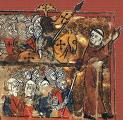
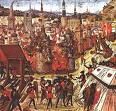
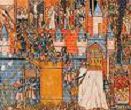

In 1095 the Fatimids of Egypt under emir (sultan) Aphdal took advantage of the quarrels among the Seljuks and took Palestine, incl. Jerusalem and Tyre; Peter the Hermit (Peter of Amiens) (1050-1115), a priest of Amiens in Picardy (a former soldier under the counts of Boulogne, who took holy orders after his wife got old and ugly) visited the Holy Sepulchre in Jerusalem, got pissed at the "sufferings of the natives and pilgrims of Palestine", and went to the Patriarch of Constantinople lobbying for the Byzantine emperor to take it back, but was stonewalled, causing him to land in Bari and meet with Pope (since 1088) Urban II (Otto de Lagery) (1042-99), who shined to the idea, telling him to go out and preach the cause, which he does with gusto in Italy and France; "His diet was abstemious, his prayers long and fervent, and the alms which he received with one hand, he distributed with the other: his head was bare, his feet naked, his meagre body was wrapped in a coarse garment; he bore and displayed a weighty crucifix; and the ass on which he rode was sanctified, in the public eye, by the service of the man of God... every breast glowed with indignation when he challenged the warriors of the age to defend their brethren, and rescue their Saviour... The most perfect orator of Athens might have envied the success of his eloquence... and Christendom expected with impatience the counsels and decrees of the supreme pontiff" - Gibbon, Ch. 58; the whole story is phony baloney, made up by later writers as a coverup?; meanwhile, after receiving a letter from Byzantine Emperor Alexius seeking help against the Seljuks, Urban II hastily summoned a church council to discuss the problem (really the opportunity to unite the two churches under himself); the 200-bishop, 4K-clergy, 30K-laity Council of Placentia heard Byzantine ambassadors pleading their Western European Christian brethren to come save Constantinople from the Turks, to take the battle to Muslim Asia before the Muslim Turks take the battle to Europe (later used by U.S. Pres. George Dubya Bush?), revealing the pope's true reason for the Crusade; like Bush, he wanted Congress to approve it first, so he called the 8-day Council of Clermont in Auvergne, France (his native country), which he attended on Nov. 27 with 13 archbishops, 225 bishops, and 400 priests, while thousands of adoring laity (plus lords and knights) attend; it proclaimed the Truce of God (a suspension of hostilities four days of each week), placed women, priests, husbandmen and merchants under the protection of the church from the current private wars, and the nine Christian Crusades to Jerusalem began with the First Crusade when on Nov. 27 Pope Urban II gave a Killer Sermon, calling for an end to private wars among Christians and an all-out effort to sweep the Muslim infidels back and restore the site of the Holy Sepulchre into Christian hands, sweetened by a plenary (paid in full for all sins) indulgence for enlistment, telling them not to do it for vengeance but for contrition or penance; (you had to be there, but) as the crowd shouts "God wills it, God wills it!" (Deus vult, Deus vult!) (Deus lo volt) (Deix el volt), the pope exclaims, "And let this memorable word, the inspiration surely of the Holy Spirit, be forever adopted as your cry of battle, to animate the devotion and courage of the champions of Christ. His cross is the symbol of your salvation; wear it, a red, a bloody cross, as an external mark, on your breasts or shoulders, as a pledge of your sacred and irrevocable engagement"; after great numbers of clergy and laity get red and put the bloody cross on, and asked popey to lead them into battle, he, ahem, begged that his official duties precluded him from taking time from his busy schedule, and appointed Bishop Adhemar of Le Puy (-1098) (the first bishop he ever elevated) as his legate to the Crusades in Dec., and Count Raymond IV of Toulouse (1038-1105) as the military cmdr., with instructions to depart for the Holy Land on Aug. 15 of next year (Festival of the Assumption); meanwhile Urban II stays far from the action, travelling around in the rear giving more speeches to raise more suckers, er, soldiers and support; not to be left out, Guibert of Nagent (1064-1125) informs the Crusaders that Jerusalem must be seized as a necessary prelude to its eventual capture by Antichrist, followed by the Second Coming of Christ, with the soundbyte "The End of the World is already near" - he meant 1099, the next available Millennium Fever year?
In 1096 European Jewish merchants, finding it unsafe to do business because of the First Crusade resort to moneylending in a big way for the first time to finance Muslim butt-kicking - and it becomes a way of life for ever more?
By 1096 the Holy Roman Empire stretched from Italy to Jutland, but why not add the Holy Land, eh? In May 1099 the ragtag Crusaders, 40K strong, incl. 5K cavalry left Antioch to Laodicea, down the seashore through Tripoli, Tyre, Sidon, Acre, Ashkelon, and Caesarea to the brass ring city of Big J, Jerusalem. On June 7 after the Egyptian Fatimids under Caliph Mostali offered safe passage to the Holy Sepulchre along with expensive gifts, all in vain, and the Crusaders waited 10 mo. after the defeat of Kerboga "to enjoy the luxury of Syria" (Gibbon), 13K Crusaders began the Siege of Jerusalem (pop. 200K); the 40K Egyptian defenders under Aladin (Iftikhar) defeated the early assaults while awaiting reinforcements, which were too late, allowing the Crusaders to conquer the city on July 15 after (you guessed it) 40 days; on July 15 First Crusade leader Godfrey (Godfroi) de Bouillon (1058-1100), duke of Lower Lorraine, whose camp was pitched on Mount Calvary entered Jerusalem, and his Crusaders merrily began a 3-day massacre of the pop., killing 70K for Christ (incl. driving quaking Jews to their synagogue then burning them alive), while the flag of the Christian Cross flew over the city; "If you want to know what was done to the enemies found in the city, know this, that in the portico of Solomon and in his Temple, our men rode in the blood of the Saracens up to the knees of their horses" - Godfrey de Bouillon and Raymond Daimbert, Letter to Pope Urban II from Jerusalem; "They went together through the streets with their swords and spears in hand. All that they met they slew and smote right down, men, women, and children, sparing none... They slew so many in the streets that there were heaps of dead bodies, and one might not go nor pass but upon them that so lay dead... There was so much blood shed that the channels and gutters ran all with blood, and all the streets of the town were covered with dead men." (William of Tyre, 12th cent.); the Crusaders took the crescent off the top of the Dome of the Rock and replaced it with a cross, then constructed a Christian altar, only to see the Muslims take it back in 1187 and reverse the process.






About 1099 the Priory of Sion (scion of Zion?), a secret brotherhood to protect some kind of terrific secret about Jesus Christ being the secret husband of redheaded Mary Magdalene and leaving a sacred bloodline in S France was allegedly founded in Rennes-le-Chateau, France; a hoax spread by French draftsman Pierre Athanase Marie Plantard (1920-2000) in France in the 1950s, and fueled by English "Dr. Who" writer Henry Lincoln (Soskin) (1930-), who finds out that Rennes-le-Chateau master (1885-1917) Friar Francois Berenger Sauniere (1852-1917) engaged in big spending, deducing that it came from money obtained from secret documents he sold, not knowing about a 1910 conviction for illegal trafficking in Masses?; in 1982 Lincoln, Michael Baigent (1948-) of New Zealand and Am.-born English writer Richard Leigh (1943-2007) pub. The Holy Blood and the Holy Grail, after which in 2003 Am. novelist Dan Brown (1964-) pub. The Da Vinci Code, and they all began dancing with the stars.
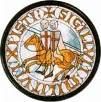
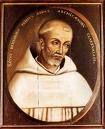
In 1118 after 300+ pilgrims were ambushed by marauding Saracens between the port city of Jaffa and Jerusalem, and other bands appeared outside the walls of Jerusalem, presto-digito heah cum de judge, nine pious Christian knights from N France led by Hugh (Hugues) de Payens (Pajens) (Payns) (1070-1136) and Godefroi (Geoffrey) de St. Omer (huge pay-ins and gobs of free saintly lucre?) suddenly arrived at Latin king of Jerusalem Baldwin II's palace and offered their services, claiming to have taken the vows of poverty, chastity, and obedience, plus a 4th to protect the pilgrims on their journeys between the holy city and the coast; Baldwin bites, and the religious-military order of the Order of the Knights Templar (Order of the Poor Knights of Christ and the Temple of Solomon) was founded to protect pilgrim routes in the Holy Land by Baldwin II, who granted them a HQ in Jerusalem in the E part of his palace, in the Al-Aqsa Mosque, which stands on the Temple Mount (site of the Jewish Temple of Solomon), under which the Qumran Copper Scroll (discovered in the 20th cent.) claims huge quantities of gold and valuables are buried to keep it from the Romans, who razed it in 70 C.E.; they were also given attached stables big enough to accommodate 2K horses; their seal is two men seated on the same horse, to signify their vow of sodomy, er, poverty; the secular overlord is the Count of Champagne, with spiritual leadership given by French abbot-monk (St.) Bernard of Clairvaux (1090-1153) (#1 spiritual figure in the West, a pope-maker and preventer of Jewish pogroms), who drew up their rule (sanctioned by the Council of Troyes in 1128), based on the Cistercian Rule, with the vows of poverty, chastity, and obedience, and the rule of the canons regular; the order consists of knights (allowed to wear the white mantle with large red Latin cross on the back), chaplains, and men-at-arms (servants); admission is limited to those of noble blood; org. is by commanderies, under a grandmaster; too bad, these monkish Magnificent Nine spend their first nine years, not protecting pilgrims, but locked up inside their HQ, excavating through solid rock in search of the Holy of Holies of the Jewish Second Temple, giving later conspiracy theorists plenty of dream pillow material about how they dug up some magnificent treasure or great secret they used to blackmail the papacy with, maybe some secret documents, or the Shroud of Christ - or the formula for Viagra?

On Dec. 14, 1124 Pope (since 1119 Calixtus II died, and on Dec. 15 Teobaldo Boccapecci (Boccapeconai) was elected Antipope Celestine II (-1124), but only lasted one day; on Dec. 21 after Cencio II Frangipane and Cardinal Aimerico of Santa Maria Novella forced it, Lamberto Scannabecchi, Cardinal of Ostia (Lamberto of Ostia) (the same cardinal who kissed the emperor at Worms and restored him to communion with the Church) was elected Pope #162 Honorius II (-1130), soon excommunicating Count William of Normandy for marrying a daughter of Count Fulk of Anjou who was too closely related to him. In 1128 after the Templars emerged from nine years locked up inside the Temple Mount of Jerusalem (and still hadn't rescued any pilgrims?), the Synod (Council) of Troyes in France (the city that gives troy weight its name) and Pope Honorius II recognized the Order of the Knights Templar and their austere Cistercian-based rule, and they went go on to gain wealth and power at jet speed, helped by being left in peoples' wills, becoming the bankers of Europe, complete with the first traveler's checks, encrypted deposit notes that pilgrims can carry between Templar stations all the way to the Holy Land, making them an internat. banking org. above all kings and answerable only to the pope, stirring envy and resentment, esp. from kings who owe them money, and giving later conspiracy theorists plenty of material. "A sure sign of a lunatic is that sooner or later, he brings up the Templars" (Umberto Eco).
In 1139 French Cistercian abbot Bernard of Clairvaux (1090-1153) writes the first Rules of the Monastic Knights Templar Order, which by papal bull is declared under the protection of the church of Troyes and under the direct authority of the pope, "a law unto themselves", bypassing all other temporal and spiritual authority, and soon expanding into every Christian country, going into banking, lending money to bankrupt royals at interest, and amassing vast estates - is this because they finally found the secret documents under Herod's Temple in Jerusalem and blackmailed the pope with exposure of the faulty foundation of his male supremacist church?
In 1170 the financial inquiry known as the Inquest of Sheriffs results in strengthening the English exchequer.
In 1171 the Bank of Venice begins allowing exchanges of accounts among clients via bookkeeping operations.
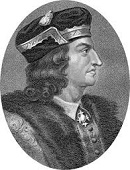
With umpteen-zillion up for grabs, no wonder they're in a rush? In 1182 spurred on by Christian businessmen who resent competition in the practice of usury, French king (1180-1223) Philip II Augustus (1165-1223) expels the Jews from France, and keeps their lands; in 1198 after deciding that he likes the way they pay taxes on their usuruy he changes his mind and lets them return, heavily regulating and taxing their banking activities.
For the first half of the 13th cent. prices are on a rising trend in England; Italians develop banking firms, which compete with the Jews.

In 1244 German Hohenstaufen HRE (1212-50) Frederick II (1194-1250) caps the interest rates that Jewish moneylenders can charge to 173.5%; in England the standard rate is 2 pence per pound per week (43-1/3%), and 15-25% in Italy.
Between 1260 and 1347 80 banking firms open in Florence, enriching Euro vocabularies with banking terms incl. banco, credito, debito, cassa (money box) (cash), conto/disconto, conto corrente, netto, bilanza (balance), and banca rotta (bankruptcy).



On Nov. 28, 1290 as they travel from Clipstone toward Lincoln, Eleanor of Castile (b. 1241), beloved queen consort (since 1254) of English king (1272-1307) Edward I "Longshanks" (1239-1307) dies in the village of Harby in Nottinghamshire (10 mi. from Lincoln), and he is so grief-stricken that he has an "Eleanor Cross" ("of immense height") called chere reine (Fr. "dear queen") erected at each site (Lincoln, Grantham, Stamford, Geddington, Northampton, Stony Stratford, Woburn, Dunstable, St. Albans, Waltham, Westcheap) where her body is set down during the journey back to Westminster Abbey in London, the last one, Eleanor Charing Cross in the hamlet of Charing, Westminster, London later being used as the geographical center of London; needing to blow off steam, on July 18 Edward I issues the Edict of Expulsion, ordering the 16K remaining pesky Jews (who since 1218 had to wear a marking badge) expelled from England by Nov. 1 (9th of Av), abandoning their real estate and loans, and it's bye-bye for over 350 years until Oliver Cromwell lets them return in 1655 (expelled rather than burned, so not to contribute to the recent smog problem?); allowed to take only what they can carry, they pay mucho dinero for their passage and are thrown overboard by ship captains, who keep everything, then turn around to pick up the next boatload?; those who reach France are ordered to leave by Lent of 1291; Italian goldsmiths from Lombardy take over the moneylending business in England, and are granted some land in London which later becomes known as Lombard Street, the main banking center.
On Sept. 9, 1298 Genoa defeats Venice in the Naval Battle of Curzola, causing weakened Venice to sign a treaty with the Turks next year; Genoan merchants and bankers begin to get respect.
In 1299 the Farolfi Ledger of Giovanno Farolfi & Co. of Florence becomes the first known double-entry bookkeeping ledger, allowing modern banking and capitalism to bloom in 14th cent. Italy.

In June 1306 French king (1285-1314) Philip IV (1268-1314) gives a secret commission to Bishop William de Nogaret as part of his plans to cash out his bankers, the rich Templars, who are financial partners of the Jews; on July 21-22 Philip IV, wanting to clean France of the garbage (and help pay for his war debts) has all 100K Jews in France arrested with all goods and money confiscated, then expelled if they won't convert to his one true faith, which most don't, so after being given one day's provisions they leave and head for Flanders, Spain, or the Rhenish towns across the Rhone River; Philip IV awards a synagogue to his coachman; meanwhile England whips and expels 100K Jews who defied Edward I's 1290 expulsion order; too bad, the king's collectors go to collect on loans made by the Jews, and are so mean that the people clamor for the Jews to be allowed to return, which they do in 1315 (until 1322) - let the vacation begin?

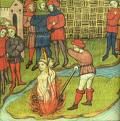
On July 24, 1307 the Knights Templar hold a gen. chapter meeting in Paris; pocket pope Clement V writes to his boss Philip IV on Aug. 24 with a sealed mandate, not to be opened until dawn on Oct. 13 (Fri.), telling of his vision that the Knights Templar are heretics and blasphemers, devil worshipers, homosexuals, sodomites, defilers of Christ and other blimey, and that God had told him to cleanse the Earth by rounding them all up and torturing them until they confess (roasting of the feet is particularly favored?); too bad, at midnight just before the big day dawns, Templar ships under the Admiral of the Fleet leave from La Rochelle, carrying all their big secret documents, portable treasures, and other neat stuff; on Oct. 13 (Fri.) (Oct. 21 Gregorian), AKA Black Friday the 13th, Templar grandmaster (since 1297) Jacques de Molay (1244-1314) is arrested in the Paris Temple by dozens of seneschals, accompanied by Philip IV, who gets pissed-off at not finding their treasure or documents; meanwhile the whole Templar Order throughout France is arrested (15K men), and its assets seized by the crown; the Order is charged with 127 blasphemous crimes; some Templars escape to Argyll, Scotland, where the war with England causes the papal bulls dissolving the order to never be proclaimed, and their allies the Freemasons protect them, admitting them into their lodges under the Accepted Rites of Freemasonry; others flee to Jewish-friendly Spain, Portugal and Poland; de Molay's deputy Geoffroy de Charnay (1251-1314), and a few others barely survive under cruel chief torturer Gaspard Chaix, only to be burned on Mar. 18, 1314 after they refuse to give up the big secrets of where the loot is?; tortures incl. having heavy weights attached to their testicles, being jerked over heavy beams, held in dungeons for months, feet-roasting et al. - you can't take the Fifth with Clement the Fifth? On Aug. 8, 1308 Pope Clement V summons witnesses for the Templar Trials in Poitiers, bringing 72 Templars to testify about worshiping Head 58 AKA Baphomet (Muhammad?) (Sofia after applying the Atbash Cypher?) (the Shroud of Turin or Mandylion?); on Aug. 17 senior officers of the Templars are interviewed by three cardinals in Chinon; on Sept. 13 English common law stops a pair of French inquisitors arriving in England from prosecuting the Templars, causing Pope Clement V to write to Edward II: "We hear that you forbid torture as contrary to the laws of your land. But no state law can override canon law, our law. Therefore I command you at once to submit those men to torture", causing Edward II to flop, holding the first English tribunal of the Inquisition, and becoming the last use of torture in England until Queen Bloody Mary in 1553-8; the tribunal suppresses the Templar Order and seizes its assets for Edward II, making him and Philip IV the two kings who make out the best?; in Oct. 2007 the Vatican announces the release of the trial documents, showing that they were absolved of heresy charges but burned anyway - and all those Vatican bureaucrats kept their silence all that time?
In 1308 the Peruzzi banking firm in Florence pays a 40% dividend.
On Mar. 9, 1309 nouveau riche Philip IV of France orders the papacy moved from the Lateran in Rome to a new papal court in France, but Pope Clement V, allegedly pissed-off at his treatment of the Templars fixes the papal court in Avignon in sunny SE France in the Venaissin, outside of Philip IV's jurisdiction; the Babylonian Captivity of the Church begins (ends 1367); Villandraut Castle is built for the popes in Avignon, and they stay there until 1377, followed by the Avignonese popes of the Western Schism of 1378-1417, causing the Lateran to begin to fall into ruin.
On Mar. 18, 1314 after years of fruitless attempts to torture out the whereabouts of their treasure, 39 more Knights Templar are burned in Paris, incl. grandmaster Jacques de Molay (b. 1244) and his deputy Geoffroi de Charnay (b. 1251), preceptor of Normandy; they are slow-roasted over smokeless charcoal, taking hours to die?; in the flames de Molay (who had been tortured into a confession of heresy and given life in priz earlier that day, only to immediately retract it and ordered burned) protests the innocence of the Templar Order, and calls down Philip IV and Pope Clement V for their injustices, launching the Templar Curse, and sure enough they both croak later this year, popey going first in only 33 days? On Apr. 20, 1314 Pope (since 1305) Clement V (b. 1264) dies, and the papacy remains vacant for more than two years - read your Dante and grab an iced half-latte?

In 1339 self-proclaimed French king Edward III (1312-77) of England invades and ravages N and E France, sacking Dieppe, but is unable to repay a $7M loan to finance the war, and is brought under a petition of bankruptcy, becoming the first Euro nat. ruler to declare bankruptcy - do the math?
In 1343-4 the Venetian Peruzzi and Bardi Family Banks collapse, destroying the Euro economy; the greedy bankers of Venice, not the Black Death are what ultimately causes the great (35%-50%) pop. decrease in Europe from 1340-1440?
The Black Death (the original Darth Vader) rockets through Europe's Internet with breathtaking speed? In Oct. 1347 a Genoese trading fleet arrives in Messina, Sicily carrying the Black Death (Bubonic Plague) (Yersinia pestis bacteria), carried by fleas from rats; it also arrives in Egypt, Syria, and Cyprus; by 1351 it kills 20M-30M in Europe (a third of Europe's pop., and up to 60% in some areas), and 75M worldwide by 1361; world. pop. decreases from 450M to 350M-375M by 1400; Europe takes 150 years to return to 1347 pop. levels; it ravages China, halving its pop. from 123M in 1200 to 65M in this cent.; lucky America is not affected, but not toughened up by it either?; rats didn't really spread it, because it spread too fast from person to person?
In Jan. 1348 the Black Death begins in Marseille and Languedoc, spreading to Avignon in Mar., and Siena, Toulouse, Narbonne, Montpellier, and Carcassone in May; after the cemeteries are filled, bodies are piled high on the Campus Floris near the Church of St. Mary of the Miracles; in June it spreads to Spain, and Bordeaux, Lyon, Burgundy, Normandy, Paris, and SW England in Aug.; Agnolo di Tura the Fat of Siena, Italy writes the soundbyte: "The mortality in Siena began in May. It was a cruel and horrible thing. The victims died almost immediately. They died by the hundreds, both day and night. I buried my five children with my own hands, and so did many others likewise. Nobody weeps no matter what his loss because almost everyone expected death. So many died that all believed it was the end of the world"; it then disappears for the winter, except Ireland, which it decimates; the Great Plague results in horrible Jewish pogroms throughout Europe, incl. Chillon, Basle, Stuggart, Ulm, Speyer, Dresden, Strasbourg, and Mainz, destroying 60 major and 150 minor Jewish communities, causing survivors to head for Poland, which welcomes them as Kasimir III reworks the Polish law codes; in Strasbourg 2K Jews are hanged; in Freiburg ? are burned alive in wooden bldgs.; Basle burns 600 Jews, expels the rest, and destroys their synagogue and cemetery; Alfonso XI of Spain proposes that the Jews give up banking and take up agriculture; meanwhile, Millennium Fever is on full blast, and when terrible earthquakes rock Italy, this combined with the plague convince people that the end of the world is nigh.
On Sept. 26, 1348 Pope Clement VI issues the bull Quamvis Perfidiam, attempting to dispel the rumor that Jews caused the Black Death by poisoning wells, saying that they too are suffering from the plague, but he is ignored.
In summer 1349 the Great Plague reappears in Paris, where it peaks, killing up to 800 a day, and spreads to Picardy, Flanders, and the Low Countries; also in the summer it reappears in London, and spreads to Ireland, killing 25% of the pop. within a year; by the middle of the year half of the pop. of Venice is killed; by the end of the year half of England's pop. is killed, and a truce with France is called; the plague spreads to Norway when an English ship full of corpses floats into Bergen, and reaches Elbing (Elblag), Poland on Aug. 24; the Church and its credibility being challenged head-on, the main solution offered is by the Flagellants, who appear in force all over Europe (especially Germany), torturing themselves publicly, and proclaiming that the Second Coming is 33.5 years away (I been a bad, bad boy, so tan my sinful hide?), while causing trouble for Jews, the rich, the Church, and finally themselves (besides all the wounds), causing Pope Clement VI to pub. a bull condemning them on Oct. 20; "Many persons, and even young children were soon bidding farewell to the world, some with prayers, others with praises on their lips."
In 1350-1 the Great Plague begins clearing, leaving a depopulated Europe where the deck is reshuffled and the entire social order is thrown up for grabs. The intelligentisa begin to smell a rat in the divine pretensions of the Church, and launch the timeless look at the ancient pagan past called the Renaissance via their Greek scholar friends in Constantinople, no longer being satisfied with Arab translations but learning ancient Greek for themselves; meanwhile the working class see the class struggle clearly now, the rain is gone.
In 1393 after knocking off the Alberti family, Maso degli Albizzi (1382-1417) comes to power in Florence as gonfaloniere.
In 1407 Casa di San Giorgio one of the first known public banks is founded in Genoa (until 1805) - how long till the international Jewish bankers get control of everybody's money and take over the world?


On May 4, 1410 Antipope (since 1409) Alexander V (b. 1339) dies (poisoned?), and on May 17 Cardinal Baldassare Cosa of Naples (a brutal libertine and former pirate who obtains the position through force of arms and who is made a priest 1 day before his cornation?) is elected antipope #4 of the Great Schism Antipope John XXIII (1370-1419); his bitchin' backer Giovanni di Bicci de' Medici (1360-1429) hits the jackpot, and in 1415 the Medicis of Florence become bankers to the papacy (until 1476), known as "God's bankers" - the original credit card trap?

On Feb. 20 (28?), 1429 Florentine banking house founder Giovanni de' Medici (b. 1360) dies, and his son Cosimo de' Medici (il Vecchio) (1389-1464) takes control, trying to build on his family's legacy while keeping out of the public eye and out of the way of the Albizzi family that has ruled Florence since 1393.

In Aug. 1458 Florence gonfalonier (head magistrate) Luca Pitti (1398-1472) stages a coup in the name of old fart Cosimo de' Medici, ruling in his name until his 1464 death and getting wealthy, enlarging the Pitti Palace (Palazzo Pitti), ordering the windows to be made as big as the doors of the Medici Palace on the Via Larga, with an internal courtyard big enough to contain the whole palace.
On Jan. 1, 1458 Frederick II the Gentle of Saxony founds an annual trade fair in Leipzig with an imperial privilege; in 1507 HRE Maximilian II makes them into imperial fairs (Reichsmussen), banning any other fairs within a 15-mi. radius, making nearby towns depending on Leipzig; in 1523 the Welser family of Augsburg build shops there, followed by the Fugger (pr. FOO-guh) family, and by the 18th cent. Leipzig becomes "the marketplace of Europe", a center for trade from England to Poland.
In 1463 Monte de Pieta in Orvieto, Italy begins the innovative practice of loaning money to poor people at low interest to undercut Jewish moneylenders.


The reason that Hannibal the Cannibal goes for babes named Clarice? In 1469 Lorenzo the Magnificent de' Medici (1449-92) marries Clarice Orsini (1453-87), daughter of a Roman baron, becoming the first princely marriage of the Medici family and giving them big muscle; a few weeks later his daddy Piero dies, and Lorenzo becomes ruler of Florence, along with his brother Giuliano (d. 1478), turning it into a treasure house of the arts while fighting the rival (#2 but with a more noble lineage?) Pazzi banking family of Tuscany, marginalizing them and causing them to want to take matters into their own hands?
In 1472 the Monte dei Paschi in Siena, Italy begins taking deposits and making loans, becoming the world's oldest bank surviving to modern times.
The original Meet the Fuggers? In 1473 the Fuggers of Augsburg begin business dealings with the Hapsburgs.



The original patsy was a lone knifeman but there is a conspiracy? On Apr. 26, 1478 (Easter Sunday) after the Riorios and Pazzis plot against them, Giuliano de' Medici (b. 1453), brother of Lorenzo the Magnificent and co-ruler of Florence is murdered (stabbed 19x) in the Duomo of Santa Maria del Fiore Cathedral in Florence during Mass by Bernardo Bandini and Francesco de' Pazzi (b. 1444), who also attempts to kill Lorenzo, and wounds him, but stabs himself in the thigh as he has Giuliano on the ground; Medici supporters get violent and exact revenge, and the same day Pazzi is thrown naked with a noose around his neck from a window in the Palazzo Vecchio, along with the archbishop, who locks his teeth in his flesh?; Lorenzo then hears that the pope had been behind the plot, and has sent troops to wipe the Medicis out, and travels alone to Naples and buys the troops off, then returns to Florence where he is hailed as "il Magnifico" ("virtuous spender of one's wealth"?), and adopts the illegitimate son of his dead bro', then consolidates his power and almost exterminates the Pazzi family; Medici man Sandro Botticelli paints the execution scene on the wall of the Bargello prison for 40 florins - see Thomas Harris' 1999 novel "Hannibal", Ch. 17?


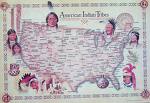
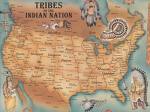


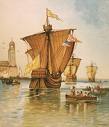

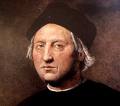


How to lose 93 million friends in ten days, or, When he started out he didn't know where he was going, when he got there he didn't know where he was, and when he got back he didn't know where he'd been, until he looked between his legs? The biggest TV reality show without teleprompter or cue cards? On Aug. 3, 1492 (same day the Jews are expelled from Spain by Ferdinand II and Isabella I) after receiving 17K ducats from Luis de Santangelo and allegedly receiving a vision from the Holy Spirit to bear Christ to the West Indies (or a vision from the Devil to carry his Catholic Church there?), writing "I could feel his hand upon me to sail to the Indies... There was no question that the inspiration was from the Holy Spirit", 41-y.-o. Christopher (Gr. "Christ-bearer") Columbus (Lat. "dove") (1451-1506) (who is really working for the Illuminati, since his real name is Cristobal, i.e. "anointed of Baal or Satan", plus Colombo (It.) = Colom (Catalan) = Colon (Sp.) = anus?, and Lat. "paloma" = dove = penis?), and who has never been farther E than the Aegean Sea begins his First Voyage for Asia by going W instead of E, setting sail from Paloma, er, Palos, Spain for the island of Gomera in the Canary Islands to pick up wine and water, getting into a romance with gov. Beatriz de Bobadilla y Ossorio (1462-1501) and staying for a mo. (returning in 1493 and 1498, when she marries somebody else), taking sugar cane cuttings he gave her to the New World, then sailing for the "West Indies" (West Asia), thinking that his voyage will lead him to Cathay (China), Cipango (Japan), the Spice Islands (the Moluccas), then India in three ships with a total crew of 88, incl. five Marranos (converted Jews), incl. interpreter Luis de Torres, surgeon Marco, physician Bernal, and sailors Alonzo de la Calle and Gabriel Sanchez (who later sells Columbus on the idea of capturing 500 Indians to sell as slaves in Seville, becoming the beginning of Am. slavery): the caravel Pinta (a nickname meaning "ship" - real name unknown) (the fastest), piloted by Martin Alonzo Pinzon (1441-93); the caravel Nina (Niña) (Sp. "girl") (real name Santa Clara) (Columbus' favorite ship), piloted by his brother Vinente Yanez (Yañez) Pinzon (1461-1513) (who ends up going on all five of Columbus' voyages); and the 235-ton carack (nao) Santa Maria (real name Mariagallante = Gay Mary), Columbus' flagship (crew of 70) (Columbus calls it "La Capitana") (the Santa Maria was used in the 3rd voyage, but Christopher's son Ferdinand writes a history which starts the confusion going); since there are no watches yet to determine longitude at sea, Columbus sails first into the latitude of Cipango (Japan) (the Tropic of Cancer) and proceeds straight W, being helped greatly by the trade winds, which he discovers as he goes; on Oct. 10 the crew nearly mutinies, and makes Columbus promise to return home if land isn't sighted in two days (sounds like a fairy tale concocted later to make them seem to enjoy divine favor?); on Oct. 11 (10 p.m.) a UFO is sighted, consisting of "a light glimmering at a great distance", which disappears and reappears several times, moving up and down "in sudden and passing gleams" - let me guess, a welcome signal from ETs? The Ultimate Thank God It's Friday? On Oct. 12, 1492 (Oct. 22 Gregorian) (Fri.) (2:00 a.m.) (after 36 days and 2.6K mi.), Pinta's crow's nest sailor Rodrigo de Triana (1469-?) does guess what, you guessed it, sights land (and later gets so pissed-off at not being given a reward that he moves to Africa and converts to Islam?), and they anchor at San Salvador (Sp. "Holy Savior") (Watlings) Island (called Guanahani by the aborigines) in the Bahamas just N of the Tropic of Cancer, at 23.5 deg. N 75 deg. W (the log books say 24 deg. N 75.5 deg. W) (named after pious pirate Watling, who forbade pillaging on Sundays, the residents renaming it San Salvador in 1926 to claim it as the place of Columbus' first landfall after 434 years of controversy, but it is never conclusively decided, with Cat Island and Samana Cay proposed), and Columbus dresses in full admiral's regalia to take possession of the new land in the name of Ferdinand and Isabella; the natives greet Columbus with warm hospitality, causing him to write "They willingly traded everything they owned... They do not bear arms... They would make fine servants... They could easily be made Christians... With fifty men we could subjugate them all and make them do whatever we want"; after the natives present them with tobacco leaves, which they discard, they sail SW through the Great Bahama Bank, landing on Cuba on Oct. 17, thinking it is the Chinese continent, searching in vain for the magnificent cities described by Marco Polo; on Oct. 20 Columbus writes "I shall set sail for another very large island which I believe to be Cipango, according to the indications I receive from the Indians on board", which proves to be Hispaniola, and he finally lands on Haiti on Dec. 5. In Nov. a gift of tobacco leaves from the Arawaks (Aruacans) is kept this time after Santa Maria crewman Rodrigo de Jerez learns to smoke from the natives, and brings back the habit to his hometown of Ayamonte, causing his wife to denounce him as a man who "swallows fire, exhales smoke, and is surely possessed by the devil", after which he is imprisoned by the Spanish Inquisition for 7 years, by which time the super-addictive habit of smoking has caught on. On Dec. 21 (St. Thomas' day) Columbus discovers Port St. Thomas in Haiti, and on Dec. 22 he has his first meeting with Marien chief Guacanagaric. On Dec. 24 (Dec. 15 Old Style) Columbus writes in his journal that he is very impressed by the aborigines, who are of "pleasing appearance with fine features and medium height with muscular bodies", adding, "A better race there cannot be, and both the people and the lands are in such quantity that I know not how to write it... All here have a loving manner and gentle speech". On Dec. 25 the Santa Maria sinks off Hispaniola (La Espanola) (Haiti) - she had to leave to give birth to Santa Claus? On Dec. 26 Columbus writes in his journal that he had been hoping to find gold "in so great quantity that the Sovereigns within three years would undertake and prepare to go and conquer the Holy Places [Holy Land]"; chickens and rats are introduced to America; smallpox is also introduced to native Ams. as a get-unwell card by 1518; Jews are also introduced next year, with Portuguese Jews settling in St. Thomas Island, later becoming the first large plantation owners, running sugar factories with 3K African slaves; too bad, when the new discovery doesn't fulfill the original mission of furnishing a route to India and China, desperation sets in, causing the need to milk the New World for plunder and profit to take over, resulting in a mean cold systematic mass murder machine that goes on for cents. and reduces the native pop. to almost nil; Columbus hangs natives 13 at a time in honor of Christ and the 12 Apostles?
On May 4, 1493 (June 28 Gregorian) Pope Alexander VI issues the bull Inter Cetera Divina, dividing the New World between Portugal and Spain along a N-S line 100 leagues W of the Cape Verde islands, giving Portugal Africa and the E side of South America, but since they didn't realize yet that most of South America lies way E of North America, Spain ended up with most of the New World in both North and South America. On June 7, 1494 Spain and Portugal sign the Treaty of Tordesillas, moving the pope's demarcation line 170 leagues to the W.

In 1506 Augsburg merchant Jakob Fugger (1459-1525) begins importing spices from the East Indies to Europe, and so profitably that he becomes known as "the Rich", one of the richest men in history, becoming head of the Fugger financial empire in Germany, which is instrumental in promoting Martin Luther - oh to live on Sugar Spice Mountain with the Fuggers and the colored balloons? In 1508 Jakob Fugger is created a hereditary knight of the Holy Roman Empire - Sir Fugger? In 1512 HRE Maximilian I's indebtedness to Jakob Fugger causes public resistance to trading monopolies in Germany to tank.



You're very well-read, it's well known, but but but but a sword swallower comes up to you and he kneels, he crosses himself and clicks his high heels, hands you his throat and says thank you for the loan? On Feb. 21, 1513 Pope (since 1503) "Il Pontiface Terribilis" Julius II (b. 1443) dies, and on Mar. 11 Giovanni de' Medici is elected Pope (#217) Leo X (1475-1521); the merchant-moneylender Medici family reaches new heights of power; Leo is only 38-y.-o., short, fat, with an effeminate countenance and weak eyes, and sweats a lot, and is a promiscuous homosexual who suffers from ulcerations of the anus so severe he has to be carried to the conclave on a stretcher; he sees the papacy as a big candy store, a way to live the life of Croesus and get women, er, men and boys, causing him to soon bankrupt the papal treasury and resort to selling indulgences on an unprecedented scale, turning the papacy into a virtual Mafia by stacking all the avenues of promotion with his relatives, for a price; the profligate pope bankrupts the treasury within a year of taking office; the Holy League begins to fall apart; cardinal-elector Albert of Brandenburg (1490-1545) gives him 10K (30K?) ducats in return for the archbishopric of Mainz and the privilege of selling indulgences for eight years, half to go to repay him for the loan and the other half straight into the pope's pockets; Albert uses Dominican friar Johann Tetzel (Diezel) (1465-1519) to do the sales job, and the latter uses the sales pitch "As soon as the coin in the coffer rings, the soul from purgatory springs"; meanwhile duke Francesco Maria I della Rovere of Urbino, who was just created lord of Pesaro only to see his supporter Pope Julius II croak, loses it to Leo X's nephew Lorenzo II de' Medici.
In 1514 the House of Fugger secures the right to sell papal indulgences in Germany - the love of money is the root of all what?
The original Meet the Fuggers II? On Mar. 16, 1517 Pope Leo X's Fifth Lateran (18th Ecumenical) Council closes after ending the Pisan Schism (begun 1511) along with the Jewish and Italian monopoly on moneylending, overturning the Church's prohibition on usury.




With Catholic indulgences, crime does pay? The papal quest for filthy lucre finally reaps public reaction, creating the Protestant schism? On Oct. 31, 1517 (Wed.) (Halloween) German Roman Catholic Augustinian friar Martin Luther (1483-1546), after becoming sick of the indulgences peddled by Dominican friar Johann Teufel, er, Johann Tetzel (1465-1519) et al., and convinced that 1517 marks the end of the Babylonian Captivity of the Congregation, nails his Ninety-Five (95) Theses (in Latin) to the door of the Wittenberg Palast (Palace) (Castle) Church (known for housing 5K+ holy relics, which he detests), arguing against indulgences and other Roman Catholic Church abuses, claiming that the pope is the Antichrist, "and his seat is that of Satan himself", "the papacy is a general chase, by command of the Roman pontiff, for the purpose of running down and destroying souls", and that "The treasures of indulgences are nets with which they now fish for the wealth of men", igniting the already-smoldering Protestant Reformation (he could have picked a more PC date than Halloween?); his offer of a public debate is declined, but his theses are soon translated from Latin to German and pub., causing the German middle and merchant classes, who are already chafing at Italian efforts at domination to rise to his support in reaction to the fugging Fuggers (successor to the Medicis) and other papal bankers who are draining Germany of gold for Rome with this holy racket (the Fuggers are behind the loans made by Albert of Brandenburg to the pope); the big revelation to Luther that gave him strength was from the Bible, incl. the Seven Trumpets in Rev. Ch. 8, and Rev. 13:5, where it says that the Antichrist will rule the world for 42 mo., which he turns into 1260 years instead of days, setting year 1 in 539 C.E., and claiming that Christ will therefore return in the year 1799, thus it's time to get started whipping things up? - the wildlife experience, more than a museum?



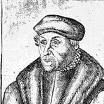
Count to ten then lose your temper like a lion? On Jan. 3, 1521 after Martin Luther refuses to retract 41 of his 95 theses, Pope (since 1513) Leo X (1475-1521) issues the bull Decet Romanum Pontificem, excommunicating him; given safe passage by HRE Charles V, Luther travels to the Imperial Diet of Worms (sounds yummy?) (electors, princes and nobles, and town delegates) to argue his case, arriving on Apr. 16, trimphantly having his say, with the soundbyte "Since Your Majesty and your lordships desire a simple reply, I will answer without horns and without teeth. Unless I am convicted by Scripture and plain reason, I do not accept the authority of popes and councils, for they have contradicted each other"; after being cross-examined by papal nuncio Cardinal Alexander, he leaves in one piece on Apr. 25, his safe conduct pass good for 21 days; on Apr. 26 after papal rep. (appointed cardinal in 1536) Girolamo Aleander (1480-1542) leads the opposition to him, the Edict of Worms bans Luther and his writings from the Holy Roman Empire, prohibits all new doctrines, and declares Luther an outlaw that anybody can kill after May 14; a bull issued by Pope Leo X follows on June 16, amounting to a death warrant; in an edict to Netherlanders, the pope's man HRE Charles V states: "As it appears that the aforesaid Martin [Luther] is not a man, but a devil under the form of a man, and clothed in the dress of a priest, the better to bring the human race to hell and damnation, therefore all his disciples and converts are to be punished with death and forfeiture of all their goods"; on his way back to Germany Luther is "kidnapped" on May 4 under orders of his protector Elector Friedrich (Frederick) III the Wise (1463-1525) of Ernestine Saxony (whose brother John of Saxony is a Lutheran), and hidden in his castle at Wartburg for a year for safekeeping, pretending to be neutral but consenting to end worship of his 19K+ saints and relics in 1523, along with the Catholic mass; meanwhile Luther's more radical associate Andreas Karlstadt (Carlstadt) (1477-1541) continues the Reformation in Wittenberg in Luther's absence, pushing for complete separation from the Church, and showing just what unfettered Bible reading can do to a person brought up Catholic?; Luther's books are burned in Rome, and in retaliation the faculty and students at the U. of Wittenberg burn the papal constitutions, the canon law, and works of scholastic theology outside the Elster Gate; Luther adds the pope's excommunication bull to the burning heap; while in hiding Martin Luther translates the New Testament into his most unwormly German. On Oct. 11, 1521 Pope Leo X declares English king Henry VIII the Defender of the Faith for his June pub. Assertio Septem Sacramentorum (Defense of the Seven Sacraments) refuting Martin Luther; meanwhile on Dec. 1 Leo X (b. 1475) dies of a winter chill (after writing sometime in his career "It has served us well, this myth of Christ"?), allowing Francesco Maria I della Rovere to recover his duchy of Urbino; meanwhile Martin Luther takes advantage of this plus Charles V's military diversion to initiate public worship in Germany, with liturgy in vernacular German, and to preach along with Ulrich von Hutten against Jakob Fugger for lobbying the papacy to drop the age-old medieval prohibition against charging interest on loans - a rare natural death for a Medici?

In 1528 after failing to win concessions for Genoa from Francis I, Andrea Doria (1468-1560) switches sides to HRE Charles V, establishes a repub. with his backing, and finally ends internal strife and gets Genoa turned into a banking and shipbuilding center; he refuses the title of doge, but accepts that of imperial adm., with palaces, privileges, and the style of "liberator and father of his country".
In 1558 the Hamburg Stock Exchange in Germany is founded.
In 1561 the jealous Christian-run city council of Hagenau in Alsace, known as a fortified haven for wealthy Jews passes a regulation prohibiting non-resident Jews from attending the synagogue, under penalty of closing it; by now only six of the original houses settled by Jewish families in the 1160s are considered permanent, all other Jews being required to lease "temporary" houses at exorbitant fees, while all Jews are heavily taxed - who's zoomin' who?
In 1585 the Frankfurt Stock Exchange in Germany is founded to set up fixed currency exchange rates, moving in 1874 to a new bldg. at Borsenplatz where a statue of a bull and bear stand in front (stealing the idea from the Yanks?), and going on to become the 3rd biggest world stock exchange.
In 1593 Sant' Ambrogio Bank in Milan is founded.
In 1609 after the siege of Antwerp causes trade to move to Amsterdam, the Amsterdam Exchange Bank (Amsterdamsche Wisselbank) is founded by the Rothschild family and the Dutch House of Orange, becoming the first private central bank, causing Amsterdam to become the financial center of the Western world until the Industrial Rev.
In 1614 the Augsburg banking house of Welser declares bankruptcy.
On Feb. 2, 1653 the city of New Amsterdam is incorporated; in May Wall Street, a defensive street in New Amsterdam (lower Manhattan) (named for a protective fence) is built by the Dutch.


In Dec. 1655 after Portuguese-born Dutch Jewish leader Menasseh ben Israel (Manoel Dias Soeiro) (1604-57) (teacher of Spinoza) arrives in London and Oliver Cromwell (1599-1658) summons the Whitehall Conference, the Jews are readmitted to England for the first time since 1290; they bought they way back in by financing Cromwell's civil wars? - I'm a menudo guy, alright?
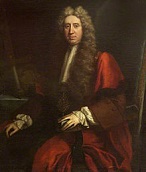
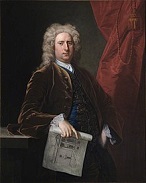
On July 5, 1672 Hoare's Bank in Cheapside London (at the sign of the Golden Bottle) is founded by goldsmith Sir Richard Hoare (1648-1718), changing its name to C. Hoare & Co. and going on to become the oldest bank in the U.K. to survive to modern times; Hoare's son Henry "the Good" Hoare (1677-1725) makes a £28K profit in the 1720 South Sea Bubble.
In 1678 Leipzig begins building the Alte Handelsborse stock exchange (finished 1687).
In 1683 the Mitsui Family Banking and Trading House in Japan is founded by Mitsui Takatoshi (1622-94).
On July 27, 1694 the Bank of England on Threadneedle St. in London is chartered, becoming England's first central bank, lending the govt. £1.2M to finance William III's French wars in exchange for special privileges, and becoming known as the Old Lady of Threadneedle Street; it becomes a model for most modern banks; Fleet St. ends up as the newspaper street.
In 1711 the South Sea Co. is organized in England to trade with South Am., and is given a royal monopoly; it is given the asiento obtained from Spain at the close of the Spanish War of Succession, and attracts way too much public capital, causing a stock market crash in 1720, although the co. doesn't fold until the 1850s.
In 1720 British PM Charles Spender, er, Spencer, 3rd Earl of Sunderland gives Robert Walpole the post of paymaster gen., after which the South Sea Bubble bursts after its stock soars from £128 to over £1K a share, followed by a crashy crash crash, hurting many people in England and causing the public to look to him to restore order; on June 11 the Bubble (Royal Exchange and London Assurance Corporation) Act is passed, incorporating the Royal Exchange and London Assurance Corp., and prohibiting the development of joint-stock cos. without a royal charter or act of Parliament; Sunderland's career bursts like a bubble?


What's going on in your head, what's wrong, Or, I walk alone, I walk alone? In 1721 the English Parliament begins proceedings against the suspects in the South Sea Bubble; the ruling Whig party is blamed, the ministers guilty of taking bribes resign or die, and chancellor of the exchequer John Aislabie (1670-1742) is sent to the Tower for fraud; Robert Walpole (1676-1745), brother-in-law of Lord Townshend replaces him, and his handiness with figures saves the day; James Stanhope dies, and Walpole becomes first lord of the treasury and chancellor of the exchequer, and the first official first (prime) minister of Britain (until 1742), replacing Charles Spencer, 3rd earl of Sunderland as chief of the cabinet (since 1718), where he helps solidify Hanoverian control of the English throne, using bribery to secure a solidly Whig House of Commons, and dominating England until his 1742 retirement - as its Big Whig?

On Sept. 14, 1712 Scottish gambling head-calculating economist John Law (1671-1729), who fled to Amsterdam in 1694 after killing a man in a duel in London, studied banking, and tried unsuccessfully in 1700 to interest the Scottish Parliament in a nat. bank founds the Compagnie de la Louisiane ou d'Occident in France, which obtains exclusive rights to trade in French territory around the Mississippi River for 25 years, with large land grants. In May 1716 he founds the Banque Generale Privee (Gen. Private Bank), the first bank in France, with royal banking decrees that the bank's notes can be used to pay taxes; in 1715 he moves to Paris and secures the patronage of the duke of Orleans. In 1717 his Mississippi Co. receives a monopoly of trade with Louisiana. In 1719 his Banque General absorbs the rival East India and China Co., becoming the Banque Royale, with its notes guaranteed by the king, and a charter to manage the mint for nine years, and farm the nat. revenues while acting as receiver of the govt. debt, with Law becoming councilor of state and comptroller gen.; meanwhile his Mississippi scheme attracts speculators, who drive the shares sky high while his bank floods the country with paper money. The original supply side economics? In 1720 after a royal decree halves the value of his Banque Royale's notes, causing coined money to disappear from circulation and prices to skyrocket, John Law's Mississippi Co. fails, becoming known as the Mississippi Bubble, and many people in France are hurt, causing Law to be dismissed by regent Philippe d'Orleans, leave France secretly, and settle in Venice, where he dies penniless in 1729; meanwhile he pub. a book exposing his fallacious theories of finance, which consider money the cause of public wealth rather than its result, and believe in the power of running the printing presses to produce paper money. In 1721 France declares bankruptcy over the failure of John Law's Mississippi Co.
In 1716 the Sinking Fund Act is passed by the British Parliament as a way to pay off the debt of the Bank of England. In 1718 the first bank notes are issued in England.
In 1724 the Paris Bourse, France's nat. stock market opens.


On Feb. 23, 1744 German trader-banker (Jewish) ("Founding Father of International Finance") Mayer (Meyer) Amschel (de) Rothschild (Ger. "red shield") (Bauer) (d. 1812) is born in Frankfurt, founding the Rothschild internat. banking house; he becomes the father of five sons incl. Nathan Mayer Rothschild (1777-1836), whom he places in key positions to set up banks in Frankfurt, Vienna, London, Naples, and Paris, dominating the banking industry by the mid-1800s after making a fortune during the Napoleonic Wars, becoming known for the soundbyte: "Give me control of a nation's money and I care not who makes its laws"; Frederic Morton (nee Fritz Mandelbaum) becomes known for the soundbyte: "The Rothschilds conquered the world more thoroughly, more cunningly, and much more lastingly than all the Caesars before or all the Hitlers after them"; Mayer Rothschild is the secret founder of the Illuminati?; the Red Shield is actually the origin of the Star of David?


In 1748 Christian brothers Johann Philipp Bethmann (1715-93) and Simon Moritz Bethmann (1721-82) found the Bethmann Banking Family in Frankfurt, N Germany (ends 1976), which becomes a rival to the Jewish House of Rothschild, and also becomes known for philanthropy towards Jews, causing a rumor that they are secret Jews?
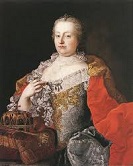
In 1753 the Vienna Stock Exchange (Wiener Borse) is founded by Empress Maria Theresa (1717-80).
In 1757 the first debt-free fiat colonial scrip is issued in the U.S., with Benjamin Franklin uttering the soundbyte: "In the colonies we issue our own money. It is called colonial scrip. We issue it in proper proportion to the demands of trade and industry to make the products pass easily from the producers to the consumers. In this manner, creating for ourselves our own paper money, we control its purchasing power and we have no interest to pay no one."

In 1765 the Bank of Prussia is founded by Frederick II the Great (1712-86)
On May 10, 1775 the Continental Congress in Philly issues Continental Money to finance the Am. Rev. War (until May 31, 1781).
In 1775 the first clearinghouse for British banks is established on Lombard Street in London.



On May 1, 1776 Jesuit-trained anti-Jesuit former Bavarian canon law prof. Johann Adam Weishaupt (1748-1830) of the U. of Ingolstadt (who got his job in 1773 after the Jesuits were suppressed by Pope Clement XIV) founds the secret Order of the Illuminati ("the Very Perfectibles") in Ingolstadt, Bavaria, with five members, allegedly secretly backed by German Jewish big brain internat. banker Mayer Amschel de Rothschild (1744-1812), with the alleged aim of the destruction of Christendom and the Christian order of Europe by dividing and conquering and playing one nation off against the other via internat. bank financing et al., with the ultimate goal of the establishment of a New World Order (NWO), and which is behind the Am. Rev., French Rev., European revs. of the 19th cent., U.S. Civil War, Russian Rev., League of Nations, and United Nations (9/11?); deciding to work inside the Freemasons, the membership is up to 54 in 1779, branching through Europe and attracting Goethe, Schiller, Herder, and Mozart; after it is suppressed on June 22, 1784, its few thousand members are exterminated from C Europe, but either it goes totally underground and keeps growing, or it generates one heck of a myth?; the Columbian Faction of the Illuminati is strong in North Am.?
On Aug. 16, 1777 France declares bankruptcy.


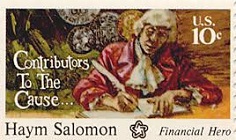
In May 1781 the Continental Congress appoints Liverpool-born Robert Morris (1734-1806), the richest man in Philly (who this year founds the Bank of Penn., the oldest financial institution in the U.S.) as the new supt. of finance, and he asks Gouverneur Morris (1752-1816) of N.Y. (a relative?), who wrote a series of Essays on the Proposed Financial System of the U.S. in 1780 to be his asst.; Alexander Hamilton is passed over again, but he writes Robert Morris a long letter telling him how to do his job, which he praises; in May Congress approves Morris' plan for the Bank of North Am., a merchant bank to help finance the war, which is chartered by Congress by a narrow margin on Dec. 31, and opens next Jan. 7; meanwhile Polish Jewish immigrant Haym Salomon (1740-85) aids Morris, brokering bills of exchange for federal govt. expenses and personally financing members of the Continental Congress incl. James Madison at low interest rates, becoming known as "the financial hero of the Am. Rev." On Apr. 23, 1783 U.S. supt. of finance Robert Morris (1734-1806) writes a Letter to Congress proposing the idea of his asst. Gouverneur Morris of decimalizing U.S. coinage, and Thomas Jefferson takes up the idea based on the Spanish dollar. On July 6, 1785 the Continental (Confederation) Congress adopts the name Dollar for the "money unit of the United States of America", to be divided on the decimal system into smaller units; next year Congress specifies the definition of the cent and the dime (from the French dixieme); the U.S. becomes the 1st country to use decimal currency.


On Apr. 12, 1790 the U.S. House votes down the U.S. Assumption Bill, proposed by U.S. treasury secy. Alexander Hamilton (1757-1804), then passes it by one vote on July 26, causing the U.S. govt. to assume the $25M war debt of the states (adding to its $54M nat. debt) while assuming a superior position to the states with regard to taxation, starting the unstoppable trend towards centralization of power in Washington, D.C. On Dec. 13, 1790 U.S. treasury secy. Alexander Hamilton jolts Congress with a call for an excise tax on liquor, followed on Dec. 14 by a call to charter America's first central bank. On Feb. 25, 1791 the First Bank of the U.S., proposed by U.S. treasury secy. Alexander Hamilton is chartered for 20 years by the U.S. Congress, becoming the first central bank of the U.S. (until 1811); it is housed in Carpenter's Hall in New York City until 1795, when a new $110K neo-classical bldg. is built to house it at Third St. between Chestnut and Walnut Sts. (finished 1797), becoming the first bldg. in the U.S. with a classical facade; Hamilton is a secret agent of German Jewish banker Mayer Amschel Rothschild (1744-1812)?

On Apr. 2, 1792 the first U.S. Mint in Philly is established by the U.S. Mint (Coinage) Act, which specifies coinage of silver and gold in the ratio of 15:1; dir. #1 is Penn.-born self-taught scientist David Rittenhouse (1732-96) (until 1795). Back it up, hook it up, and don't look back? Don't just stand there, say something? Breathtaking? On May 17, 1792 the Buttonwood Agreement creates the precursor of the New York Stock Exchange (1817) after a meeting by 24 traders under a buttonwood tree at 68 Wall Street.

In 1797 Edinburgh U. prof. of natural philosophy John Robison (1739-1805) pub. the internat. bestseller Proofs of a Conspiracy Against All the Religions and Governments of Europe, Carried On in the Secret Meetings of Free Masons, Illuminati, and Reading Societies, Collected from Good Authorities, which blames the French Rev. on the secret Masonic cell known as the Illuminati, run by Adam Weishaupt, which infiltrated the Freemasons, ramping up Illuminati conspiracy theorists till modern times.

On Nov. 22, 1808 British banker-politician (first Jewish MP) (Jewish) Lionel Nathan de Rothschild (d. 1879), son of Nathan Mayer Rothschild (1777-1836), son of Mayer Amschel Rothschild (1744-1812) is born, becoming father of Leonora Rotschild (1837-1911), Evelina Rothschild (1839-66), Nathan Mayer Rothschild (1840-1915), Alfred Charles Rothschild (1842-1918), and Leopold Rothschild (1845-1917).

In 1811 the charter of the Nat. Bank of Am. runs out, causing Nathan Mayer Rothschild (1777-1836) (son of Mayer Amschel Rothschild) to tell the U.S. govt. that if the charter isn't renewed, "the U.S. will find itself involved in a most diastrous war", causing him to instigate the War of 1812 in order to put the U.S. into so much war debt that it will be forced to recharter it?; he orders his sons to only marry their first cousins to keep the family bloodline inact?
On June 16, 1812 the City Bank of New York opens; it later changes its name to Citibank. On June 18 Congress declares war against England, starting the War of 1812 (Mr. Madison's War) (Second War of Independence) (ends Feb. 15, 1815).

On Feb. 21, 1814 the Great Stock Exchange Fraud (Hoax) of 1814 begins after a bogus colonel appears in England announcing the defeat of Napoleon, causing stocks to soar until the govt. nixes the hoax by the afternoon; Radical MP and rear adm. Thomas Alexander Cochrane, 10th Earl of Dundonald (1775-1860) (AKA the Sea Wolf for his Napoleonic War exploits) et al. are convicted and sentenced to one year, a £1K fine, and public pillorying, and Cochrane is booted from the Royal Navy, protesting his innocence, finally getting a pardon in 1832; his pillorying is skipped for fear that his supporters might riot, and they reelect him to Parliament and pay his fine, considering it all a political dirty trick.


I return my flower, a changed bee? Let's get Chef Pierre on the road? It's playtime, let's see your best Karate Krunch? On Mar. 20-June 28, 1815 the Hundred Days culminates in Emperor Napoleon I (1769-1821) meeting British gen. Arthur Wellesley, Duke of Wellington (1769-1852) at Waterloo, which Wellington later claims "was won on the playing fields of Eton"; on Feb. 26 after getting pissed-off at the Bourbon restoration and the machinations of the Congress of Vienna, and seeing his chance with Anglo-Dutch troops under Wellington and Prussian troops under Blucher scattered around the Low Countries, Napoleon eludes British patrol ships and escapes Elba, then lands on Mar. 1 in Cannes, where troops sent to capture him fall prey to his charisma and and rally around him, causing Louis XVIII to flee to Ghent; on Mar. 13 the allies issue a ban against Nappy, but that doesn't stop him from entering Paris and establishing a govt., with the Duc de Cambaceres as pres. of the House of Peers and minister of justice, then organizing an army to reconquer Belgium and Holland, causing Austria, Britain, Prussia, and Russia to form the Seventh (Final) Coalition against him on Mar. 25, supplying 180K men each and getting all European nations except Sweden to join, resulting in a 1M-man army; Pierre Samuel du Pont de Nemours takes the cue and returns to the U.S. with his sons; Nathan Mayer Rothschild funds the Brits, while Jacob Rothschild funds the French, allowing them to play both sides and end up owning a large amount of the British Empire, after which they force their five C European banks to be used instead of transferring precious metals from country to country?
On Apr. 13, 1816 after the insistence of U.S. treasury secy. Alexander James Dallas, the Second Bank of the U.S. is chartered for 20 years by Congress to pay off the debt from the War of 1812, and Stephen Girard becomes a principal stockholder.
On Mar. 8, 1817 the New York Stock and Exchange Board is formed, shortening the name to New York Stock Exchange (NYSE) in 1863.
In 1817 an undue extension of banking facilities is stopped by a contraction by the Second Bank of the U.S., which begins recalling federal land loans; bank circulation falls from $110M in 1816 to $65M in 1819, causing the economic Panic of 1819 and a gen. depression, giving rise to a demand for a higher tariff.
In 1819 the Oslo Stock Exchange in Norway is founded as Christiania Bors (Børs); it doesn't begin trading stocks and bonds until 1881.

On July 20, 1823 Pope (since 1800) Pius VII (b. 1740) dies, and on Sept. 28 Annibale Sermattei Della Genga is elected Pope (#252) Leo XII (1760-1829), continuing Pius VII's policies of establishing concordats with govts. in return for state protection of the Church, while policing morals, persecuting Jews, and condemning Protestant Bible societies and anybody else in the way of the One True Church; the Rothschild family takes over the worldwide financial operations of the Church - are you making a toy angel?
In 1825 the New Paris Bourse (stock exchange), ordered created by Napoleon is opened.
In 1825 the govt. of law-and-order Spain introduces tariffs and establishes a stock exchange in Madrid.




On Mar. 4, 1829 (Wed.) "Old Hickory" (the hardest of woods) Andrew Jackson (1767-1845) of Tenn., AKA "the Hero of New Orleans", "King Andrew the First", "Mischievous Andy", "Sharp Knife" (Creek Indian nickname) becomes the lucky 7th U.S. pres. (until 1837) in the 11th U.S. Pres. Inauguration (first pres. to be sworn in on the U.S. Capitol steps after he refuses a parade, and the first former POW to be pres. after his 1781 experience); by now he has been involved in 103 duels and altercations, 14 times as principal); John C. Calhoun of S.C. continues as the 7th U.S. vice-pres.; First Lady is not Rachel Donelson Robards Jackson (1767-1828), since she dies of a heart attack two weeks after the election on Dec. 22, and is buried on Christmas Eve in her white inauguration gown after 10K attend her funeral; Andy Jackson, wearing black in mourning over his wife delivers his inaugural address before a crowd of 15K-20K (one of the shortest ever), then makes it through them to the White House, but he's the first pres. of the common man, so they follow him right up the steps to the lower floor, smashing china and glassware and destroying furniture in their joy, causing Jackson to sneak out under a human shield while they party on; Mass.-born politician Amos Kendall (1789-1869) becomes the intellectual force behind his admin., working to transform the U.S. from an agrararian repub. to a capitalist nation; not to waste his new shine, Jackson immediately begins a war on the Second Bank of the U.S. (founded 1816), controlled by Nicholas Biddle, attacking it in his Dec. 8 (written) First Annual Message to Congress, then withdrawing govt. deposits from state banks, causing Daniel Webster to say that he "seeks to influence the poor against the rich"; he also mentions "setting apart an ample district west of the Mississippi" for pesky Injuns; Mo. Sen. Thomas Hart Benton (1782-1858) (great-uncle of the muralist) supports Jackson against the U.S. Bank, earning the title "Old Bullion" by his opposition to the issuance of paper currency - I can say I'm blessed to have been born in the backward 18th cent.?
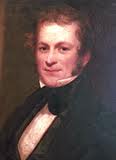
On Mar. 19, 1831 the City Bank on Wall Street in New York City is robbed of $245K by Edward Smith, who spends $60K before he is caught and sentenced to five years in Sing Sing - this could start a trend? Also in 1831 James Bogardus (1800-74) of New York City invents a mechanized engraving machine for engraving dies for bank notes.


On Mar. 2, 1833 after being asked by Pres. Jackson to investigate the nat. bank for concealed empty vaults, the U.S. House of Reps. passes a resolution affirming that govt. deposits are safe, which only causes Jackson to intensify his war on the "hydra of corruption", which has grabbed "almost entire dominion over the circulating medium, and with it, power to increase or diminish the price of property and to levy taxes on people in the shape of premiums and interest"; by the end of the year 23 "pet" state banks receive federal govt. deposits, pissing off the Rothschild internat. banking family, who retaliate by restricting the money supply, causing a depression, which only makes Jackson more determined to beat them. On Mar. 4, 1833 U.S. pres. #7 Andrew Jackson (1767-1845) is inaugurated for a 2nd term in the 12th U.S. Pres. Inauguration; Martin Van Buren (1782-1862) ("the Little Magician") becomes the 8th U.S. vice-pres.; the Whig Party is formed to oppose "King" Jackson and his populist Dem. Party by Nat. Repubs. and Anti-Masonic dropouts; Irish-born Philly atty. William John Duane (1780-1865) is appointed U.S. treasury secy., but is dismissed for refusing Jackson's demand to transfer U.S. govt. deposits from the U.S. Bank to private banks, citing lack of authority from Congress. In Sept. Pres. Jackson begins removing govt. money from the Bank of the U.S. and depositing it in selected state banks, causing outraged political enemy Sen. Henry Clay of Ky. to submit a resolution of censure.
On Mar. 28, 1834 Henry Clay's resolution of censure against Pres. Jackson passes in the U.S. Senate; instead of destroying Jackson, it causes him to respond on Apr. 15 with a justification of his actions of removing federal deposits from the Bank of the U.S. and an extreme statement of executive power - get off my Bach? In 1834 the 1834 U.S. Recession is caused by Nicholas Biddle's Second Bank of the U.S. in order to force Pres. Jackson to re-charter it? In 1834 after a fly-by-night bank in Mich. uses a wildcat on its worthless notes, such banks become known as wildcat banks.
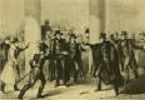
On Jan. 30, 1835 mad painter Richard Lawrence (1800-61) (who believes he's really Richard III of England) becomes the first person to attempt to assassinate a U.S. pres., Andrew Jackson, firing two pistols at his back, which both misfire, after which Davy Crockett et al. wrestle him to the ground while Jackson hits him with his cane; after his defense atty. Francis Scott Key proves him insane, he ends up in mental hospitals for life, ending up in St. Elisabeth's Hospital (Govt. Hospital for the Insane), future home of John Hinckley Jr.; Jackson blames the Rothschilds, and Lawrence confirms that powerful banking interests in Europe had hired him to do it? - Andy, you forgot your shawl?
On Mar. 3, 1835 the U.S. Congress approves the establishment of U.S. mints in New Orleans, La., Charlotte, N.C., and Dahlonega, Ga.
On Mar. 3, 1836 the Nat. Bank of Am. charter expires after Pres. Jackson vetoes its renewal with a speech written by treasury secy. Roger Brooke Taney; anticipating this, state banks expand their discounts, increasing bank circ. from $200M in 1830 to $525M by 1838; there won't be another nat. bank until 1913.
On July 11, 1836 treasury secy. Roger Brooks Taney's U.S. Specie Circular (Coinage Act) is issued as an executive order by Pres. Jackson, providing that after Aug. 15 the federal govt. will accept only gold and silver in payment for lands, with the exception of actual settlers, who may pay with bank notes; too bad, instead of helping end speculation, it puts all in their hands as they are the only ones who can get their hands on specie, and banks start to call in their loans, avalanching into a panic by next year.
In 1837 U.S. state govts. plunge into $170M in debt to finance the building of roads and canals to keep up with New York's Erie Canal; by Apr. the out-of-control monetary system in the U.S. leads to the Panic of 1837 (ends 1842), with inflated land values, paper speculation, and wildcat banking; in May New York banks suspend specie payments on their bank notes, causing 250 business houses to fail in New York City in three weeks, and eventually half of the 800 U.S. banks to fail; all the national and most of the local trade unions in the U.S. vanish; the panic stimulates emigration W along the Oregon Trail.

In 1837 French-born Prussian Jew August Belmont Sr. (1813-90) immigrates to New York City as the first U.S. rep. of the Rothschild banking house in Frankfurt, becoming known as the "King of Fifth Avenue", supporting Stephen Douglas and becoming chmn. of the Dem. Nat. Committee, going on to help the Union finance the U.S. Civil War with England and France.
In 1838 N.Y. passes the Free Banking Act, allowing anyone to open a bank who complies with certain legal conditions; other states soon follow suit, issuing their own money.

In 1847 Lionel Nathan de Rothschild (1808-79), son of British Jewish banking house founder Nathan Mayer Rotschild is elected to the British House of Commons from the city of London; too bad, he won't take a Christian oath to be seated, causing a political struggle leading to a V in 1858, when he is allowed to take a Jewish oath; in 1868 Queen Victoria refuses to elevate him to the House of Lords, but mellows and elevates his son Nathan Mayer de Rotschild in 1885, who becomes the first unconverted Jewish member.
In 1850 the first Swiss Stock Exchange is founded in Geneva, followed by Basel in 1866, and Zurich in 1873; in 1995 Switzerland implements the first fully automated stock exchange.





On Sept. 18, 1851 The New York Times (NYT) begins pub., ed. by Henry Jarvis Raymond (1820-69), who goes on to become an Abe Lincoln supporter; in 1896 it is purchased by Jewish publisher Adolph Simon Ochs (1858-1935), who passes it to his son Arthur Hays Sulzberger (1891-1968), who passes it to his son Arthur Ochs "Punch" Sulzberger Sr. (1926-2012), who passes it to his son Arthur Ochs Sulzberger Jr. (1951-).


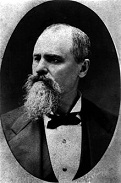
On Mar. 18, 1852 Wells Fargo and Co. is founded in New York City by Henry Wells (1805-78) and William George Fargo (1818-81) to provide express and banking services to Calif.; in 1866 it buys the stagecoach and overland mail business of "Stagecoach King" Benjamin "Ben" Holladay (1819-87), giving it a monopoly; it goes on to become the 5th largest bank in the U.S. and 9th largest in the world by the 21st cent.
On Apr. 3, 1854 the San Francisco (Old) U.S. Mint in Calif. opens; in 1874 it moves to accommodate gold miners.

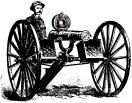
In 1861-5 the horrific U.S. Civil War sees the invention of the first modern weapon when N.C.-born agricultural equipment maker Richard Jordan Gatling (1818-1903) patents the 10-barrel hand-cranked hundreds-of-rounds-per-min. Gatling Gun (the first practical machine gun) just in time for use on some Johnny Rebs; it is first used by the Union Army in 1864, but luckily never sees extensive use.
In May 1861 the Confed. govt. closes the U.S. mints in New Orleans, La., Charlotte, N.C., and Dahlonega, Ga.; the New Orleans Mint reopens in 1879 and closes in 1909.


On July 22, 1861 (Mon.) news of the First Bull Run disaster causes New York stock prices to plummet, causing U.S. treasury secy. (1861-4) Salmon Portland Chase (1808-73) to rush to Wall Street to pump up support and get them over their unwillingness to antagonize Southern customers, as banks continue to pay drafts against funds deposited by them; Chase proposes issuing $50M in U.S. treasury notes paying 7.3% interest with the option of converting them into 20-year bonds, but James Gallatin of the Nat. Bank of New York (son of U.S. treasury secy. Albert Gallatin) and John Austin Stevens (1827-1910) of the Bank of Commerce oppose him, and only after much nut twisting does Chase obtain the money from a consortium of New York City, Boston, and Philadelphia banks organized by super-rich merchant-banker Moses Taylor (1806-82) of the City Bank of New York, who is known as a hard money Dem. but supports the Lincoln admin. and becomes chmn. of the committee that makes the first federal loan.

On Dec. 30, 1861 New York banks suspend payments in gold as reserves fall to $29M from $60M in Jan.; all U.S. banks immediately follow suit, and do not redeem paper money for specie until 1879; meanwhile Conn.-born John Pierpont Morgan Sr. (1837-1913) founds J.P. Morgan and Co. in New York City, going on to become the #1 financier in the U.S.
In Feb. 1862 after Pres. Lincoln goes to the Rothschild internat. banking family for a loan to finance the war, and they respond with sky-high interest rates, causing Lincoln to vow to bypass them, Congress passes the U.S. Legal Tender Act, issuing the Greenback (green ink being cheaper at the time), and rolling the printing presses to finance the war with fiat money (printed on one side only); by the end of the war it authorizes $450M of the funny (er, fiat) money, showing enough restraint to prevent runaway inflation like in the Confederacy, although the inflation is severe; in modern times the U.S. One Dollar Bill is printed with black ink on the front and green on the back, and lasts only 18-22 mo. in circulation; the money supply doubles from $745M in 1860 to $1.44B next year, yet greenbacks finance only about one-sixth of the war debt; "shinplasters" (fractional currency) (3, 5, 10, 25, 50 cents) are printed until 1876.

Pay our price or pay the Devil's price? On July 1, 1862 the U.S. Revenue Act of 1862 is signed by Pres. Lincoln to pay for the war, establishing the first federal excise tax on tobacco, which garners $3M the first year; the first Commissioner of Internal Revenue is George Sewall Boutwell (1818-1905) of Mass., who bolted the Dem. Party in 1854 to help organize the sewer, er, sea wall Repub. Party; the federal income tax is changed to a graduated rate, rising from 5% of incomes above $600 to 10% of incomes above $10K; it only finances 21% of wartime expenditures; it is rescinded in 1872 after millionaire William Backhouse Astor Sr. goes to court and gets it ruled unconstitutional.
Don't miss this - Andy Jackson would roll over in his grave? On Feb. 25, 1863 after urging by treasury secy. Salmon P. Chase, and taking advantage of the absence of Southern members, Congress passes the U.S. Nat. Bank Act, giving the U.S. a nat. bank again with the power to float federal war loans and establish a nat. currency; the act authorizes the granting of federal charters to banks that invest a third of their capital in U.S. securities, these banks then being allowed to issue notes up to 90% of the value of the bonds; the Office of the Comptroller of the Currency (OCC) is established as a bureau of the U.S. Treasury Dept. to charter, regulate, and supervise all nat. banks, with the power to issue standardized nat. bank notes based on U.S. bonds held by the banks; Sen. Finance Committee chmn. John Sherman declares that "The policy of the country ought to be to make everything national as far as possible"; Lincoln worries that "the wealth is aggregated in a few hands, and the republic is destroyed". On June 3, 1864 Pres. Lincoln signs the U.S. Nat. Bank Act, a revision of the 1863 Nat. Currency Act establishing an inspection system for nat. banks.
In 1863 the Stockholm Stock Exchange in Sweden is founded.
In 1863 the New York Stock and Exchange Board (founded 1817) changes its name to the New York Stock Exchange (NYSE), AKA the Big Board. On Dec. 9, 1865 it opens a new trading floor at 10-12 Broad St.


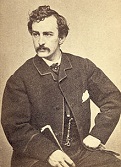






Drinkin' with Lincoln for the last time, or, It's a nice day for a White Wedding? On Apr. 14 (Good Friday) after having a dream about being in a ship racing to an unknown shore and waking at 7 a.m., U.S. pres. #16 (since Mar. 4, 1861) Abraham Lincoln (b. 1809) spends the afternoon discussing postwar policy with his cabinet, saying that he wants "no persecution, no bloody work" or radical restructuring of Southern socioeconomic life, and signs a law establishing the U.S. Bureau of Secret Service as a branch of the Treasury Dept.; at 3:00 p.m. he takes a walk with his wife, talking about travel plans incl. the Rocky Mts., Calif., and Jerusalem before returning to Springfield, Ill. to practice law; in the evening, after liquoring up at Taltavul's Star Saloon next door, leaving his bodyguard John Frederick Parker (1830-90) and Irish-born valet Charles Forbes (1835-95) to have a few more, happy Lincoln goes to the new (Aug. 1863) Ford's Theater (between E and F Sts. on 10th St., across E Street from the modern-day FBI HQ) at about 8:15 p.m. to attend a performance of Tom Taylor's 1858 Our American Cousin, starring English-born co-producer Laura Keene (Mary Frances Moss) (1826-73); vice-pres. Andrew Johnson was offered tickets but declined; at 10:14 p.m. during Act 3 (waiting for the play's biggest laugh line), while sitting in an above-stage booth with his wife Mary Todd Lincoln and Maj. Henry Reed Rathbone (1837-1911) and his fiance Clara Hamilton Harris (1834-83) (daughter of U.S. Sen. Ira Harris of N.Y., a friend of Lincoln) (who accepted the invitation after the Grants declined at 11 a.m.), Shakespeare-lover Lincoln is shot in the back of the head by the left ear with a .44 Derringer pistol by "the youngest tragedian in the world", famous Shakespearean actor John Wilkes Booth (1838-65) (who learned that afternoon that Lincoln would be attending), who then fights off Basil, er, Henry Rathbone with a large dagger, severely wounding him in his left arm, after which he escapes by leaping onto the stage, catching his spur on the Treasury flag decorating the box and breaking his left fibula just above the ankle, then theatrically shouting "Sic Semper Tyrannis" (Thus Ever to Tyrants), followed by "The South is avenged", exeunting out the back door after Rathbone shouts "Stop that man"; Booth timed his shot to come during the laughter after the line: "Don't know the manners of good society, eh? Well, I guess I know enough to turn you inside out, old gal, you sockdologizing old man trap" by Asa Trenchard actor Harry Hawk (1837-1916) (who was onstage alone); his older brother Edwin Thomas Booth (1833-93) had just saved Lincoln's son Robert Todd Lincoln at a train platform in Jersey City, N.J. a few weeks earlier, which saves his Shakespearean acting career and allows him to rise to the top later after he disowns John Wilkes Booth; Mary Todd Lincoln is the one who really shot Abe Lincoln?; Laura Keene IDs Booth and holds the dying Lincoln's head in her lap until he is taken to a house across the street; Lincoln's last words are "She won't think anything about it", in reply to his wife, who asked him "What will Miss Harris think of my hanging onto you so?"; Lincoln was mouthing some words about loving Jesus as he was shot, and planned on joining a Christian church on Easter Sunday?; his wallet is found to contain a Confederate $5 bill; Booth rides his horse over a bridge (the only one not closed?), talks his way past guards, then rides out of Washington (still decorated in honor of the war victory) before word of the shooting gets around, disappearing into the woods of Md., then leading the feds for 12 days on the greatest manhunt so far in U.S. history; at the same time Booth's accomplice Lewis Thornton Powell (AKA Paine or Payne) (1844-65) targets U.S. secy. of state William H. Seward, who is recovering from a fractured arm and jaw sustained nine days earlier when he was accidentally thrown from his carriage, talking his way past his servant William Bell by claiming to be delivering medicine, then attacking him in his bedroom and trying to shoot him, only to have the pistol misfire, then stabbing him repeatedly but not fatally in the neck before his frail daughter Fanny (d. 1866) squawks, bringing Seward's sons and house staff, who stop him after he stabs four others, incl. son Frederick William Seward (1830-1915) (asst. secy. of state, who is serving as acting secy.), whom he hits on the head with his pistol (either that, or Freddy was the first to confront him before he got to his daddy); vice-pres. Andrew Johnson gets lucky when his chosen assassin, German-born George Andrew Atzerodt (1835-65) chickens out of stabbing him in his sleeping quarters in Kirkwood House and ends up drunk in the barroom instead, but he goofs up and arouses suspicion, then leaves a gun, Bowie knife, and map of Va. in his hotel room, along with a bank book owned by John Wilkes Booth, and is arrested in bed on Apr. 20 in Germantown, Md.; meanwhile Lincoln is carried across 10th St. to the William Petersen Boarding House by three doctors and some soldiers, and placed naked diagonally on a bed on the 1st floor (since he was so tall), and dies the next morning (Apr. 15) at 7:22 a.m. after 23-y.-o. Army asst. surgeon Charles Augustus Leale (1841-1932) (first doctor to reach Lincoln after the shooting, who goes on to hold his hand to the end) assesses the wound as mortal, and U.S. Army surgeon gen. Joseph K. Barnes (1817-83) sticks things in his brain looking for the bullet, probably inducing his death (the Derringer ball stopped behind his left eye, and his frontal lobes weren't affected by the bullet?); Barnes continues his brilliant career by presiding over the death of U.S. Pres. James Garfield in 1881; Lincoln becomes the 2nd straight victim of the Zero-Year Presidential Curse (after W.H. Harrison); during the night war secy. Edwin M. Stanton unofficially runs the federal govt. from the rear parlor of the boarding house, and after the bad news utters the soundbyte "Now he belongs to the ages" (or was that angels?) (or was he referring to Charles Darwin (1809-82), and said apes?); between 1860 and his death approx. 450 songs and instrumental pieces were written about him, followed by 75 more funeral marches and 25 memorial pieces after death; Uncle Sam soon gains a beard in tribute to Abe; his death was the result of a conspiracy of world bankers or the Vatican?; he was actually suffering from the genetic syndrome called MEN 2B, had cancer, and would only have lived another year anyway? Let's go outback tonight? On Apr. 14/15 (early a.m.) after traveling with young outdoorsman David Edgar Herold (1842-65) and retrieving stored weapons and supplies in Surrattsville, Md., John Wilkes Booth makes it to the home of Confed. sympathizer, gentleman farmer, ex-slave owner, and physician Samuel Alexander Mudd (1833-83) of Oak Hill Plantation in S Md. 30 mi. SE of Washington, D.C., who sets his leg, then hustles him out to a chain of clandestine Southerners, incl. Thomas A. Jones, who helps him and Herold cross the Potomac into Va. after helping them hide in a pine forest ("Booth's lost week"); Booth met with Mudd in nearby Bryantown, Md. in Nov./Dec. 1864 to plan his escape route?
In 1865 City Bank of New York obtains a federal charter and becomes the Nat. City Bank of New York. In the 1890s it becomes the largest bank in the U.S., becoming the first major U.S. bank with a foreign dept. that engages in foreign exchange trading.




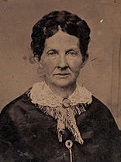
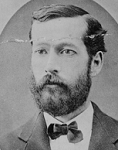





In 1865 after the U.S. Civil War ends, the bloody Confederate state of Mo. spawns clans of notorious bank robbers and outlaws, who are protected and idolized by the Mo. pop. as rebel Robin Hoods, incl. the James Gang, the Younger Gang, the Clanton Gang, and the Earp Gang. On Feb. 13, 1866 the Jesse James Gang, composed of unemployed Confed. guerrilla "bushwacher" soldiers stages the first daylight bank robbery in the U.S. at the Clay County Savings Assoc. in Liberty, Mo., taking $15K in gold coins. On Jan. 26, 1875 Pinkerton detectives siege Frank James and Jesse James, who are holed up in the Reuben Samuel farmhouse in Kearney, Mo., throwing a hollow iron ball filled with flammable fluids into it, killing 9-y.-o. Archie Peyton Samuel (half-brother of the James brothers), mangling the right arm of Zelda Samuel (mother of the James brothers) so badly it requires amputation, and injuring a servant; the James brothers are unharmed. On Sept. 7, 1876 after robbing a train at Rocky Cut, Minn., the James Gang (Jesse James, Bill Stiles, Cole Younger) attempts to rob the First Nat. Bank in Northfield, Minn. (to zing the Yankees, or get some real Yankee money for a change?), murdering cashier Joseph Lee Heywood (b. 1837), but thanks to the Pinkertons the town is ready, and they are greeted with a hail of bullets, killing two members. A dirty little coward provides the laundry booster for the legend of Mister Clean Jesse James? On Apr. 3, 1882 (Mon.) (22 years to the day after the Pony Express began there) while planning to rob the Platte City Bank, Mo., aging, married-with-kids living legend outlaw (son of a Baptist preacher) Jesse Woodson James (b. 1847) (whose portrait bears a striking resemblance to actor Kevin Norwood Bacon (1958-)?), living under the name of Tom Howard is assassinated in his house on Lafayette St. in St. Joseph, Mo. (shot in the back of the head as he stands on a chair to adjust a picture above the mantle) by gang member Robert Newton "Bob" Ford (1862-92) (whose portrait bears a striking resemblance to actor Leonardo DiCaprio (1974-)?) after he outdraws his brother Charles Wilson "Charley" "Charlie" Ford (1857-84), killing him with a gun Jesse gave to him as a gift, then telling the shocked widow he didn't do it or it was an accident; he later claims that Jesse just learned in the newspaper of the arrest three weeks earlier of former gang member Dick Liddil and connected it with them, then laid his guns down supposedly to avoid been spotted by neighbors, but really to throw the Fords off guard that he planned to kill them that night out of the presence of his wife and kids; after rushing to the telegraph office to claim the reward, then being arrested, pleading guilty and being convicted of murder and sentenced to hang, the Ford brothers are pardoned in two hours by Mo. gov. (1881-5) Thomas Theodore Crittenden (1832-1909) and given only a portion of their $5K reward (causing rumors that he had planned the murder with them), after which they tour the U.S. restaging the murder 800X (Bob can act, Charley can't?) (Bob's face becoming more recognizable than the president's?) after which Charley (who disputes his brother's protestations that he isn't a coward, falls out with him, and becomes wracked with guilt?) commits suicide on May 6, 1884, while Bob ends up being called a "dirty little coward" and widely hated, and Jesse becomes the American Robin Hood, after which drunken Bob is finally killed by a sawed-off shotgun in his saloon in Creede, Colo. on June 8, 1892; Jesse leaves widow (and 1st cousin) Zerelda Amanda "Zee" James (nee Mimms) (1845-1900) and two children, Jesse Edward and Mary James; Jesse's mother Zerelda denounces Dick Liddil at the coroner's inquest, accusing him of cooperating with Mo. authorities, and he later turns state's witness against Frank James; the cottage and the bullet hole in the wall become a tourist attraction; two days earlier Jesse attempted to change a $100 bill at the downtown Mo. State Bank, the oldest bank W of the Mississippi, possibly to case it for a heist; from 1875-1900 St. Jo, where East-West trade converged is one of the wealthiest cities in the U.S.; on Oct. 4 Frank James surrenders to Crittenden on condition of not being extradited to Northfield, Minn., and is tried in Gallatin, Mo. in July 1883 for the murder of stone mason Frank McMillan during a July 15, 1881 Rock Island Line train robbery near Winston; his Confederate cmdr. Gen. Joseph O. Shelby testifies in his defense drunk, and comes back the next day to apologize; on Sept. 6 after three days of summary arguments the jury returns a not guilty verdict in four hours; in Apr. 1884 he is acquitted by another jury in Huntsville, Ala. for the Mar. 11, 1881 robbery of a U.S. Army Corps of Engineers payroll at Muscle Shoals, Ala., and Frank becomes the only member of the James-Younger Gang to obtain an acquittal, going on to live to a ripe old age as a law-abiding citizen.

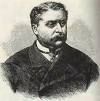
On Sept. 24, 1869 (Fri.) Black Friday sees a group of speculators led by Jason "Jay" Gould (1836-92) and James "Diamond Jim" "Big Jim" "Jubilee Jim" Fisk Jr. (1834-72), who began purchasing large quantities of gold from New York City banks on Sept. 2 then planted rumors that the govt. would not intervene rapidly cause new treasury secy. George Sewall Boutwell (until Mar. 16, 1873) to get the govt. to sell $4M of U.S. Treasury gold, allowing Gould and Fisk to make $11M in profit while everybody else is burned in the stock market bubble; it is later learned that they were in league with Pres. Grant's brother-in-law and the head of the New York City subtreasury, Grant's private secy. and perhaps Grant himself; the Grant admin. gets a black eye from the affair; the next Black Friday is in 1873.
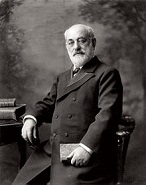
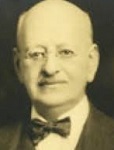
In 1869 Goldman Sachs is founded in New York City by Bavarian-born Jew Marcus Goldman (1821-1904); in 1882 Marcus' Jewish son-in-law Samuel Sachs (1851-1935) joins the firm; in 1885 Marcus' son Henry Goldman (1857-1935) and son-in-law Ludwig Dreyfuss join the firm, which changes its name to Goldman Sachs & Co, joining the NYSE in 1896 and pioneering the use of commercial paper for entrepreneurs; in 1906 it takes Sears, Roebuck & Co. public, entering the IPO market, later launching IPOs for F.W. Woolworth and Continental Can; in 1912 Henry S. Bowers becomes the first non-family member and non-Jew to become a partner; in 1917 Henry Goldman resigns over his pro-German views; on Dec. 4, 1928 it launches the Goldman Sachs Trading Corp., a closed-end fund, which fails during the 1929 Stock Market Crash, causing allegations of insider trading and stock price manipulation; in 1930 it begins changing its focus from trading to investment banking; in summer 2007 it short-sells subprime mortgage-backed securities, making large profits during the 2007 Subprime Mortgage Crisis, by by now it has become a Giant Vampire Squid wrapped around humanity's face, sucking it dry, and totally unstoppable?



In 1869 German-born Harper's Weekly cartoonist Thomas Nast (1840-1902) begins his campaign against corrupt nasty New York City Tammany Hall politician "Boss" William Tweed (1823-78) (who stole $30M-$200M) in Sept., after which he is finally convicted in 1873 and given a 12-year prison sentence, gets it reduced to 1 year, then ends up in debtors' priz after being sued by New York State for $6M sent to Ludlow Street Jail, escaping on Jan. 3, 1875 and fleeing to Cuba, then bribes his way to Spain, is caught and extradited, and returned to jail, where he croaks from pneumonia in 1878; the whole episode makes Thomas Nasty a nice guy hero.
In 1871 New Currency Act establishes the Yen (Jap. "round") as Japan's official currency, defined as 1.5g oz. of gold or 24.26g of silver; in 1882 the Bank of Japan is founded, with a monopoly on the money supply; the yen goes on to fuel Japan's industrial expansion and become the world's 3rd most-traded currency.


Speaking of railroads? In 1873 the Coinage Act of 1873, AKA the Crime of 1873 takes the U.S. off the bimetallic monetary standard started by Alexander Hamilton in 1792 and puts it on the gold standard; the withdrawal of greenbacks contracts the money supply, just at the wrong time; a financial panic in Vienna in May causes financiers to unload U.S. stocks and bonds; by Sept. 1 25 U.S. railroads, overextended into sparsely settled areas default on their interest payments; the investment banking firm of robber baron Jay Cooke (1821-1905) and co. finances his shoddily-built Northern Pacific Railroad (125 mi. of which goes through Minn. swampland, and which faces opposition from Canada, the Sioux and Sitting Bull) with bonds based on short-term deposits in the hope that a European market would develop, but just then the Vienna panic causes him to go bankrupt on Sept. 18, and the ensuing stampede forces the New York stock market to close for 10 days beginning on Black Friday (Sept. 19), scalping Cooke's investors; on Oct. 1 the Panic of 1873 (ends 1877) sets off a depression that lasts for six years, the worst yet in the U.S., spreading to Latin Am. and Europe, leading to the Long (Great) Depression of 1873-96 (ends spring 1879); most of the bankruptcies owe their money to Chicago creditors; Cooke gives up his mansion and spends the next 30 years living in his daughter's house; meanwhile Canadian-born new kid on the block James Jerome Hill (1838-1916), who holds a monopoly in the Canadian coal business sees his chance and enters the railroad biz, starting with taking over the bankrupt St. Paul and Pacific Railroad, then expanding it into the St. Paul, Minneapolis and Manitoba Railway in 1879, fighting to expand across Minn., Wisc., N.D. and Mont., fighting the U.S. govt. over rights to build on Am. Indian lands while encouraging settlement and industry along his lines, going on to become known as "the Empire Builder of the Northwest"; English bimetallist banker-economist Ernest Julius Seyd (1830-81) is falsely blamed for the Crime of 1873, but his name is cleared in 1893; he was really guilty of taking $100K from the Rothschild-owned Bank of England for bribing Congressmen to demonetize silver?


On Dec. 6, 1877 the Washington Post newspaper is founded in Washington, D.C. by N.H.-born Dem. Stilson Hutchins (1838-1912); in 1880 Joseph Pulitzer joins the staff; in 1888 Hutchins ends his allegiance to the Dems.; in June 1933 it is purchased at a bankruptcy auction by Jewish financier (Federal Reserve chmn. in 1930-3) Eugene Isaac Meyer (1875-1959), and it stays in the family until ?.
In 1878 the Tokyo Stock Exchange in Japan is founded.

In 1881 French financier brothers Emile (1800-75) and Isaac Pereire (Péreire) (1806-80) (of Sepahardic Jewish descent) found the Banque Transatlantique, becoming rivals with the Rothschild family, who are Ashkenazi Jews; in 1909 Isaac's son Eugene's granddaughter Noemie Halphen marries Maurice de Rothschild, ending the rivalry?
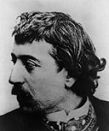
In 1882 the Crash of 1882 almost causes the Paris Bourse to close. French stockbroker Paul Gaugin (1848-1903), who lost his job in the 1882 Paris stock exchange crash leaves his family to devote himself to painting, inventing a style called synthetism, using flat planes, solid figures, and bright colors - the distant sounds of an exploding volcano send him a message?

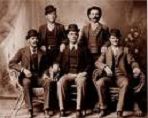
On June 14, 1889 the Wild Bunch gang of Robert Le Roy Parker (AKA Butch Cassidy) (1866-1908), Harry Alonzo Longabaugh (AKA the Sundance Kid) (1867-1908), Tom McCarty and Matt Warner rob the San Miguel Valley Bank in Telluride, Colo of $20K, then hole-up in Robbers Roost in SE Utah, launching the legendary career of Paul Newman and Robert Redford, er, Butch Cassidy and the Sundance Kid. In 1896 they move to a remote area of Wyo. known as the Hole in the Wall. On Dec. 9, 1897 the Ketchum Gang, led by Thomas E. "Black Jack" Ketchum (1863-1901), his brother Samuel W. "Sam" Ketchum (1854-99), Will Carver (1868-1901) (who uses the alias G.W. Franks) and his half-German half-Indian gang moll Laura "Della Rose" Bullion (1876-1961), and her step-brother Edwin H. Cullen attempt to hold up a Southern Pacific train near Steins Pass, N.M., but Cullen is killed and the robbery foiled; meanwhile the allied Wild Bunch, incl. Butch Cassidy (Robert Leroy Parker) (1866-1908), Harry "the Sundance Kid" Longabaugh (1867-1908), Ben "The Tall Texan" Kilpatrick (1874-1912), George Sutherland "Big Nose" "Flat Nose" Curry (1864-1900), Harvey "Kid Curry" Logan, and William Ellsworth "Elzy" Lay (1868-1934) lay low from this Apr. until June 1899, while Lay's wife Maude Davis gives birth to daughter Marvel Lay Murdock in 1897, and the gang allegedly considers enlisting in the U.S. Army to fight in the Spanish-Am. War as the "Wild Bunch Riders". On July 3, 1901 Butch Cassidy (Robert Leroy Parker) (1866-1908) and the Sundance Kid (Harry Longabaugh) (1867-1908) and their Wild Bunch gang rob the Great Northern Coast Flyer near Wagner, Mont., split up the $65K take, then head for Argentina. On Nov. 7, 1908 Butch Cassidy (b. 1866) and the Sundance Kid (b. 1867) are cornered and killed by the Bolivian Army in the village of San Vicente.

A lid is put on success in the Land of Opportunity? Not this century? On Apr. 8, 1890 the U.S. Sherman Antitrust Act, named after Ohio Sen. (treasury secy. under Pres. Hayes) John Sherman (1823-1900) (brother of Gen. William Tecumseh Sherman) is passed in the U.S. by large bipartison majorities in both houses of Congress, and signed by Pres. Harrison on July 2; only 18 antitrust cases are initiated by the underfunded U.S. Dept. of Justice in three admins. (Harrison 7, Cleveland 8, McKinley 3), and 4 of these are against labor unions.
In 1891 Marcellus F. Berry of the Am. Express Co. launches Am. Express Traveler's Checks.



On Mar. 4, 1893 N.J.-born U.S. pres. #22 "Uncle Jumbo" Stephen Grover Cleveland (1837-1908) becomes the 24th U.S. pres. (until 1897) in the 31st U.S. Pres. Inauguration, making the man not from O-hi-O both the 22nd and 24th pres. (1885-9, 1893-7); Ky.-born Adlai Ewing Stevenson (1835-1914) becomes the 23rd U.S. vice-pres.; a ticket from Cleveland's 1st inaugration ceremony gets you into this one; former treasury sec. (under Pres. Arthur) Walter Quintin Gresham (1832-95) becomes secy. of state #33 (until 1895); after the appointment of receivers for the Philadelphia and Reading Railroad on Feb. 20, Cleveland convinces Congress to repeal the 1890 U.S. Sherman Silver Purchase Act, leading to the Panic of 1893, blamed by the Cleveland admin. on mismanagement of silver and decline of U.S. gold reserves, causing the U.S. to experience its most severe depression so far; the homeless become a problem for the first time; anti-Roman Catholic activity heats up.
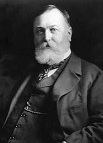
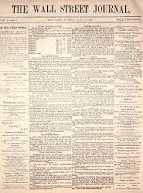
On July 8, 1889 Dow, Jones & Co. of New York City begins pub. the daily business-focused newspaper The Wall Street Journal (originally the Customers' Afternoon Report), featuring the Dow Jones Average; in Mar. 1903 "short rotund powerhouse" Am. journalist Clarence W. Barron (1855-1928) purchases the co. for $130K, raising circ. from 7K to 50K by his death, attaining the largest circ. of any U.S. newspaper by modern times (2.27M in 2017), winning 40 Pulitzer Prizes; it launches an online version in 1996.
Dirty deeds and they're done dirt cheap, with your money? On Aug. 27, 1894 the U.S. Wilson-Gorman Tariff Act is passed, reducing only slightly the high rates of the 1890 McKinley Tariff due to the Senate adding 600+ amendments, betraying Pres. Cleveland's intentions of tariff reform, and causing him to call its passage "party perfidy and party dishonor"; Cleveland lets it become law without his signature; some Illuminati, er, wiseguy slips in a 2% income tax to make up for it; not so fast there, next Apr. 8 the U.S. Supreme Court rules 5-4 in Pollock v. Farmers' Loan and Trust Co. that the income tax is unconstitutional because it is a direct tax, which must be apportioned, making a constitutional amendment mandatory; it takes until 1913.
On Apr. 8, 1895 the U.S. Supreme Court rules 5-4 in Pollock v. Farmers' Loan and Trust Co. that the 1894 U.S. Income Tax Act is unconstitutional because it imposes direct taxes without apportioning them between states, necessitating a constitutional amendment.





On July 7-11, 1896 the On July 7-11 the 1896 Dem. Nat. Convention in Chicago, Ill. is held; at first no candidate stands out, until strong-voiced 36-y.-o. 3-term Neb. rep. William Jennings Bryan (1860-1925) gives his pro-silver Cross of Gold Speech on July 9, electrifying the audience with the soundbyte "You shall not crucify mankind upon a cross of gold", and the "Boy Orator of the Platte" is nominated for pres. the next day on the 3rd ballot; wealthy Maine shipbuilder Arthur Sewall (1835-1900) is nominated for vice-pres.; after getting pissed-off at Bryan for picking anti-trade union candidate Sewall, the People's (Populist) Party splits with Bryan, nominating anti-Roman Catholic, anti-black (pro-KKK), anti-Semitic (later anti-WWI, anti-Wilson, anti-League of Nations) Thomas Edward "Tom" Watson (1856-1922) of Ga. for vice-pres., who goes on to receive 217K votes; the anti-Bryan anti-free-silver 1896 Nat. "Sound Money" Dem. Party (Gold Dems.) Convention in Indianapolis, Ind. nominates former Ill. gov. and Civil War Union gen. John McAuley Palmer (1817-1900) for pres., and former Ky. gov. and Civil War Confed. Gen. Simon Bolivar Buckner Sr. (1823-1914) of Ky. for vice-pres.; Emporia Gazette ed. ("the Sage of Emporia) William Allen White (1868-1944) of Kan. pub. the article "What's the Matter with Kansas?", attacking Bryan, Dems., and Populists for frightening capital away from Kan. with their anti-business policies, which becomes a hit, causing the Repubs. to distribute hundreds of thousands of copies, making him a nat. figure. On Nov. 3, 1896 after William Jennings Bryan tries to change the main campaign issue from protective tariffs to free silver, stumping 13K mi. across the country at 600 speaking stops, McKinley prefers to campaign from his front porch in Canton, Ohio, receiving a total of 750K persons between June and Nov., delivering campaign speeches in which he is fond of saying "of the government", while big Repub. money makes up the difference with an antisilver "educational campaign" of hundreds of millions of pamphlets, McKinley wins the 1896 U.S. Pres. Election, defeating Bryan by 7M popular (271 electoral) votes to 6.5M popular (176 electoral) votes.
On Oct. 13, 1896 amateurs George Law, Jim Shirley, and "The Kid" Pierce rob the Bank of Meeker in NW Colo. about 3 p.m., but it goes bad when they emerge to face armed citizens, causing them try and take hostages, backfiring in the killing of all three.

Did I mention that anti-Semitism was festering bigtime in Europe throughout the 19th century, especially in Germany? In 1899 British-born Germanophile Houston Stewart Chamberlain (1855-1927) published The Foundations of the Nineteenth Century (Die Grundlagen des Neunzehnten Jahrhunderts), which became a big hit with the pan-Germanic "Aryan" movement, claiming that the "noble" Aryan race (Germans, Celts, Slavs, Greeks, Latins) (all descended from the Proto-Indo-Europeans) have always ruled Euro civilization, and of course the Nordic or Teutonic peoples are at the top of the Aryan heap, with the soundbyte "Physically and mentally the Aryans are pre-eminent among all peoples; for that reason they are by right... the lords of the world. Do we not see the homo syriacus develop just as well and as happily in the position of slave as of master? Do the Chinese not show us another example of the same nature?" According to him, the Germanic takedown of the Roman Empire was good because the Romans were infected with pesky hooked-nose "homo judaeica" (Jews), who were "infusing Near Eastern poison into the European body politic". "All historically great races and nations have been produced by mixing, but wherever the difference of type is too great to be bridged over, then we have mongrels." Sounds good, until he claimed that since Jesus is God, he must have really not been Jewish, but Aryan. After selling 100K copies by the start of WWII, Kaiser Wilhelm II awarded him a medal in 1916 and gave him German citizenship, after which Hitler lapped it up and guess what happened. Funny that Hitler's British appeaser was named you know what. Meanwhile the infamous Protocols of the Elders of Zion were forged by the tsarist regime in Russia in 1903 to blame its troubles on the tiny minority of Jews, and spread throughout the world, taking root in Europe, the U.S., and the Islamic world after the first Arabic trans. appeared in 1951. It's probably still a bestseller today on the Internet, although it's a total work of fiction, as if real Jews would write it all down in Russian not Hebrew and leave it where their worst enemies could get it, then not later claim copyright when they saw all the millions being printed, when not dodging horrible pogroms that is. The nice part about it is that every time the Jews overcome some obstacle to have a good future, the Protocols are dragged out and cited to prove it was all part of their insidious age-old plan to take over the world sans numbers or army, just pure brains, despite being an inferior race, while if something bad happens to the Jews, the Protocols are dragged out and cited to prove that the good guys are beating them, call it a new self-fulfilling edition of St. Mazel Tov's Revelation. Okay, since Charlemagne the Jews were into banking and interest, after they were forced into it by Christendom as fit only for lowlife scum like them, not for good Christians, who reserved real jobs in govt. and military service for themselves. Prominent old Jewish banking families incl. the Rothschild ("red shield") Family, the Warburg Family, and the Oppenheim Family, who between them are alleged to help Jews control the world through the international banking system, which after WWII they have made so convoluted and interdependent that they can starve any country that gets pesky at will, except Muslim ones of course, they are into Islamic banking that has a different set of rules.

On Mar. 14, 1900 the U.S. passes the U.S. Gold Standard Act, sponsored by U.S. treasury secy. (1897-1902) Lyman Judson Gage (1836-1927), reestablishing a currency backed solely by gold; too bad, this limits the amount in circulation, causing the treasury secy. to put the treasury surplus into circulation until 1912 and remain at the mercy of the market, pissing the U.S. govt. off and leading to the creation of the Federal Reserve in 1913.
On Feb. 27, 1902 the Anglo Palestine Co. in London is founded by Zionists to promote Jewish development of Palestine; it opens its first branch in Jaffa next year; in 1950 it is renamed Bank Leumi Le-Israel (Nat. Bank of Israel); in 1983 it is nationalized.
In 1904 the Nat. City Bank of New York introduces traveler's checks.
In 1905 Wells Fargo and Co. founds the Wells Fargo Nevada Nat. Bank, later becoming the Wells Fargo Bank.
On Jan. 12, 1906 the Dow Jones Industrial Avg. closes above 100 for the first time.
On Oct. 17, 1907 after Otto Heinz tries to corner the copper market, the Panic of 1907 causes a run on U.S. banks, and a stock market slide of 50%, until J.P. Morgan imports $100M in gold from Europe; bucket shops, betting parlors around Wall St. where non-stock owners place side bets on the market, which contributed to the panic, are soon outlawed by a new federal law; too bad, the law is annulled in 2000, setting up the U.S. for the 2008 Liquidity Crisis.
In 1908 Henry Starr (1873-1921), the first bank robber to use a getaway car is nabbed after robbing the bank of Amity, Colo., and receives 7-25 years at the Colo. state penitentiary in Canon City; when he gets out he begins a streak in Okla., robbing 14 banks in 6 mo., and is gunned down robbing the People's State Bank in Harrison, Ark. on Feb. 18, 1921 using a Buick as the getaway car, and dies on Feb. 22.
In Nov. 1910 to prevent another Panic of 1907, U.S. Sen. Nelson W. Aldrich, Asst. Treasury Secy. A. Platt Andrew, and five bankers incl. J.P. Morgan, Henry P. Davison, Benjamin Strong, Paul Warburg, and Frank Arthur Vanderlip Sr. (1864-1937) (protege of John D. Rockefeller) meet in Jekyll Island, Ga., and hold a secret meeting that comes up with the idea of the U.S. Federal Reserve System.

6 score and 17 (1913 - 1776 = 137) years into Project U.S.A., a silent coup by bankers J.P. Morgan, John D. Rockefeller, and Paul Warburg ends the freedom of Americans with the most insidious attack on individual liberty, which slides in real easy, puts out hooks, and can't be pulled out without gutting the patient? On Feb. 3, 1913 the Sixteenth (16th) (XVI) Amendment to the U.S. Constitution, giving Congress the power to levy an individual income tax, written by U.S. rep. (D-Tenn.) Cordell Hull (1871-1955) is ratified (not really, but Philander Knox lies to the public to get it in for his banker buddies?), and goes into effect on Feb. 25, along with a home mortgage deduction; too bad, the big secret that "income" can only constitutionally mean profits from corporate activity and not wages for labor is not grasped by the masses, and as the decades go by the greedy govt. begins grooming suckers to accept their word games and let them impose income tax on wages, gambling winnings, etc., then institute automatic tax withholding, finally tricking them into "voluntarily" filing income tax returns without a law requiring them to do so, then using the laws of perjury to "catch" them in lying, assess them penalties and interest, and file liens and seize property from helpless people unable to pay lawyers to fight back, thereby enslaving the U.S. pop. in a Communist Manifesto-inspired effort to redistribute income and set up a New World Order One World Govt.?; the whole idea goes back to the Roman Catholic Church and its 1166 income tax to help take back the Holy Land?; initially the payment date each year is June 30 - (6 + 30 = 36 = six sixes); 13 16 19 (one 3 one 6 one 9 = one 18 = one 6+6+6?



6 score and 17 (1913 - 1776 = 137) years into Project U.S.A., a silent coup by bankers J.P. Morgan, John D. Rockefeller, and Paul Warburg ends the freedom of Americans with the most insidious attack on individual liberty, which slides in real easy, puts out hooks, and can't be pulled out without gutting the patient? On Feb. 3, 1913 the Sixteenth (16th) (XVI) Amendment to the U.S. Constitution, giving Congress the power to levy an income tax, written by U.S. rep. (D-Tenn.) Cordell Hull (1871-1955) is ratified (not really, but Philander Knox lies to the public to get it in for his banker buddies?), and goes into effect on Feb. 25, along with a home mortgage deduction; too bad, the big secret that "income" can only constitutionally mean profits from corporate activity and not wages for labor is not grasped by the masses, and as the decades go by the greedy govt. begins grooming suckers to accept their word games and let them impose income tax on wages, gambling winnings, etc., then institute automatic tax withholding, finally tricking them into "voluntarily" filing income tax returns without a law requiring them to do so, then using the laws of perjury to "catch" them in lying, assess them penalties and interest, and file liens and seize property from helpless people unable to pay lawyers to fight back, thereby enslaving the U.S. pop. in a Communist Manifesto-inspired effort to redistribute income and set up a New World Order One World Govt.?; the whole idea goes back to the Roman Catholic Church and its 1166 income tax to help take back the Holy Land?; initially the payment date each year is June 30 - (6 + 30 = 36 = six sixes); 13 16 19 (one 3 one 6 one 9 = one 18 = one 6+6+6?
On Dec. 23, 1913 taking advantage of Christmas vacation, the depleted U.S. Congress (bribed by the 16th Amendment banking group?) passes the U.S. Federal Reserve Act (a fraud because it requires a constitutional amendment?), based on the work of political economist James Laurence Laughlin (1850-1933) of the U. of Chicago, and Jewish German-Am. banker Paul Moritz Warburg (1868-1932); the Federal Reserve System (Fed) is created, with Warburg one of its initial members, with Congress handing it its power to coin money and regulate the value thereof, and turning itself into a customer borrowing money from it at interest, lowering the living standard of the people so that the bankers can make more profits; Wilson, who signs it, later utters the soundbyte: "I am a most unhappy man. I have unwittingly ruined my country. A great industrial nation is now controlled by its system of credit. We are no longer a government by free opinion, no longer a government by conviction and the vote of the majority, but a government by the opinion and duress of a small group of dominant men"; U.S. Dem. House Speaker (1911-9) Champ Clark unsuccessfully opposes it, after which it's no coincidence that his home state of Mo. becomes the home of two Federal Reserve Banks (Kansas City, St. Louis) - (a private corporation owned by banks that poses as a govt. agency and issues money out of thin air in order to dilute its value, steal homes and other real property, and turn the people into serfs, causing Thomas Jefferson to roll over in his grave?)
On Aug. 4, 1914 - Nov. 11, 1918 the horrific World War I causes 15M deaths and 39M military casualties, and destroys the Old Order of white formerly Christian Europe.
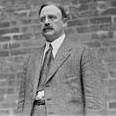
On Jan. 1, 1918 Dem. Tammany Hall candidate John Francis Hylan (1868-1936) (former railroad engineer) becomes New York City mayor #96 (until Dec. 31, 1924), fighting to keep subway rates at 5 cents and launching the Independent Subway System, giving a famous speech against "the interests" in 1922, with the soundbyte: "The real menace of our Republic is the invisible government, which like a giant octopus sprawls its slimy legs over our cities, states and nation. To depart from mere generalizations, let me say that at the head of this octopus are the Rockefeller–Standard Oil interests and a small group of powerful banking houses generally referred to as the international bankers. The little coterie of powerful international bankers virtually run the United States government for their own selfish purposes. They practically control both parties, write political platforms, make catspaws of party leaders, use the leading men of private organizations, and resort to every device to place in nomination for high public office only such candidates as will be amenable to the dictates of corrupt big business. These international bankers and Rockefeller–Standard Oil interests control the majority of the newspapers and magazines in this country. They use the columns of these papers to club into submission or drive out of office public officials who refuse to do the bidding of the powerful corrupt cliques which compose the invisible government. It operates under cover of a self-created screen [and] seizes our executive officers, legislative bodies, schools, courts, newspapers and every agency created for the public protection"; the Dan Quayle of his day, with a rep for missing some cylinders (banker agitprop?), his successor Jimmy Walker appoints him judge of the Queens Children Court, with the soundbyte: "The children can now be tried by their peer."

The origin of the Ponzi scheme - 50% profit in 45 days? In summer 1920 after receiving $15M in small investments in the past two years from 40K Bostonians, mostly poor people raiding their mattresses, and living like a king with fancy clothes, cigars, and nubile young sexretary Lucy Meli, the phony Internat. Postal Union coupon empire of slick-talking 5'2" Italian immigrant Charles (Carlo) K. Ponzi (1882-1949) begins to crash, and after blue collar investors swarm his Pie Alley office in Boston, he is arrested on Aug. 15; $2M is found to be missing, and Ponzi declared bankrupt still owing 10.5K creditors $4.3M; he is sentenced to five years in federal prison in Plymouth, Mass., and deported to Italy in 1934, where he tries to defraud Mussolini, finally dying in a charity ward in Rio de Janeiro, Brazil.


In 1920 the Lucis Trust (originally Lucifer?) is founded in New York City by Manchester, England-born Am. Theosophist Alice Ann Bailey (Alice LaTrobe Bateman) (1880-1949) to pub. spiritualist and esoteric books; in 1932 it founds the World Goodwill Group, which obtains recognition as a non-govt. org. (NGO) by the U.N., causing conspiracy theorists to accuse the latter of Satanic New Age connections; members incl. David Rockefeller, Henry Kissinger, Paul Volcker, and George Schultz? In 1922 after beginning to channel the Ageless Wisdom of Tibetan ascended master D.K. (Djwal Khul) in 1919, Bailey pub. Initiation, Human and Solar, followed by Letters on Occult Meditation (1922), A Treatise on Cosmic Fire (1925), The Light of the Soul: Its Science and Effect: A Paraphrase of the Yoga Sutras of Patanjali (1927), A Treatise on White Magic; or, The Way of the Disciple (1934), Discipleship in the New Age (2 vols.) (1944), The Problems of Humanity (1944), The Reappearance of the Christ (1947), The Destiny of the Nations (1949), Glamour: A World Problem (1950), Education in the New Age (1954). In 1936-60 A Treatise on the Seven Rays (5 vols.) is pub., expounding her theory of Esoteric Astrology. In 1937 she pub. The Great Invocation, which begins: "From the point of Light within the Mind of God, let light stream forth into the minds of men", which is later adopted by the Findhorn Foundation. She becomes known for peddling Tibetan disciple Djwal Khul, first channeled by Madame Blavatsky, and the teaching that St. Germain (AKA Master Rakoczi or Master R.) (the resurrected Sir Francis Bacon) will be chmn. of the Executive Council of Christ, who will return and stay and bring world peace for the entire 2,150-year period of the Age of Aquarius; too bad, she claims that Christ will return in an airplane on global TV, I think Neil Armstrong beat him to it.
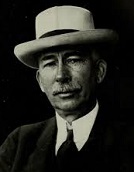
Big date for conspiracy theorists? On July 29, 1921 the Council on Foreign Relations (CFR) is founded in Washington D.C. by Col. Edward Mandell House (1858-1938), chief advisor to Pres. Wilson as the U.S. counterpart of the English Royal Inst. of Internat. Affairs; it pub. the bi-monthly journal Foreign Affairs, becoming influential in high places - the Illuminati conspiracy?
In 1921 Bank Hapoalim is founded in Tel Aviv by the World Zionist Org. and the Histadrug trade union congress (Gen. Federation of Laborers in the Land of Israel); it goes on to become Israel's largest bank.
In 1921 Nesta H. Webster pub. World Revolution, which links Communism with Jews, Freemasonry, the Illuminati et al., causing a sensation.
On Dec. 18, 1922 (10:30 a.m.) a Federal Reserve truck parked at a loading dock of the Denver Mint near the State Capitol in Denver, Colo. (W. Colfax Ave. and Delaware St.) is robbed of $200K in $5 bills by five men in a black Buick touring car carrying shotguns, killing guard Charles Linton; on Jan. 14 their car is found in a garage nearby on Gilpin St. in Denver's Capitol Hill, complete with the frozen body of 36-y.-o. Nicholas "Chaw Jimmie" Trainor, who was shot in the jaw by mint guards; on Feb. 17 $80K of the loot is recovered near Minneapolis, Minn., but the case is never solved, although in 1934 police claim that five men and two women were conspirators, but do not release names, claiming they are all dead or in prison already; the case is officially closed on Dec. 1, 1934.
In 1925 Sumitomo Bank is founded in Calif. to service the Japanese immigrant pop.



But if the Jews are inferior, how can they be so dangerous, pass the gefilte fish? On July 1, 1925 Adolf Hitler (1889-1945) pub. his prison memoir Mein Kampf, Vol. 1 (My Fight) (My Struggle) (My Jihad) (My Crap?) in an ed. of 10K copies by Franz Eher of Munich, at 12 marks a copy; 9,473 copies are sold by the end of the year, but sales drop sharply next year; his secy. Rudolf Walter Richard Hess (1894-1987) assisted in its writing; Hess is a student of Gen. Karl Ernst Haushofer (1869-1946), founder of Geopolitik and originator of the idea of Lebensraum; it preaches the John T. Scopes Darwinian inequality of the races, with the color-coded-for-superiority blonde-blue German Aryans at the top, and calls for action against the internat. ratlike hooked-nosed Jewish conspiracy that forever seeks to keep the superior more handsome blonde Aryans from total victory from pole to shining pole, and the elimination of Jewish-inspired liberty, equality, and democracy; "History will ultimately absolve me"; lays out his plan to restore German power after WWI and destroy the internat. Jewish banker conspiracy; claims that he doesn't want to take on Britain because its world empire makes them interbreed with inferior races, but wishes to share world rule with them (as the new Charlemagne?); his own version of Muhammad's Quran? - he saved a lot of people, but the good die young? On Dec. 10, 1926 Hitler pub. Mein Kampf, Vol. 2 - I guess you're right?

In 1926 White Russian loyalist gen. (exiled in the U.S.) Count Arthur Cherep-Spiridovich (1858-1926) pub. Secret World Government; or, The Hidden Hand, becoming the granddaddy of Jewish-Rothschild conspiracy theory textbooks; backed financially by Henry Ford; "This book is about the Jews; it is not against the Jews."
On Feb. 25, 1927 Pres. Coolidge signs the U.S. McFadden Act, prohibiting interstate branch banking but allowing nat. banks to open branches in HQ cities if permitted by state law.

Hey there, it's me, up on the roof of your car? In Mar. 1928 the Sunni Muslim Brotherhood (al-Ikhwan a-Muslimun) is founded in Ismailia, Egypt by six Suez Canal Co. workers led by schoolteacher Hassan al-Banna (1906-49), launching the Islamic radicalism movement that becomes so much fun by 9/11; al-Banna also founds Islamic banking as a way to subvert the Western banking system; the HQ is moved to Cairo in 1932, becoming openly anti-British and anti-Zionist, then going violent by the 1940s.
On May 13, 1927 (Fri.) Black Friday sees the Berlin Stock Exchange crashe and the German economy collapse; on June 20-Aug. 4 the Geneva Conference is attended by 52 nations to discuss what happened.
In 1929 Nat. City Bank of New York becomes the world's largest commercial bank.
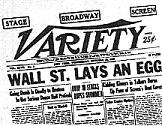
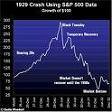


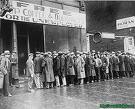

On Oct. 24, 1929 (Thurs.) Black Thursday is the beginning of the U.S. stock market crash, with 12,894,650 shares traded; the real fun starts next Tues. On Oct. 28 (Mon.) Black Monday sees 9M shares traded as prices continue to fall. Down on the corner, out in the street? Black Tuesday drops a bomb on the world? On Oct. 29 (Tues.) after a small temporary drop on Mar. 26, followed by a "golden summer" when the NYSE sets a record on Sept. 19 (Thur.), the huge WWI war debt finally catches up with the world as Black Tuesday descends upon the New York Stock Exchange, which crashes as 16M shares are traded, causing thousands of investors to be wiped out amid panic selling, leading the Fed to begin tightening credit, followed by a worldwide Great Depression; stock prices reach their lowest point on Nov. 13 (Wed.), falling from an avg. of 311.90 in Sept. to 164.43; industrial avgs. fall from 469.49 to 220.95 (a total of $30B in listed stock value wiped out in the NYSE); the Oct. 30 issue of Variety carries the title "Wall Street Lays An Egg"; part of the blame for the panic goes to the slowness of mechanical stock tickers; Jewish financier Bernard Mannes Baruch (1870-1965) brings Winston Churchill to personally view the NYSE on Oct. 24, fueling the speculations of conspiracy theorists, esp. after Baruch later becomes the person to coin the term "Cold War"?; gasoline, which costs 21.4 cents a gal. this year in the U.S. begins its own crash, not recovering to this level until 1947, after which it holds at 27 cents from 1949-52; Pres. Hoover attempts to take a leadership role with business and labor to smooth the nation over "rough spots", but fails to ask Congress for major legislation, allowing the latter to put the blame on him later, even though they proposed no new legislation either?
On May 17, 1930 the Bank for Internat. Settlements is founded to facilitate German reparations for WWI, becoming the world's oldest internat. financial org. and growing into a bank for central banks that's part of the sinister internat. banker OWG conspiracy?
We're giving everyday people a smoot at hauling to Hooverville? On June 17, 1930 the U.S. Hawley-Smoot Tariff Act is signed by Pres. Hoover, raising U.S. tariffs to the highest level in U.S. history (until ?) in an effort to alleviate the Great Depression; too bad, retaliation by foreign govts. reduces U.S. imports and exports, intensifying it.
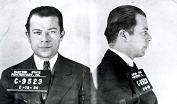
In June 1931 bank robber William "Slick Willie" Sutton (1901-80) (prefers the name Bill) is captured and given a 30-year sentence, but escapes on Dec. 11, 1932, going on to rob a total of 100 banks before his Feb. 1952 capture.
By Sept. 1931 the U.S. and France own 75% of the world's gold; on Sept. 21 the British Commonwealth (except Canada), followed by several other countries go off the gold standard (Japan in Dec.); the British pound sterling falls from $4.86 to $3.49.
On Feb. 27, 1932 after 12K pages of transcripts are submitted by FDR's special Pecora Commission, led by investigator Ferdinand J. Pecora (1882-971) (an immigrant to New York City from Sicily), chief counsel to the U.S. Senate Committee on Banking and Currency, the U.S. Glass-Steagall Banking Act is signed by Pres. Hoover, attempting to prevent another depression by drawing a line between investment and commercial banking, increasing the amount of credit Federal Reserve Banks can extend, allowing commercial paper to be used as a reserve; repealed in 1999. On July 22, 1932 the U.S. Congress passes the U.S. Federal Home Loan Bank Act to promote home ownership, establishing the Federal Home Loan Bank System, the Federal Home Loan Bank Board (FHLBB), and 12 Federal Home Loan Banks (FHLB).





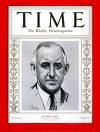

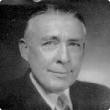


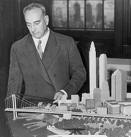


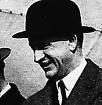



FDR begins his Hundred Days as Hitler begins his March Revolution and America begins its Anti-Alcohol Experiment? Sounds like a setup to divert the American public to fact that they're being Socialized? By early Mar. 1933 there are 13M unemployed in the U.S., and almost every bank is closed - hurry up Adolf and start a war? On Mar. 4, 1933 Hyde Park, N.Y.-born Franklin Delano Roosevelt (1882-1945) (FDR) (pr. to rhyme with rose, although his 5th cousin Teddy Roosevelt's side of the house pronounces it to rhyme with roof) becomes the 32nd U.S. pres. (until Apr. 12, 1945) in the 43rd U.S. Pres. Inauguration (first disabled pres.) (C student at Harvard U.) (4th N.Y. state gov. after Teddy Roosevelt, Grover Cleveland, and Martin Van Buren, most of any state until ?); Red River County, Tex.-born John Nance "Cactus Jack" Garner IV (1868-1967) becomes the 32nd U.S. vice-pres.; Gen. Douglas MacArthur is the grand marshal of the inaugural parade; First Lady Anna Eleanor Roosevelt Roosevelt (1884-1962) is a cigarette smoker; Stephen Tyree Early (1889-1951) becomes the first White House press secy. (until 1950); Herbert Hoover lives a record 31 years, 231 days after leaving office; FDR's First Inaugural Address announces his Good Neighbor Policy of respect for Latin Am. countries, with the soundbyte "In the field of world policy I would dedicate this nation to the policy of the good neighbor, the neighbor who resolutely respects himself and, because he does so, respects the rights of others"; Damon Runyon writes the lead article on FDR's inauguration; Penn.-born Repub. railroad freight car manufacturer and coin collector William Hartman Woodin (1868-1934) becomes U.S. treasury secy., going on to implement bank holidays and take the U.S. off the gold standard, resigning on Dec. 31 due to poor health; FDR gives his campaign Brain Trust of liberal profs. positions in his admin. to jumpstart the ailing nation's economy by redistributing the wealth, incl. Raymond Charles Moley (1886-1975) (Columbia U. law prof. who invented the term "New Deal", and claims that with FDR capitalism was "saved in eight days", then breaks with him by midyear and becomes a conservative Repub. and bitter foe), Harvard Am. history prof. William Yandell Elliott (1896-1979) (later the mentor of Henry Kissinger), Adolf Augustus Berle Jr. (1895-1971) (pr. like burley), and Rexford Guy Tugwell (1891-1979) (agricultural economist, who is appointed gov. of Puerto Rico in 1941-6); Dem. Nat. Committee chmn. (since 1929) Jouett Shouse (1879-1968), hubby of Filene Dept. Store heiress Catherine Filene Dodd, who supported Alfred E. Smith over FDR, flip-flops and becomes pres. of the Assoc. Against the Prohibition Amendment, hastening the repeal of prohibition later in the year; meanwhile super-educated N.Y. construction czar (since the 1920s) Robert Moses (1888-1981) is given a blank check for construction projects in the New York City area, with 80K people working for him building large numbers of playgrounds and swimming pools, the Triborough Bridge, Brooklyn Battery Bridge et al., then attracting the U.N. to build its HQ in Manhattan instead of Philly, his power continuing through the 1940s, 1950s, and 1960s, during which he develops a love affair for highways. On Mar. 6 the (66 + 6 + 1)? 73rd Congress (ends Jan. 3, 1935) (elected with him in Nov. 1932 and not scheduled to meet until this Dec.) begins a special session to deal with the nat. emergency of the Great Depression (a term he prefers to "panic"), beginning his Hundred Days (Mar. 9-June 16) of sweeping alphabet-soup "New Deal" legislation, which forever half-socializes the U.S. (the special session actually lasts 7.5 mo.); Frances Coralie Perkins (1882-1965) becomes the first woman to hold a U.S. cabinet-level position as U.S. labor secy. #4 (until 1945); U.S. Sen. (D-Tenn.) Cordell Hull (1871-1955) (author of the 1913 Federal income tax law) becomes U.S. secy. of state (until 1944), with Sumner Welles (1892-1961) as undersecy. (until 1943); former Progressive Party and Repub. Party thorn-in-the-side liberal Harold LeClaire Ickes (1874-1952) becomes secy. of the interior and admin. of public works, going on to disburse $3.3B of New Deal public works funds; Iowa State College grad. Henry Agard Wallace (1888-1965), ed. (since 1910) of Wallaces' Farmer (founded 1898) becomes agriculture secy. #11 (until 1940); William Christian Bullitt Jr. (1891-1967) (voted most brilliant in his 1913 Yale U. class) is appointed as the first U.S. ambassador to the Soviet Union (until 1936); FDR becomes the right man at the right time as he puts on a big act that he's solving the nation's problems while resisting calls to become a dictator?
On Mar. 6-9, 1933 after six states declare bank holidays on Mar. 1, and he proclaims a 10-bank holiday on Mar. 5, FDR declares a Nat. Bank Holiday, closing every bank in the U.S. until bank examiners can determine whether they are sound enough to reopen, giving depositors confidence; on Mar. 12 FDR gives his first fireside chat, On the Bank Crisis; on Mar. 13 banks begin to reopen, and most people decide to leave their money in them.
One World Government fans watch with glee as the citizens of the U.S. are robbed by their own government? On Apr. 5, 1933 U.S. Pres. Roosevelt commands all U.S. citizens to surrender their gold to the govt. at just $20.67 an oz. or face a 10-year prison sentence, then later devalues the dollar 40% by raising the price of gold to $35 an oz.; on Apr. 19 the U.S. goes off the gold standard; 445.5K golden Double Eagle coins minted this year are withheld from circulation and melted down, but a handful survive and become some of the most sought-after coins by collectors; on June 5 Congress voids all gold clauses in public and private debts. On June 12-July 27 the London Monetary and Economic Conference ends in failure, causing Britain to go economically nationalist, promoting a "Buy British" campaign, and setting up an exchange equalization fund to control foreign exchanges, helping a slow recovery along.
A mini-666 moment with 6-16-33? On June 16, 1933 the U.S. Banking Act of 1933 (Second Glass-Steagall Act) is signed by FDR, prohibiting interest payments for checking accounts, separating commercial and investment banking, and creating the Federal Deposit Insurance Corp. (FDIC) (effective Jan. 1, 1934) - it works until 2008, then what happened?





On Oct. 12, 1933 Indianapolis, Ind.-born bank robber John Herbert Dillinger (1903-34) escapes from a jail in Allen County, Ohio with the help of his gang, killing sheriff Jesse Sarber. On Apr. 23, 1934 the John Dillinger Gang is ambushed by federal agents at the Little Bohemia Lodge 50 mi. N of Rhinelander, Wisc., but escapes after they bungle it; special agent W. Carter Baum (b. 1904) is killed in the woods by psychopathic 5'4" George "Baby Face" Nelson (Lester Joseph Gillis) (1908-34), who escaped from the state pen in Joliet, Ill. on Feb. 17, 1932 while doing 1-to-life for robbery; two other agents are wounded, all embarrassing J. Edgar Hoover, who is later relieved by the whitewash in the 1935 James Cagney movie "G Men". On July 22, 1934 (eve.) (his birthday) after being named the first Public Enemy No. 1, and despite a painful but ineffective plastic surgery, John Dillinger (b. 1903) is killed (assassinated?) by 19 FBI agents and a bunch of local cops outside the Biograph Theater in Chicago, Ill. after being betrayed by the "Woman in Red" Anna Sage (1892-1969) (actually wearing an orange skirt) (a Romanian madame facing deportation on a morals charge, who is deported anyway); fans dip handkerchiefs in his blood at the death scene; he is buried under 5 ft. of cement and steel to deter souvenir seekers in Crown Point, Ind., in the same cemetery as Pres. Benjamin Harrison; he had just seen the 1934 movie Manhattan Melodrama, starring William Powell, Clark Gable, and Myrna Loy; future Conn. Dem. Sen. (1959-71) Thomas Joseph Dodd (1907-71) participates in the trap as an FBI special agent.

A bad year for U.S. outlaws, or, My Bonnie lies over the crankcase? On May 23, 1934 flamboyant Texas outlaws Bonnie Parker (b. 1910) and Clyde Chestnut Barrow (b. 1909), AKA Bonnie and Clyde are shot to death in their stolen Ford Deluxe in a 6-man police ambush in Biensville Parish 7 mi. from Gibsland, La. (future site of the Bonnie and Clyde Ambush Museum), ending their 2-year crime spree in a hail of 100+ bullets; Bonnie is shot 23x, Clyde 25x; license plates from Ill., Ind., Iowa, Kans., La., Mo., Ohio, and Tex. are found in the car.

On June 6, 1934 the U.S. Securities Exchange Act is passed, providing for regulation of securities exchanges, overseeing security markets, providing financial disclosure to stockholders and investors, and establishing the Securities and Exchange Commission (SEC), with Joseph Patrick Kennedy Sr. (1888-1969) as chmn. #1.
On Aug. 14, 1935 Pres. Roosevelt signs the U.S. Social Security Act, providing income to retired workers age 65 and older, containing both a social insurance and public assistance component, with the stated hope that as it becomes operative the need for welfare will disappear; it also creates Aid to Dependent Children (ADC), which ends up turning into a full-blown welfare system; the first payroll tax contributions are to begin in 1937, and the first benefits are to be paid in 1940; U.S. labor secy. Frances Perkins, who was deeply involved in the creation of the system stands directly behind the pres. during the signing ceremony in Washington, D.C.; Benjamin Cardozo writes the majority Supreme Court Opinion Upholding the Social Security Act. On Aug. 23, 1935 Pres. Roosevelt signs the U.S. Banking Act of 1935, permanently establishing the Federal Deposit Insurance Corp. (FDIC) and expanding the power of the Federal Reserve System, insuring bank accounts up to $5K.
In 1936 the Nat. City Bank of New York becomes the first bank in New York City to offer consumer checking accounts with a no-minimum-balance requirement.



On Sept. 1, 1939 - Sept. 2, 1945 the horrific $3.5T World War II resulted in 24M military and 49M civilian deaths, and featured the low point of the Jewish Holocaust (Shoah) by the German Nazis, I guess it was the Jews' fault for not ransoming themselves to go to Israel before they could round them up for the camps. The whole experience turned Jews from lovers into fighters, ramping up the Zionist movement with full world sympathy and support by new world superpower U.S., which had its own guilt trip because on Nov. 24, 1942 Budapest-born Am. Zionist leader Rabbi Stephen Samuel Wise (1874-1949) announced in a press conference in Washington, D.C. that he was authorized by the U.S. State Dept. to confirm that the Nazis had murdered 2M Jews as part of a plan to exterminate all Jews in Europe; too bad, the nat. newspapers didn't consider it front page news, and the U.S. govt. did nada. After the war ended and Americans toured the concentration camps in horror, Polish-born Jewish scholar Raphael Lemkin (1900-59), who single-handedly led an unsuccessful campaign to get the League of Nations to give internat. protections against genocide starting in 1933 finally got what he wanted after his own people got it, namely the Dec. 9, 1948 U.N. Convention on the Prevention and Punishment of the Crime of Genocide (Gen. Assembly Resolution 260), which didn't come in force until Jan. 12, 1951, and which the U.S. still didn't ratify until 1988.


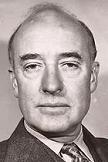
On Oct. 20, 1942 the assets of Union Bank in New York City are seized by the U.S. govt. under the U.S. Trading With the Enemy Act after an FBI investigation proves they are financing Nazi iron and explosives through Nazi front Freidrich "Fritz" Thyssen (1873-1951); Prescott Sheldon Bush (1895-1972), father of future pres. George H.W. Bush is the dir. and a shareholder, along with E. Roland "Bunny" Harriman (1895-1978), brother of W. Averell Harriman; on Nov. 17 the assets of the Silesian-Am. Corp. are also seized.
On May 9, 1944 Operation Graffham sees the Allies cause Norwegian stocks on the Swedish Stock Exchange to rise by 20% to fool the Germans into thinking that there will be a big Allied landing there.
On July 1-22, 1944 the Internat. Bank for Reconstruction and Development (World Bank) and the Internat. Monetary Fund (IMF) are created at a 44-nation conference at Bretton Woods, N.H., originally designed to create fixed internat. exchange rates in the face of the collapse of the old gold standard; the net result is that the U.S. uses its position as victor in WWII to force other nations to let it pay for its trade deficits in either gold or dollars, while other nations can only pay for their deficits with gold or with dollars previously acquired in the course of trade with the U.S. or other nations, which Charles de Gaulle later calls "an exorbitant privilege".
On Dec. 27, 1945 28 nations sign an agreement creating the World Bank, AKA the Internat. Monetary Fund (IMF) and the Internat. Bank for Reconstruction and Development, with authorized share capital of $27B.



In 1946 Paris, France-born Harvard business School prof. Georges Frederic Doriot (1899-1987) ("Father of Venture Capitalism"), MIT pres. (1930-48) Karl Taylor Compton (1887-1954), and U.S. Sen. (R-Vt.) (1946-59) Ralph Edward Flanders (1880-1970) found Am. Research and Development Corp., becoming the first modern publicly-owned venture capital firm; in 1957 they invest $70K in Digital Equipment Corp. (DEC), which turns into $355M when it goes public in 1968, becoming their first big success.
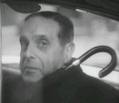
In 1946 German-born Jewish financier Siegmund George Warburg (1902-82) of the German Jewish Warburg Family founds S.G. Warburg & Co. in London, working with Euro financiers to intertwine the financies of all Euro countries so intimately that if democracy ever breaks down again and a dictatorship arises, they will be starved?

On Apr. 16, 1947 Jewish financier Bernard Mannes Baruch (1870-1965) coins the term "Cold War" during a speech to the S.C. House of Reps.
In Apr. 1947 the Gen. Agreement on Tariffs and Trade (GATT) convention begins meeting in Geneva in parallel to the meetings to create the Internat. Trade Org. (ITO), and on Oct. 30 eight countries sign a provisional agreement, followed next Jan. 1 by 23 nations signing the full agreement at the Palais de Nations in Geneva; 100+ countries eventually sign it, agreeing to 45K tariff concessions worth $10B; after opposition in Congress, Pres. Truman never submits it; the next GATT round is held in Apr. 1949; in 1994 GATT is replaced by the World Trade Org. (WTO) after eight rounds of meetings - why do tariffs come before trade?

In 1949 Boston, Mass.-born historian Carroll Quigley (1910-77) writes The Anglo-American Establishment: From Rhodes to Cliveden, which is posth. pub. in 1981; it claims that Cecil Rhodes and Alfred Milner founded the secret Society of the Elect and Assoc. of Helpers in 1891 to rule the world in the name of the white race. In 1966 he pub. Tragedy and Hope: A History of the World in Our Time, about how a secret OWG govt. is corrupting the world.
On Feb. 8, 1950 the first payment is made via a Diners Club credit card in New York City by Frank McNamara at Major's Cabin Grill, becoming the first-ever use of a charge card ("the First Supper").
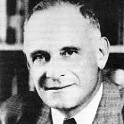
On Feb. 17, 1950 German-born Jewish-Am. banker (Council on Foreign Relations member) James Paul Warburg (1896-1969), son of CFR founder Paul Warburg testifies before the U.S. Senate Foreign Relations Committee, uttering the soundbyte: "We shall have world government whether or not you like it, by conquest or consent"; on Nov. 25, 1959 the CFR pub. Study No. 7, a plan to bring about a NWO via manipulation of U.S. foreign policy and internat. economic interdependence.

In 1952 Roanoke, Va.-born Eustace Clarence Mullins Jr. (1923-2010) pub. Mullins on the Federal Reserve; repub. in 1983 as "The Secrets of the Federal Reserve"; a visit with Ezra Pound in 1949 starts him on a quest to trace out a gigantic internat. conspiracy of Jewish bankers, making him a top conspiracy theorist.
In 1953 the Am. Stock Exchange is created by a renaming of the New York Curb Exchange (founded 1908), whose members stopped trading from curbs in 1921. Also in 1953 the London Stock Exchange opens public galleries; "My word is my bond."
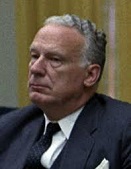
On May 29-31, 1954 in order to deal with growing anti-Americanism in W Europe, the Bilderberg Group (Conference) (Club) holds its first annual closed invitation-only conference in the Hotel de Bilderberg near Arnhem, Netherlands of guests who are influential in politics, banking, the military and the media, with two from each nation, one conservative and one liberal, starting with 50 delegates from 11 W European countries and 11 Americans, eventually growing to 130 attendees; founders incl. Polish politician Jozef Retinger, Dutch prince Bernhard, Belgian PM Paul Van Zeeland (head of Unilever), and Charles Douglas Jackson of the U.S.; U.S. diplomat George Wildman Ball (1909-94) becomes an early U.S. member, attending every meeting.
On Sept. 11, 1955 Pres. and Mrs. Eisenhower dedicate the new pulpit of the Corona Presbyterian Church at E. 8th Ave. and Downing St. in Denver, Colo.; on Sept. 24 Pres. Eisenhower suffers a massive heart attack two hours after midnight in his mother-in-law's home at 750 Lafayette St. in Denver after visiting banker Aksel Nielsen at the Byers Peak Ranch outside Denver, followed by Lowry AFB, then Cherry Hills Golf Course, where he had hamburgers with raw onions for lunch, which he claimed gave him chest pains; he is taken to Fitzsimons Hospital outside Denver; on Sept. 26 (Mon.) the New York Stock Exchange suffers its worst decline since 1929 ($12B) (down to 444.56) when word is released concerning his condition, but news from his physician Dr. Paul Dudley White that he can return to work in two weeks causes the market to rebound on Sept. 27.
In 1955 the Nat. City Bank of New York becomes First Nat. City Bank of New York.
On May 9, 1956 the U.S. Bank Holding Act establishes regulations for bank holding cos. purchasing banks, prohibiting interstate bank purchases and non-banking activities.


On Mar. 25, 1957 the Treaty of Rome, signed by "The Six" (Belgium, France, Germany, Italy, Luxembourg, Netherlands) establishes the Common Market, AKA the European Economic Community (EEC), which evolves by the end of the cent. into the European Union (EU), with its four freedoms being freedom from fear, er, freedom of movement of goods, services, capital, and labor, allowing the creation of a Euro-wide police state, causing Illuminati conspiracy theorists, Bible-thumpers et al. to shake their rattles; the original idea came from French businessman Jean Monnet (1888-1979) in 1943, and was developed by Belgian PM Paul-Henri Spaak (1899-1972).
On Oct. 1, 1958 Am. Express begins issuing credit cards, becoming the first widely accepted plastic credit card.

In 1960 Armenian-Am. inventor Luther George Simjian (1905-97) patents the Bankograph, which is installed in lobbies of the First Nat. City Bank of New York City (later Citibank), allowing customers to deposit checks or cash and receive a photo receipt., becoming the first automatic teller machine (ATM); in 1968 Deibold & Co. of Canton, Ohio begins manufacturing them.
In Feb. 1961 the first Certificate of Deposits (CDs), paying a higher rate than savings accounts are offered by First Nat. City Bank of New York; initially they are only offered to corps. in denominations of $100K and up, but eventually they are opened to individuals at denominations as small as $500. In 1966 they introduce Dollar Certificates of Deposit in London, becoming the first new negotiable instrument in that market since 1888. In 1967 they introduce their first credit card, called First Nat. City Charge Service AKA the Everything Card.
On Feb. 9, 1962 the Taiwan Stock Exchange Corp. opens.
On May 20, 1963 the U.S. Supreme Court rules 7-2 in Silver v. New York Stock Exchange that the New York Stock Exchange is not immune to antitrust laws, but does not say if it is liable for monopolistic practices to the same extent as private corporations.
On Sept. 10, 1963 Am. Express launches its first credit cards in the U.K.
In 1963 the Mit Ghamr Savings Bank is founded in Egypt by the Muslim Brotherhood and economist Ahmad Elnaggar (El Najjar), implementing Sharia banking; in 1968 the Egyptian govt. shuts it down after Muslim Brotherhood-led demonstrations.
In 1965 there are 5M credit cards in circulation in the U.S.; by 1996 it grows to 1.4B.



In 1967 Abbie Hoffman (1936-89), Jerry Rubin (1938-94) and their Yippie (Youth Internat. Party) Party (a yippie is a hippie who has "been hit over the head by a cop" - Hoffman), incl. actress Candice Bergen (1946-) toss fistfuls of dollar bills onto the floor of the N.Y. Stock Exchange, causing a pig show, after which plexiglas screens are installed to prevent a repeat - hold on, hold on to what you got?


On Feb. 29, 1968 after getting pissed-off at the Tet Offensive, U.S. defense secy. (since 1961) Robert Strange McNamara (1916-2009) resigns to become pres. of the World Bank (until 1981), and on Mar. 1 is succeeded by Kan.-born Clark Clifford (1906-98), who becomes U.S. defense secy. #9 (until Jan. 20, 1969), working to extricate the U.S. from that "wretched conflict in Vietnam".
On May 29, 1968 the U.S. Consumer Credit Protection (Truth in Lending) Act is passed, requiring banks to state the true interest on loans, and protecting employees from being fired for having their wages garnished - leave it to them to come up with credit cards and long contracts with extra charges buried in tiny print?
In 1968 Stephen A. Benton (1941-2003) of the U.S. invents the white light Rainbow Hologram, which can be embossed on a credit card and shows a 3-D image in ordinary light.
On Feb. 13, 1969 FLQ terrorists bomb the Montreal Stock Exchange in Canada.
In 1969 the Interbank Card Assoc. is formed in the U.S. by several banks, led by Marine Midland Bank of N.Y., issuing Master Charge credit cards, which become the main rival to BankAmericard in 1979 they change the name to MasterCard after BankAmerica changes its name to Visa in 1977; too bad, they get off to a bad start as Master Charge cards are mailed to 5M names in the Chicago area before Christmas, incl. to criminals, causing massive credit card fraud, after which the U.S. Congress holds hearings next year to decide if they should be outlawed; meanwhile there are 2M BankAmericard holders and 64K merchant outlets; next year there are 5.7M Master Charge card holders who charge $312M total, growing to 40M holders who charge $13.5B.
In Mar. 1970 the First Islamic Summit Conference of the new Org. of the Islamic Conference (OIC) is held; by 1999 it reaches 55 member states; in 1973 the Islamic Development Bank in Jedda, Saudi Arabia is founded by the OIC, opening for business on Oct. 20, 1975 with backing by King Faisal.
On June 10, 1970 after the price of gold on the free market falls below the official U.S. price of $35 an oz., giving Tricky Dicky Nixon an idea, and he proposes it to Congress, the new U.S. Office of Management and Budget (OMB) replaces the Bureau of the Budget, with the responsibility of devising and submitting the president's annual budget proposal to Congress; on July 1 U.S. labor secy. George Pratt Shultz (1920-) (son of Am. Internat. Corp. dir. Birl Shultz) becomes the new dir. (until June 11, 1972), going on to urge treasury secy. John B. Connally to remove the U.S. from the gold standard, then take his job; meanwhile he grooms his future protege Condoleezza Rice.
On Dec. 31, 1970 the U.S. Congress passes the U.S. Bank Holding Co. Act (BHCA) Amendments, clarifying the 1956 BHCA, requiring the Federal Reserve Board to regulate bank holding cos. and establishing permissible and non-permissible non-bank activities.
On Jan. 19, 1971 after being proposed by Pres. Nixon in 1969, the Overseas Private Investment Corp. (OPIC) is established to advance U.S. foreign policy by financing projects incl. the $200M Project Salavador solar plant in Chile.
On Feb. 15, 1971 after 1.2K years Britain decimalizes its coinage, changing the pound sterling from 20 shillings (bob) to 100 new pence, and demonetizing the penny, sixpence, and threepence coins, along with the shilling (12 pence), guinea, and sovereign (20 shillings), crown (5 shillings), and half-crown; the new 5-pence coin has the same size and weight as a shilling and also becomes known as a bob; the gold sovereign (first minted in 1489) continues to be minted (until ?). On Apr. 1, 1971 Britain lifts all restrictions on gold ownership. In July 1971 U.S. gold stocks drop below $10B for the 1st time since the 1940s.


On Aug. 15, 1971 after deciding that inflation is uncontrollable without his divine intervention, and noting that the U.S. is running its first trade deficit this year since 1888 ($2.05B), and taking the advice of U.S. treasury secy. John Connolly that as a temporary measure it might help insure his reelection, U.S. pres. (1969-74) Richard Milhous Nixon (1913-94) announces his New Economic Policy, AKA the Nixon Shock (along with the 1972 visit to China), incl. a 90-day wage, rent and price freeze (extended for another 1K days), and a 10% "surcharge" (tariff) on imported goods (violating trade agreements), and floats the U.S. dollar, suspending the convertibility of dollars into gold to stop France (which had been stockpiling Federal Reserve Notes since the early 1960s) and other nations from cleaning out Ft. Knox, effectively ending the 1944 Bretton Woods (N.H.) system of fixed internat. currency exchange rates and taking the U.S. off the Gold Standard; foreign exchange markets close; Nixon utters the soundbyte "We are all Keynesians now" (or attempts to quote Milton Friedman's Feb. 4, 1966 statement in Time mag. with the lame version "I am now a Keynsian in economics"); the news causes the Dow Jones to jump a record 32.93 points on a record volume of 31.7M shares; the AFL-CIO announces that it has "absolutely no faith in the ability of President Nixon to successfully manage the economy of this nation", and refuses to cooperate in the wage freeze; too bad, after the surcharge causes the Japanese to have to revalue the yen in Dec., Nixon stops it on Dec. 20 and raises the official gold price, devaluing the dollar by 8.57%, then caves in on tariffs again in the Tokyo Round in 1973, letting the Japanese ramp up their imports, causing U.S. manufacturing to decay; he also guesses wrong about gold, as by 1980 it sells for more than $800 an oz.
On Oct. 23, 1972 access credit cards are introduced in Great Britain.
In July 1973 David Rockefeller and Zbigniew Brzezinski found the Trilateral Commission, with members from the U.S., Western Europe, and Japan to foster a "truly common management" of internat. relations with the U.S. in the lead; Pres. Jimmy Carter is a member, and fills his top admin. posts with more than two dozen members, incl. Brzezinski, Cyrus Vance, and Samuel Huntington.
On Nov. 19, 1973 the New York Stock Exchange (NYSE) takes its sharpest drop in 19 years.
In 1973 the Credit Card Currency Dispenser is patented by Nat. Cash Register (NCR), becoming the first modern ATM; BankAmericard launches it in Mar.; by 1997 there are 425K ATMs in use worldwide.
On Feb. 14, 1974 after closing the Rupee Deal, U.S. ambassador to India (1973-5) Daniel Patrick Moynihan presents a check for 16,640,000,000 rupees to the govt. of India to fund an educational-cultural exchange program, becoming the world's largest check (until ?).
In 1974 BankAmericard has 26M card holders, Master Charge 33M; bank credit cards are used with almost 1M U.S. merchants to finance $13B (2.6% of all retail sales); 3.8% of U.S. consumer debt is credit card debt, with interests rates up to 18% - hello, welcome to the crapezium store?
In 1974 the Nat. Automated Clearing House Assoc. (NACA) is formed, along with the Nat. Automated Clearing House Assoc. (NACHA) to oversee electronic check payments from regional automated clearing houses.
In 1974 First Nat. City Corp. holding co. changes its name to Citicorp, and introduces the floating rate note into the U.S. financial market.

In 1974 French journalist Roland Moreno (1945-) invents the Smart Card, a credit card that stores info. on an IC instead of a magnetic track.

On Oct. 30, 1975 the New York Daily News runs the headline "Ford to City: Drop Dead" a day after he said he would veto any proposed federal bailout of New York City, which is about to default on its bonds despite setting up the Municipal Assistance Corp. (MAC) and the Emergency Financial Control Board (EFCB); on Dec. 8 the House of Reps. by 275-130 passes a $6.9B federal loan ($2.3B a year through June 30, 1978) (proposed by Ford on Nov. 26), and he signs it on Dec. 9; Columbia U. prof. Donna Edna Shalala (1941-) is appointed dir. of MAC to handle the crisis, after which she becomes a darling of the Carter and Clinton admins., esp. because she is Arab-Am.
On Dec. 31, 1975 the U.S. Congress passes the U.S. Home Mortgage Disclosure Act (HMDA), requiring financial institutions to collect loan info., report it to the govt., and make it available to the public.
In 1976 First Nat. City Bank becomes Citibank, N.A. (Nat. Association).
On Oct. 12, 1977 Pres. Carter signs the U.S. Community Reinvestment Act, forbidding "redlining" by banks to discriminate against low-income applications for home mortgage loans, and encouraging investment in local communities.
In 1977 Citibank establishes Citicard Banking Centers, with 24-hour ATMs that are the first that can be used for more than emergency cash.
On Sept. 17, 1978 the U.S. Congress passes the U.S. Internat. Banking Act, delegating regulation and supervision of foreign banks in the U.S. to the Federal Reserve.


On Oct. 27, 1978 the U.S. Humphrey-Hawkins Full Employment and Balanced Growth Act, sponsored by Rep. (D-Calif.) (1963-75) Augustus Freeman "Gus" Hawkins (1907-2007) and Sen. (D-Minn.) (1971-8) Hubert Horatio Humphrey Jr. (1911-78) is signed by Pres. Carter, setting Keynesian nat. goals of full employment, growth in production, price stability, and balance of trade and budget; in practice it requires the chmn. of the Federal Reserve to testify biannually before the Senate Banking Committee.
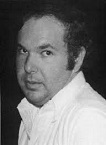
On Nov. 5, 1978 computer consultant Stanley Mark Rifkin (1946-) of San Fernando Valley, Calif. is arrested by the U.S. govt. for using a computer to steal $10.2M from the Security Pacific Bank in Los Angeles after he brags about it to a businessmen who turns fink, becoming the biggest bank robbery in U.S. history (until ?); the bank is unaware of it until the feds inform them; while out on bail Rifkin transfers another $50M illegally and is rearrested; in Mar. 1979 he is convicted and sentenced to 8 years.
On Nov. 6, 1978 the U.S. Bankruptcy Reform Act of 1978 replaces the 1898 Nelson Bankruptcy Act, prohibiting employment discrimination against anyone declaring bankruptcy, and allowing individuals to protect much more of their property; after going into effect on Oct. 1, 1979, U.S. personal bankruptcy filings jump from 209.5K in 1979 to 367K in 1980.
On Nov. 10, 1978 Pres. Carter signs the U.S. Financial Institutions Regulatory and Interest Rate Control Act of 1978, establishing regulations for bank insider transactions and electronic fund transfers, creating the Federal Financial Institutions Examination Council (FFIEC) next Mar. 10.
On Dec. 18, 1978 despite the 1863 Nat. Bank Act not envisioning credit cards, the U.S. Supreme (Burger) Court rules unanimously in Marquette Nat. Bank of Minneapolis v. First Omaha Service Corp. that nationally-chartered banks can charge the highest rate in the bank's home state nationwide, allowing them to bypass state usury laws, causing S.D. to bolt from the other 49 states and quickly eliminate all usury limits to attract the cos., which works bigtime, allowing them to charge unlimited rates if they can get away with it.

In Aug. 1979 Paul Adolph Volcker (1927-) becomes chmn. #12 of the U.S. Federal Reserve Board (until Aug. 11, 1987); on Oct. 6 he increases the discount interest rate by 1% to tighten the money supply, causing the banks to raise their prime loan rate to 14.5% on Oct. 9, after which on Oct. 10 the Dow Jones falls 26.48 points with a record 81.6M share trading as small investors panic, but dramatically reducing the rate of monetary inflation, although the credit crisis sees short-term T-bill rates going to 15.5% next Mar., falling to 7%, then reaching 15.7% by Dec., creating a short recession for Reagan to match the one Carter just had.
On Oct. 29, 1979 (50th anniv. of the Great Stock Market Crash) anti-nuclear protesters try but fail to shut down the New York Stock Exchange (NYSE).

In 1979 Hungarian-Am. Jewish financial wizard George Soros (Gyory Schwartz) (1930-) (Soros means "will soar" in Esperanto) of the Quantum Fund founds the Open Society Fund to finance anti-Communist movements in E Europe, becoming the flagship for a network of Open Society Foundations that give away $5B by 2007 to promote his political agenda, and currently spends $600M a year in 60+ countries, which is only 20% of his $3B yearly income; its agenda allegedly incl. dethroning the U.S. as a world leader with the globalist view that sees it as just another state in the U.N., putting leftists in power, promoting open borders and mass immigration (incl. Muslim), while opposing virtually all post-9/11 nat. security measures, especially the Patriot Act; let's not forget dramatic expansion of social welfare programs and taxes, incl. amnesty for illegal aliens along with benefits; in 2003 Soros founds the "Shadow Democratic Party", which works to get leftist Dems. elected who want to make it go Socialist, esp. Hillary Clinton, but he switches to Barack Obama after meeting with him in Dec. 2006.
On Mar. 31, 1980 Pres. Carter signs the U.S. Depository Institutions Deregulation Act (Banking Deregulation Act), establishing a universal system of banking reserves, and phasing out Regulation Q, removing ceilings on interest paid to small depositors, allowing payment of interest on checking accounts, and deregulating the savings and loan (S&L) industry, authorizing them to issue credit cards et al., leading to a crisis by the end of the decade; Fred Dalton Thompson works as a lobbyist on behalf of the Tenn. Savings and Loan League to get it passed; on Apr. 2 banks raise their prime rate to 20% after the Federal Reserve tightens money; it falls to 12% in Oct. then rises to 21.5% in mid-Dec.
On May 9, 1980 (3:40 p.m.) the Norco Shootout sees five heavily-armed bank robbers rob Security Pacific Bank in Norco, Calif., then shoot it out with deputies, stealing a vehicle and fleeing to San Bernardino County, where they ambush pursuing deputies and continue the shootout; two robbers and one deputy are killed, nine deputies are injured, and 30+ police cars are damaged, plus a police heli; two days later three of the four surving robbers are arrested near the ambush, and sentenced to life without parole - there's a place called Hidden Valley where what?


On May 10, 1981 after a pres. election on Apr. 26 results in a runoff with Valery d'Estaing, Francois Maurice Adrien Marie Mitterrand (1916-96) is elected as the first French Socialist pres. in a surprise upset over d'Estaing and the Gaullist alliance, which has held power since 1958; on May 21 Mitterrand becomes French pres. #21 (until May 17, 1995); the news causes the stock exchange to suspend trading for 48 hours, and extra customs officials to be posted to prevent money and valuables from being smuggled out of the country; not to disappoint, the new govt. runs the printing presses, weakening the franc; on May 22 Socialist Pierre Mauroy (1928-) becomes French PM #8 (until July 17, 1984), going on to reduce the workweek to 39 hours and lower the retirement age to 60 before abandoning Socialism; on June 14-20 nat. assembly elections in France give the Socialists a landslide, after which Mitterrand appoints four Communists to his cabinet and begins an economic austerity program incl. large scale nationalization, devaluation of the franc, and tax hikes for the rich; he goes on to abolish the death penalty and end nuclear tests.

On Aug. 13, 1981 in a ceremony at his Calif. ranch Cielo del Rancho outside Santa Barbara, Pres. Reagan signs the 1981 U.S. Economic Recovery Tax Act (ERTA), AKA the Kemp-Roth Tax Cut, his historic package of supply-side economics legislation, mandating $750B in tax cuts over the next five years (deepest tax and budget cuts in U.S. history), incl. tax incentives for savings and real estate investment as well as deductions for charitable donations, and reductions for estate and gift taxes, as designed by Calif. economist Arthur Betz Laffer (1940-), creator of the well-named (author bets it's a laffer?) Laffer Curve, which predicts an increase in tax revenues after a decrease in tax rates, producing the longest peacetime boom in U.S. history, although low taxes leads to deterioration of infrastructure incl. inner cities, plus massive deficits from foreign borrowing; too bad that the nation is moving into a recession?; in 1980 vice-pres. George H.W. Bush calls it "voodoo economics".
In 1981 Am. Airlines begins their AAdvantage Program for frequent fliers, causing other airlines to follow suit, followed by car rental agencies, hotels, banks, and credit card cos.
On June 19, 1982 "God's Banker" Roberto Calvi (b. 1920), chmn. of Banco Ambrosiano in Italy is found hanging beneath Brackfriars Bridge in London; on July 23 a coroner's jury returns a verdict of suicide; after an independent investigation rules it a murder, five people are acquitted in June 2007.
In 1985 Citibank introduces Direct Access, linking them with PCs in homes and offices; in 1986 they introduce unique touch-screen ATMs in New York City and Hong Kong.
On Oct. 22, 1986 Pres. Reagan signs the U.S. Tax Reform Act (TRA), designed to simplify the income tax code and eliminate tax shelters.

On Feb. 9, 1987 the New York Stock Exchange (NYSE) finally installs a ladies restroom in the Exchange Luncheon Club. On Mar. 24, 1987 ACT-UP, founded by Am. gay novelist-playwright Larry Kramer (1925-) stages its first demonstration at the New York Stock Exchange (NYSE) over the high prices of AZT and the long FDA process for approving drugs; on Mar. 25 the FDA announces a 2-year reduction in the process. On Apr. 9, 1987 the Keating Five, five U.S. senators, incl. Dennis Webster DeConcini (1937-) (D-Ariz.) (1977-95), Alan MacGregor Cranston (1914-2000) (D-Calif.) (1969-93), John Sidney McCain III (1936-2018) (R-Ariz.) (1987-), John Herschel Glenn Jr. (1921-) (R-Ohio) (1974-99), and Donald Wayne "Don" Riegle Jr (1938-) (D-Mich.) (1976-95) meet with federal regulators over the case of savings & loan magnate Charles H. Keating, Jr., who is later indicted on racketeering and fraud charges over his Lincoln Savings and Loan Assoc., which collapses in 1989, costing the U.S. govt. $3B, causing charges of improperly intervening after $1.3 in political contributions by him to them are discovered; in 1991 the Senate Ethics Committee reprimands Cranston, but only finds Glenn and McCain guilty of "poor judgment".
On Oct. 19, 1987 (Mon.) after legislation blocks tax deductions for debt incurred in corporate takeovers, world stock prices collapse on Black Monday, causing a stock market crash as the Dow Jones Industrial Avg. plunges 508 points (22.6% in value) since Oct. 13, representing a total loss of $1T; Hong Kong suffers a 46% decline in Oct.

On Aug. 9, 1989 the Savings and Loan (S&L) Crisis, the failure of 747 S&L assocs. caused by speculation in junk bonds and SW U.S. real estate causes the U.S. Congress to pass the U.S. Financial Institutions Reform, Recovery, and Enforcement Act (FIRREA), creating the Resolution Trust Corp. (RTC), designed by SEC chmn. Richard C. Breeden (1949-) to take over hundreds of failed S&Ls with a total debt of $180B and sell them debt-free to new buyers; it also abolishes the Federal Savings and Loan Insurance Corp. (FSLIC), giving the responsibility of insuring deposits to the Federal Deposit Insurance Corp. (FDIC), and abolishes the Federal Home Loan Bank Board (FHLBB), replacing it with the Federal Housing Finance Board (FHFB) and the Office of Thrift Supervision (OTS); it also creates the Savings Assoc. Insurance Fund (SAIF) and the Bank Insurance Fund (BIF).
On Sept. 14, 1989 seven ACT-UP AIDS activists shut down the New York Stock Exchange for a short time after chaining themselves to a balcony overlooking the floor.
On Oct. 13, 1989 (Black Fri.) the Friday the 13th, 1989 Mini-Crash is caused by the reaction to the failed $6.75B leveraged buyout of United Airlines that caused the junk bond market to collapse; the Dow Jones Industrial Avg. drops 190.58 points (6.91%).
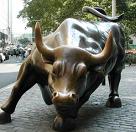
On Dec. 15, 1989 Sicilian-born Am. artist Arturo Di Modica (1960-) installs his $360K Charging Bull Bronze Sculpture in Bowling Green Park in Lower Manhattan, N.Y. in front of the New York Stock Exchange (NYSE) as a Christmas gift to symbolize the "strength and power of the American people" after the 1987 stock market crash.
In 1989 the Warsaw Stock Exchange in Poland opens, becoming the first since 1939; Poland's name is changed from Polish People's Repub. to Polish Repub..
In July 1990 the Iraqi invasion of Kuwait causes oil prices to increase, triggering the 1990-1 U.S. Recession that lasts for 8 mo.
On Dec. 19, 1991 Pres. George H.W. Bush signs the U.S. Federal Deposit Insurance Corp. Improvement Act (FDICIA), increasing the powers of the FDIC and giving it authority to borrow directly from the U.S. Treasury to replenish the Bank Insurance Fund (BIF) and to close failing banks in the most cost-effective manner; it incl. the U.S. Foreign Bank Supervision Enhancement Act (FBSEA), establishing federal stds. for creating foreign banks in the U.S., and authorizing the Federal Reserve Board to supervise and regulate foreign banking operations in the U.S.
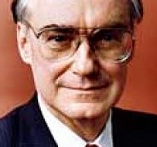
On Nov. 17, 1993 the U.S. House of Reps. passes the North Am. Free Trade Agreement (NAFTA), followed by the U.S. Senate on Nov. 20 as fears that U.S. jobs would go to Mexico are pooh-poohed with even greater fears that unless Mexico's economy improves even more illegal Mexican immigrants will come to the U.S.; Pres. Clinton signs it into law on Dec. 8, to go into effect on Jan. 1; Wall Street Journal ed. Robert Leroy Bartley (1937-2003) supports it, along with a constitutional amendment reading "There shall be open borders", with the soundbyte: "I think the nation-state is finished."
In 1993 Citicorp becomes the largest credit card and charge card issuer and servicer in the world. On Apr. 6, 1998 Citicorp bank and Travelers Group insurance announce their $70B stock swap merger plan, largest in history. On Oct. 8, 1998 all Citicorp and Travelers Group divs. merge to become Citigroup, Inc.
On Apr. 15, 1994 Uruguay Round of GATT meets in Marrakesh Palace in Morocco, attended by reps from 116 nations, lowering tariffs on manufactured goods incl. drugs and electronics while bringing vast new areas of economic activity into the global trading system incl. the service and intellectual products sectors incl. pharmaceuticals, which are protected by the TRIPS (Trade-Related Aspects of Intellectual Property Rights) Agreement; Japan and Korea agree to open their domestic rice markets to imports; the EU agrees to limit subsidies to farmers; the World Trade Org. (WTO) in Geneva is formed effective next Jan. 1, ending the 1947 Gen. Agreement on Tariffs and Trade (GATT) with a new world governing body representing 153 member nations (95% of world trade), meeting every two years; it holds its first round of talks in Doha in Nov. 2001, becoming "a defining moment in modern political and economic history." (Peter Sutherland)
On Sept. 23, 1994 Pres. Clingon, er, Clinton signs the Romulan, er, U.S. Riegle Community Development and Regulatory Improvement Act (RCDRIA), restricting non-bank lenders from abusive lending practices toward low and moderate income homeowners, minorities, and the elderly, and incl. provisions to reduce bank regulatory and paperwork reqts.; on Sept. 29 Pres. Clinton signs the U.S. Riegle-Neal Interstate Banking and Branching Efficiency Act, enabling banks and bank holding cos. to branch across state lines, and permitting interstate bank mergers under certain criteria.
On Aug. 28, 1998 the Hong Kong govt. announces an economic recession, and the Tokyo Stock Exchange ends the week at its lowest level since 1986, losing $241B in stock value.
In May 1999 the U.K. govt. decides to sell 415 tons of it gold reserves, flooding the world market and causing the price to fall to $252 an oz. by Aug., lowest in 20 years, ruining Ashanti Gold Co. in Ghana, 3rd largest gold mining co. in the world and the first black-owned co. on the London Stock Exchange; too bad, they hire Goldman Sachs, who recommends that they purchase huge hedge contracts on gold prices, after which in Sept. 15 Euro banks make a surprise announcement that they will stop selling gold on world markets for five years, causing gold prices to rebound to $362 an oz. by Oct. 6, ruining them with $570M in losses; it later turns out that Goldman Sachs played both ends against the middle.
On Nov. 12, 1999 after greasing by the newly-merged Citigroup and Travelers Insurance conglomerate, Pres. Clinton signs the U.S. Gramm-Leach-Bliley Financial Services Modernization Act (GLBA), repealing parts of the 1933 Glass-Steagall Act, opening up competition among banks, security cos., and insurance cos. by allowing a single institution to offer a combo of investment, commercial banking, and insurance services, and allowing commercial and investment banks to consolidate, incl. Citibank and Travelers Group, which form Citigroup, pioneering the "financial services industry"; too bad, it doesn't give the SEC authority to regular large investment bank holding cos., leading to the Great Credit Meltdown of 2008; U.S. Treasury secy. Robert Rubin, who pushed the bill stepped down in July, then joined CitiGroup in Nov; members of Congress who support the bill receive twice the money from the banking sector than those who oppose it?; within 20 years the time bomb that allows banks to buy up heavy industry starts going off?
On Nov. 29, 1999 the World Trade Org. (WTO) begins a conference in Seattle, Wash., and is rocked by organized 1960s-style protesters, some of whom get violent.
In 1999 the Fiancial Stability Forum (FSF) is founded by the G7 nations, and managed by the Bank for Internat. Settlements in Basel, Switzerland; in 2009 it is superseded by the Financial Stability Board.
In 2000 the Shadow Banking System, incl. hedge funds, money market funds, and structured investment vehicles begins growing dramatically until the 2008 recession.
In 2000-3 the Federal Reserve lowers the federal fund rate from 6.5% to 1%, causing an easy credit financial boom.
On Feb. 11, 2000 a bomb explodes in front of a Barclay's Bank across from the New York Stock Exchange on Wall Street, wounding dozens.
In mid-Apr. 2000 world finance ministers gather in Washington, D.C. for meetings of the IMF and World Bank, and demonstrators block traffic to protest their selling out to the multinational cos. In June 2000 the World Bank agrees to loan Chad $200M to build a $3.7B oil pipeline to Cameroon, to be paid by estimated oil revenues of $80M a year over the next 30 years; to quiet fears of you know what, the World Bank forces Chad to agree to spend 80% of the revenues on social services, becoming a world first; too bad, by 2005 Transparency Internat. lists Hanging Chad as the world's most corrupt country, and in 2006 dictator Idriss Deby proves it by reneging on his deal and using the money to finance his military to keep his grip, causing the loan to be suspended and Chad's bank accounts to be frozen. On Sept. 26, 2000 15K protest globalization in Prague, Czech. during the IMF and World Bank summits.
On Dec. 20, 2000 Pres. Clinton pocket-vetoes the Bankruptcy Reform Act, a cruel law written by credit card cos. and banks that would have made it far more difficult for debtors to obtain bankruptcy protection; never fear, they have big lobbying bucks available, and go on to get it passed under Pres. Bush. On Dec. 21 Pres. Clinton signs the U.S. Commodities Futures Modernization Act, backed by Alan Greenspan, which relegalizes bucket shops and stock market derivatives (side bets by people not owning stock), setting the Stock Market up for the 2008 Liquidity Crisis; "Basically, that law made pure bets, for the first time in Anglo-Saxon legal history, enforceable in court. I always joke that if Congress decided to legalize murder, they'd call the legislation the Homocide Modernization Act." (Lynn Stout)
In 2000 after trying since the late 1980s to get it introduced into Congress in vain, Harvey Francis Barnard (1941-2005) releases his NESARA (Nat. Economic Security and Recovery Act) proposal on the Internet, proposing to replace the income tax with a nat. sales tax, abolish compound interest on secured loans, and return to a bimetallic currency to reduce inflation to 0% and stabilize the economy, after which "Dove of Oneness" Shaini Candace Goodwin (1947-2010), former student of the Ramtha School of Enlightenment claims that the bill was passed in a secret Congressional session in Mar. 2000 and signed by Pres. Clinton, set to be implemented at 10 a.m. on 9/11/2001, and that all the computers and data were stored on the 2nd floor of the WTC and destroyed in the 9/11 attacks ordered by Pres. George W. Bush, who starts the Iraq War as a distraction. According to her, the bill actually passed cancels all personal debts, abolishes the IRS, declares world peace, and mandates new pres. and congressional elections, and is being covered-up by the govt.
In 2000 Vietnam opens the Vietnam Stock Exchange in Ho Chi Minh City, listing two cos. and two bonds; in 2005 it expands to Hanoi, and by 2006 trades 26 stocks and funds with a total capitalization of $3.5B.
On Oct. 24, 2001 the U.S. Congress passes the U.S. Patriot Act (Uniting and Strengthening America by Providing Appropriate Tools Required to Intercept and Obstruct Terrorism Act) "to deter and punish terrorist acts in the United States and around the world"; it incl. a sunset provision under which 15 of the law's provisions expire at the end of 2005; Pres. George W. Bush signs it on Oct. 26; a controversial provision allows govt. access to library and bookstore records, causing fears that it could let them target innocent patriots as terrorists based on what books they check out or buy; in 2010 the FBI is revealed to improperly open investigations into Greenpeace and other anti-war and animal rights groups after 9/11.


Enron execs are caught laying, cheating and skilling? On Dec. 2, 2001 Houston-based energy-trading co. Enron Corp. (originally called Enteron until they discovered it means "intestine"), known for making large contributions to both nat. political parties and being real close to the oil-co.-loving Bush admin. announces that it is filing for bankruptcy; with assets of $63B and 11K employees, it is the largest bankruptcy in U.S. history, and leaves the employees in the lurch even though the execs cash out $500M in stock while lying to Wall St. about the corpse, er, corp.'s health; the corp. HQ in Houston, Tex. is sold for $55.5M; the accounting firm of Arthur Anderson is later convicted of obstructing justice in an SEC investigation; the Creative Accounting Scandal is left to be mopped-up by Congress with the 2002 U.S. McCain-Feingold Act (campaign financing bill) and the 2002 U.S. Corporate Responsibility Act; 16 Enron execs plead guilty to criminal charges, and on July 7, 2004 Ph.D. (Economics) founder Kenneth Lee "Ken" Lay (1942-2006) and CEO Jeffrey Keith "Jeff" Skilling (1953-) are charged with conspiracy and fraud (7 counts for Lay, 31 for Skilling, incl. insider trading); after spending $30M on their defense, their 2006 trial results on May 25 in 6 guilty counts for Lay (165 years possible) and 19 for Skilling (185 years possible); in a separate trial, Lay is found guilty on four counts of personal banking fraud; 3 mo. before his sentencing date he has a heart attack (coronary artery disease) and dies in his Pabst Ranch 20 mi. from Aspen, Colo. on July 5, 2006; too bad, on June 25, 2010 the U.S. Supreme Court guts the Honest Services Law (making it a crime "to deprive another of the intangible right of honest services"), one of the favorite tools of federal prosecutors for pursuing corrupt politicians corp. execs, casting doubt on the convictions.
On July 25, 2002 after a July 10 speech by Pres. Bush on corporate malfeasance, Congress passes the U.S. Corporate Responsibility Act, defining stiff penalties for corporate execs who commit fraud; on July 30 Pres. Bush signs the U.S. Sarbanes-Oxley Act, requiring CEOs to personally certify their books, with a possible criminal penalty of 20 years in prison - that'll stop the problem, right Bernie Madoff?
On Dec. 4, 2003 Pres. Bush signs the U.S. Fair and Accurate Credit Transactions Act (FACTA), which improves the nat. credit reporting system and reduces identity theft, providing consumers with a free copy of their credit report each year if they request ait, allowing them to put a fraud alert on it; businesses must partially conceal credit card numbers on receipts.
On Apr. 28, 2004 five big investment banks incl. Bear Stearns and Goldman Sachs meet with the SEC, asking them to allow them to regulate themselves and determine their own leverage ratio; after the SEC agrees, the Bear Stearns ratio jumps to 33-1.
On Oct. 28, 2004 Pres. Bush signs the U.S. Check Clearing for the 21st Cent. (Check 21) Act, allowing paper checks to be replaced by digital images to facilitate electronic processing.
On Dec. 29, 2004 64-y.-o. William Alfred "Al" Ginglen (1940-) is sentenced to 40 years in prison in Springfield, Ill. for a string of bank robberies after his own sons recognize him in a surveillance photo and turn him in.
On Apr. 12, 2005 a New York City grand jury indicts Dhiran Barot (Abu Musi al-Hindi), Nadeem Tarmohammed and Qaisar Shaffi (all with suspected al-Qaida ties) for a plot to attack the NYSE and Citicorp bldgs. in New York City, the Prudential Bldg. in Newark, N.J., and the IMF and World Bank HQ in Washington D.C.
On Apr. 20, 2005 Pres. Bush signs the 2005 U.S. Bankruptcy Act, written by credit card cos., which makes it harder for people to declare bankruptcy, allowing the cos. to employ sleazy debt collectors to get their hands on everything they can.



In 2005 former U.S. deputy defense secy. Paul Wolfowitz (1943-), Pres. Clinton's atty. in the Paula Jones case, who was instrumental in ramrodding the U.S. into the Iraq War ("I'm reasonably certain that they will greet us as liberators") becomes pres. of the World Bank, raising eyebrows; he then stinks himself up by promoting his longtime babe Shaha Ali Riza (1953-) to a high-paying job at the state dept., waiting until he takes his new job to give the appearance of avoiding a conflict of interest, but only angering watchdogs, who call for his resignation. On May 16 World Bank pres. (since 2005) Paul Wolfowitz (who resembles a Jewish Pres. George W. Bush?) negotiates a deal to resign on May 17, along with an acknowledgment from the bank on June 30 that he doesn't bear sole responsibility for the generous pay package given his girlfriend Shaha Ali Riza; on May 30 Pres. Bush names his trade chief Robert Bruce Zoellick (1953-) to succeed him as World Bank pres. #11 on July 1 (until ?).

On May 30, 2006 Pres. Bush selects Goldman Sachs CEO (worth $600M) Henry Merritt "Hank" Paulson Jr. (1946-) as U.S. treasury secy. #74 (until ?), succeeding John Snow, who resigned the same day; he is sworn in on July 3.
In May 2006 after Chad dictator Idriss Deby reneges on his promises to the World Bank to use oil revenues for social programs and funnels it into his military regime, causing the World Bank to freeze Chad's bank accounts, and he survives a coup attempt in Apr. using French troops, and is reelected in May after the opposition boycotts the election, Idriss reaches another compromise, accepting 30% of oil revenues instead of the original measly 10%, with 70% to go to social programs instead of the original 80%; meanwhile the per capita income remains at $150 a mo.
On Oct. 13, 2006 Pres. Bush signs the U.S. Financial Services Regulatory Relief Act, reducing the regulatory burden on banks, S&Ls, and credit unions.
On Dec. 12, 2006 Pres. Bush signs the U.S. Financial Netting Improvements Act, revising the bankruptcy code and clarifying safe harbor protections.
On Jan. 30, 2007 after the recent disclosures of grossly extravagant pay packages disgust millions of U.S. workers, Pres. Bush makes a surprise visit to the New York Stock Exchange, and gives a speech warning companies to keep a lid on exec pay, saying, "America's corporate boardrooms must step up to their responsibilities. You need to pay attention to the executive compensation packages that you approve. You need to show the world that American businesses are a model of transparency and good corporate governance."
On Feb. 28, 2007 the Dow Jones Industrial Avg. plummets 416 points, causing Federal Reserve Chmn. Ben Bernanke to state that he still expects moderate economic growth, causing it to rebound up by 52 points the next day; he also utters the soundbyte that he does not see a "housing downturn" as a "broad financial concern or a major factor in assessing the state of the economy".

On June 18, 2007 Peter Joseph releases the online documentary Zeitgeist: the Movie, dissing Jesus Christ as a myth, 9/11 as a conspiracy, and internat. bankers as the men behind the curtain, followed by Zeitgeist: Addendum (Oct. 2008), and Zeitgeist: Moving Forward (Jan. 26, 2011), founding the Zeitgeist Movement, which promotes the elimination of private property and money in favor of a new sustainable development economy, and holds Z-Day each Mar.
In Dec. 2007 after the U.S. Housing Bubble peaks in 2005-6, and subprime mortgages go into delinquincy and foreclosure, dragging down the securities they back, the Great (Global) Recession begins (ends ?).





On Mar. 16, 2008 the Subprime Mortgage Crisis begins when JPMorgan Chase buys New York City investment bank Bear Stearns (founded 1923), whose stock slid from $170 to $2 because of its giant portfolio of worthless subprime mortgages for a measly $236M, with the U.S. govt. guaranteeing $30B of it, causing rumors of a coming new Great Depression, fueled again on Mar. 17 when the Federal Reserve lowers the prime rate for the 6th time in 6 mo., although the Dow Jones jumps 420.41 points (to 12,392.66) on Mar. 18, the biggest daily point gain in five years; on Mar. 17 the price of gold tops $1,035, the highest in history, then slides to $990 on Mar. 18. Just when McCain has a sure forced checkmate, his own bumbling king gets exposed for his years of bad moves, throwing the game back in Obama's favor without even having to make a move of his own? On Sept. 14 after months of the fit hitting the shan, and failing to find a buyer, Wall Street broker Lehman Brothers (founded 1850) declares plans to file for Chapter 11 bankruptcy, and a govt.-brokered $50B takeover of Merrill Lynch, CEO John Alexander Thain (1955-) by the Bank of Am., CEO Kenneth D. "Ken" Lewis (1947-) is also revealed, bringing the brokerage failures to three since the credit crisis began 14 mo. ago, with only Goldman Sachs and Morgan Stanley remaining; Lewis only went through with it after U.S. treasury secy. Hank Paulson threatened to fire him along with the entire BOA board; news that Am. Internat. Group Inc. (AIG), the world's largest insurance co. needs a $40B restructuring (increased to $150B by Nov. 10) to avoid bankruptcy shakes the U.S. up more, causing the Dow Jones to drop 504.48 points on Sept. 15, AKA Black Monday, the worst day on Wall Street in seven years; on Sept. 15 there is a coordinated withdrawal of $550B from U.S. banks; meanwhile John McCain makes fatal error #1 by repeatedly uttering the dumbass-on-my-forehead statement "the fundamentals of the economy are strong" (which cinches Obama's coming V?), and Wonderless Woman Sarah Palin praises the govt. for not bailing out any more investment (as opposed to commercial and savings) banks, while claiming that her ticket is going to reform them in speeches in Colo., with the soundbyte "We're going to reform the way Wall Street does business and stop the golden parachutes for CEOs who betray the public trust", while McCain tells the press that he doesn't want taxpayers to be "on the hook for AIG"; too bad, on Sept. 16 at 7:30 p.m. EST news leaks that the federal govt. is going to bail out AIG with an $85B loan (80% share), causing maverick, er, Bush yes-man McCain to flip-flop and state "I didn't want to do that... But there are literally millions of people whose retirement, whose investment, whose insurance were at risk here. They were going to have their lives destroyed because of the greed and excess and corruption"; too bad, the news doesn't stop the Dow from plummeting 449.36 points on Sept. 17 (after recovering by 141.51 points on Sept. 16), until Euro and Asian countries on Sept. 18 announce that they're pumping in $180B to stabilize the world markets, causing the Dow to rebound by 410.03 points; but that still isn't enough to prevent the U.S. economy from continuing into a tailspin, causing Ben Bernanke to tell Congressional leaders on Sept. 18 that the country is days (hours?) away from collapse, with panic withdrawals from U.S. banks and money market accounts totaling $5.5T unless they take emergency action to create a superagency to buy all of the risky mortgages that are at the root of the problem, even though it will cost the taxpayers $700B, and the money goes to the investors not the homeowners; is it because the big investment houses are owned by ahem, Jews that a power play is being tried to get in the wallets of taxpayers, causing all the main candidates to fall in line, when the theory of free enterprise says let them fail, then let new investment houses rise? - it's all really a cover story to pay for the Iraq War while patsy Bushy Baby is still in office, stiffing his successor with the tax collection headaches, then backfiring as the U.S. elects a socialist who sees his chance? On Sept. 24, 2008 a new poll indicates that Obama has passed McCain up bigtime because of the economic crisis, leading by 52%-43%. On Sept. 25, 2008 John McCain announces that he is suspending his campaign to return to Washington, D.C. and work to pass the economic bailout package; he also bugs out of a scheduled debate with Obama on Sept. 26 (Fri.), and invites Obama to join him in Washington, then changes his mind after a White House meeting with bipartisan congressmen ends up in failure, with House Repubs. saying they are philosophically opposed to bailing out Wall Street even after Bush folds on limiting exec pay; meanwhile on Sept. 24 the U.S. Senate okays a $630B package to finance the federal govt. for 6 mo., lifting their 25-y.-o. ban on offshore drilling, and Iraqi lawmakers pass a law setting provincial elections by early next year; meanwhile on Sept. 26 119-y.-o. Washington Mutual (WaMu) ($300B assets) files for bankruptcy after losing $19B on bad mortgages, becoming the largest banking failure in U.S. history, soon being auctioned by the FDIC for $1.9B to JP Morgan. On Sept. 29, 2008 after days of wheeling-dealing accompanied by popular protest at "bailing out Wall Street", and sneers at its architect, U.S. treasury secy. (since 2006) bald (Treasuredome?) Henry Merritt "Hank" Paulson Jr. (1946-), (former CEO of Goldman-Sachs, who is himself worth $500M+, and is not a Jew but a Christian Scientist), the $700B "economic rescue" program" to buy the toxic mortgages from the banks in the hopes that one day they will make the govt. a profit (as if there won't be a massive vandalism of the "Bush houses", stripping most of them to the ground?) is defeated in the House by 228-205, causing the Dow to drop by 666, er, 777.68 points, costing shareholders $1T, followed by Pres. Bush appealing for them to go back and reverse their votes; every stock on the Standard & Poor's 500 drops except Campbell Soup Co.; too bad, House Speaker Nancy Pelosi goofs by giving a speech before the vote blaming the crisis on the Bush admin., giving several Repubs. an excuse to switch their vote to no; on Sept. 29 Wachovia announces that it is selling its banking operations to Citigroup for $2.2B; on Sept. 30 the House takes off for the Jewish holiday of Rosh Hashanah (Jewish New Year), while the Dow rallies by 485.21 points on news that a new House vote will be taken afterwards; Merrill Lynch, which went for $75 a share a year ago, now goes for $29 a share; on Oct. 1 the Senate beats them to it, passing the bailout package by 74-25, even though it is loaded with earmarks (pork), and on Oct. 3 it finally passes the House by 263-171, and Pres. Bush signs it 1 hour later; on Nov. 13 Henry Paulson flip-flops and announces that the govt. will not purchase troubled bank assets - suckahs? On Nov. 22, 2008 pres.-elect Barack Obama says that he is crafting a massive 2-year Socialist, er, stimulus program to revive the economy, which in his first of three straight news conferences on Nov. 24 he estimates to be a $500B-$600B bailout, announcing Lawrence "Larry" Summers (1954-) as head of the Nat. Economic Council (more powerful than Tim Geithner), although he was one of the key architects of the policies that led to the financial meltdown, and was the Harvard pres. who made remarks on Jan. 14, 2007 that there are innate differences between men and women that explain why fewer women succeed in science and math, getting him fired - explaining why Obama closed the glass ceiling of the White House on Hillary, because to work up here you gotta know math, witness the mess Bush made, and just think of the mess McCain-Palin woulda made?
Due to the 2008 global recession, world wealth drops 11.7% to $92.4T; bailouts received: Bank of America $45B, AIG $180B, Citigroup $50B, Gen. Motors $50.4B, Chrysler $12.5B, GMAC $12.5B, Chrysler $1.5B; China surpasses the U.S. as the largest consumer of the automobile, with sales of 12.8M cars and light trucks vs. 10.3M in the U.S., up by 40% since 2008. The percentage of Americans in poverty rises to 14.3%, worst in decades. For the first time 1B (1.02B) people worldwide go hungry according to the U.N. World Food Program (100M than in 2008), and on Nov 11, 2009 UNICEF pub. a report claiming that almost 200M children have stunted growth because of malnutrition. More than half of the U.S. Treasury Dept. is owned by foreign lenders, who also own a third of U.S. corporate bonds and a sixth of U.S. corporate assets; the percentage of U.S. treasury notes purchased by China and Hong Kong drops to 9% from a high of 55% in 2006; China's banking system has 25x the reserves of the U.S. Federal Reserves, vs. (1/2.5)x in 1990; the U.S. dollar comprises 19% of the world's money supply vs. 100% at the end of WWII; the U.S. income gap between rich and poor is the widest since 1917, with the top 10% receiving 49.7%; meanwhile China's economy grows 8.7% this year, and China has 130 billionaires, up from 101 in 2008 and zero in 2003, making it #2 after the U.S. U.S. GDP falls 3.9% this year, becoming the worst drop since records began to be kept in 1947; the U.S. loses 4.7M jobs, 3.1M held by men and 1.6M by women, causing U. of Mich. economist Mark Perry to coin the term Mancession; Mexico's GDP drops 10% in the 2nd quarter, worst since 1981; in the 3rd quarter the U.S. economy grows at an annual rate of 5.7%, fastest since the 3rd quarter of 2003, indicating that the recession is ending. This year the U.S. imports 13.1M barrels of oil a day, incl. 2M from Canada, 1.4M from Saudi Arabia, 1.1M from Mexico, 1M from Venezuela, .87M from Nigeria, .55M from Angola, and .52 from Iraq; shale gas is discovered in North Am., creating a new picture vis a vis oil. China's share of world exports reaches 10% for the first time, passing up Germany (9%) to become #1, and up from 3% in 1999; U.S.: 8%.
On Jan. 28, 2009 despite Repub. opposition, the U.S. House by 244-188 (no Repubs. vote for it, and 12 Dems. vote against it) approves (without being given time to read it?) Pres. Obama's record-busting $819B Stimulus Bill, which is supposed to revive the economy despite its loads of pork, and incl. $275B in tax rebates; in practice it becomes a hog trough for every pet project, incl. a New Penn Station in New York City; U.S. banks reap $38B in overdraft fees this year because of the financial plight of consumers; it's really part of a sinister plan by world bankers to create a OWG controlled by a World Bank?
On Jan. 29, 2009 Pres. Obama calls the $18.4B in bonuses paid to Wall Street execs last year "shameful", and signs the U.S. Lilly Ledbetter Fair Pay Act to give workers more time to take their pay discrimination cases to court, named after Ala. woman Lilly Ledbetter (1938-), who was denied redress by the U.S. Supreme Court in 2007 in a 5-4 ruling; instead of having to file a claim within 180 days of the first too-low paycheck, they can file within 180 days of any paycheck.
On Aug. 3, 2009 Der Spiegel reveals that the Roman Catholic Pax Bank in Germany bought stocks in defense, tobacco, and birth control cos., causing it to issue a public apology since it had advertised that it never does such things.
On July 21, 2010 after proposing it in June 2009, Pres. Obama signs the U.S. Dodd-Frank Wall Street Reform and Consumer Protection Act, a response to the Great Recession, becoming the greatest change in U.S. financial regs since the Great Depression, restricting financial institutions, consolidating regulatory agencies and creating a new oversight council, bringing derivates onto exchanges to make them more transparent, implementing a resolution regime to complement the Federal Deposit Insurance Corp. (FDIC) in handling bankrupt firms, requiring the Federal Reserve to obtain authorization from the U.S. Treasury Dept. for extensions of credit in "unusual or exigent circumstances", and tightening regulation of credit rating agencies; in Jan. the Volcker Rule was added, restricting U.S. banks from making certain kinds of speculative investments that don't benefit customers, incl. proprietary trading by commercial banks.
In Nov. 2010 Colombia, Peru, and Chile agree to merge their stock exchanges, with a total of 600 stocks and a combined GDP of $500B.
In 2010 JPMorgan Chase reports record profits of $17.4B.
In Jan. 2011 the Bombay Stock Exchange and the Istanbul Stock Exchange debut Sharia-compliant equity indexes.
On Mar. 19, 20911 only 1 mo. after the unrest begins, the Libyan Transitional Nat. Council announces the creation of the Libyan Oil Co. as the supervisory authority for oil production and prices, with the Central Bank of Benghazi as the authority for monetary policies, causing Robert Wenzel of the Economic Policy Journal to utter the soundbyte: "I have never before heard of a central bank being created in just a matter of weeks out of a popular uprising"; proof that the internat. banking cartel is working behind the scenes to stop Gaddafi from establishing a state-run central bank and trading oil in non-dollar currencies?
On Oct. 19, 2011 the Swiss study The Network of Global Corporate Control by Stefania Vitali, James B. Glattfelder, and Stefano Battiston is pub. in New Scientist, exposing a small group of 1,318 central banks and other financial institutions as a cartel controlling the global economy through control of the 43K transnational cos.; 80% of the control is in the hands of 737 of them; 40% of the total wealth is controlled by 147 of them.
On Jan. 16, 2012 "Arab hackers" take down the Israeli Stock Exchange and El Al Web sites, and promise to bring down more until "Israel apologizes to the people of the Gaza genocide."
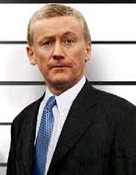
On Feb. 1, 2012 Queen Elizabeth II revokes the knighthood of former Royal Bank of Scotland CEO Frederick Anderson "Fred" Goodwin (1958-) for the bank's near collapse in 2008.
In Apr.-May, 2012 JPMorgan Chase loses $2B ($6.2B?) betting on credit default swaps tied to corporate debt, paying illegal bribes to get the business then lying about the losses.
On Mar. 18, 2013 Cyprus announces that it's going to confiscate 9.9% of all bank accounts; on Mar. 13 Dutch finance minister Jeroen Bijsselbloem announces that this scheme will be the template for future Euro bank bailouts, causing a furor that makes him retract it; on June 26 the EU announces that its 27 finance ministers have agreed on a plan shifting the responsibility for bank losses from govts. to bank investors, creditors, and uninsured depositors.
On Jan. 23, 2014 U.S. atty. Eric Holder announces that U.S. Treasury and law enforcement agencies will soon issue regs opening banking services to state-sanctioned marijuana businesses even though cannabis remains classified as an illegal narcotic under federal law. On May 19, 2014 Credit Suisse pleads guilty to a tax evasion scheme that "spanned decades", and agrees to pay $2.6B in fines and hire an independent monitor for two years, becoming the first guilt to plead guilty to criminal wrongdoing in over 20 years.
On May 20, 2015 five major banks incl. Citicorp, JPMorgan Chase, Barclays, Royal Bank of Scotland, and UBS AG plead guilty to felony charges of manipulating the U.S. currency market in a "brazen display of collusion" (U.S. Atty. Gen. Loretta Lynch), agreeing to pay $2.5B in fines. On Aug. 21, 2015 (Black Fri.) after China devalues its currency by 3%, the Dow Jones Industrial Avg. plunges by 500 points (3.12%), becoming the largest 1-day loss in four years; the slide going back over 2 mo. has wiped out the gains of the last 12 mo, while over the past five years it remains strongly up.
On Sept. 8, 2016 the Wells Fargo Scandal breaks, revealing that employees were goaded into opening up to 2M accounts without customers' knowledge, causing Wells Fargo to agree to pay $185M to regulators, and CEO (since Jan. 2010) John Gerard Stumpf (1953-) to quit in Oct.
In 2016 Chinese banks incl. ICBC, China Construction Bank, Agricultural Bank of China, and Bank of Communications rise to account for 50% of the top banks in the world.
On May 31, 2018 Pres. Trump signs a law rolling back some of the regs of the 2010 Dodd-Frank Law, allowing community banks to go back in biz.
On Sept. 19, 2018 attys. for Danske Bank announce that 200B euros was illegally laundered through its Estonian branch over a 9-year period.